Essays from the Far East Film Festival
by Darcy Paquet
The Far East Film Festival in Udine, Italy held its first edition in 1998 with a special focus on popular films from Hong Kong. Since then, the event has grown in size and expanded to encompass works from across East and Southeast Asia. The festival specializes in popular films that are often not shown by other festivals, in the hopes of providing a snapshot of how cinema fits within overall trends in Asian popular culture. The FEFF also hosts many retrospectives: examples include the Asian musical, director Patrick Tam, Nikkatsu action films from Japan, and Korean films of the 1970s. More information about the festival can be found at http://www.fareastfilm.com.
I've been working for the FEFF, and contributing essays to their catalogue, since 2002. The following essays are reprinted with permission from the organizers. The main essay for each year covers general commercial and artistic trends within the previous 12 months (the catalogue is printed during the festival in late April, so I usually write them in February or March). Note that I mostly, but not exclusively, focus my comments on the Korean films screened in Udine each year. I hope that through these essays, readers can get a general sense of what issues had people talking in each given year.
Still Waiting for Good News: Korean Cinema in 2021
Another year has passed for the Korean film industry, and it finds itself in much the same state that it was in spring 2021. South Korea has weathered the pandemic better than most countries, all things considered, but moviegoing is a habit that many citizens have been content to give up in difficult times. As recently as 2019, South Korea had the highest rate of theatrical attendance in the world, with an average 4.37 films seen per capita. In 2021, by contrast, per capita attendance fell to 1.17. What it will take to re-instill that habit in the broader public is the primary question facing the Korean film industry today.
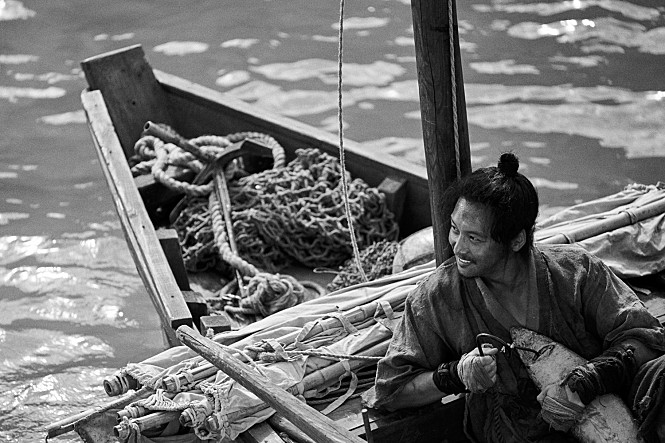 Let's rewind for a moment to May of 2021. Korean film studios and exhibitors were facing a dilemma. It was highly uncertain at that time if there would be any sort of summer box office season, or if theaters would continue to remain empty through the traditionally peak months of July and August. The spring had offered little in the way of encouragement, with high profile features The Book of Fish (pictured right) and Seobok both performing far below expectations. But the imminent return of Hollywood blockbusters to the theater after a year-long absence brought at least some hope for a partial revival. No one expected a return to 2019 levels, of course, but the question was, would it make economic sense to release any of the numerous big-budget Korean films that had been stuck in limbo since early 2020?
Let's rewind for a moment to May of 2021. Korean film studios and exhibitors were facing a dilemma. It was highly uncertain at that time if there would be any sort of summer box office season, or if theaters would continue to remain empty through the traditionally peak months of July and August. The spring had offered little in the way of encouragement, with high profile features The Book of Fish (pictured right) and Seobok both performing far below expectations. But the imminent return of Hollywood blockbusters to the theater after a year-long absence brought at least some hope for a partial revival. No one expected a return to 2019 levels, of course, but the question was, would it make economic sense to release any of the numerous big-budget Korean films that had been stuck in limbo since early 2020?
It was a bit of a chicken-and-egg problem. The only thing likely to pull casual viewers of all ages to the theater was the marketing hype, media attention and word-of-mouth excitement that a big-budget local film could provide. So exhibitors were hoping that Korean distributors would schedule their blockbusters for the summer. But from the distributors' point of view, it was tremendously risky to release such expensive movies in such uncertain times. Only millions of ticket sales would ensure a chance of turning a profit, so they preferred to wait until more positive signs emerged at the box-office.
Initially, attention turned to the Hollywood films opening in late spring. The first of these, Fast & Furious 9, sold 2.3 million tickets in late May. Disney's Cruella, released in the same month, sold 1.2 million tickets. Such numbers were not bad, but neither were they particularly encouraging. One by one, distributors who had considered releasing big-budget films in the summer announced they would delay further.
It was at this point that exhibitors, desperate to avoid a lost summer, decided to make a deal. In normal times, theaters will keep roughly half of the revenue earned from ticket sales, with the other half going to the film company. But for the summer of 2022, they agreed that Korean film companies could keep 100% of the revenues from ticket sales until they had recovered the cost of making the film. After that point, revenues would be divided as usual.
 This temporary deal briefly transformed the economics of film releases. Although some of the major distributors declined to join in, three Korean blockbusters ultimately went ahead and opened in the summer. The first of these was director Ryoo Seung-wan's Escape from Mogadishu. Shot in Morocco, and having wrapped production just weeks before the start of the pandemic, Escape from Mogadishu is based on a true story of a group of North and South Korean diplomats trapped in the civil war which broke out in Somalia at the end of 1991. Featuring a talented ensemble cast, a highly dramatic story and some jaw-dropping spectacle, this was a film that in ordinary times would be a sure bet to sell 10 million tickets. Upon its release in late July, reviews and word-of-mouth were both strong, nonetheless an unfortunately-timed surge in case numbers with the arrival of the Delta variant had a dampening effect on its performance. With its large production budget, Escape from Mogadishu would ordinarily have to sell over 6 million tickets to cover its costs, but under the new deal with the theater chains, the break-even point was 3.4 million tickets. Ultimately, an extended but steady run in theaters left the film with 3.6 million tickets sold -- enough for a slight profit, and to overtake Black Widow as the top-grossing film of the summer.
This temporary deal briefly transformed the economics of film releases. Although some of the major distributors declined to join in, three Korean blockbusters ultimately went ahead and opened in the summer. The first of these was director Ryoo Seung-wan's Escape from Mogadishu. Shot in Morocco, and having wrapped production just weeks before the start of the pandemic, Escape from Mogadishu is based on a true story of a group of North and South Korean diplomats trapped in the civil war which broke out in Somalia at the end of 1991. Featuring a talented ensemble cast, a highly dramatic story and some jaw-dropping spectacle, this was a film that in ordinary times would be a sure bet to sell 10 million tickets. Upon its release in late July, reviews and word-of-mouth were both strong, nonetheless an unfortunately-timed surge in case numbers with the arrival of the Delta variant had a dampening effect on its performance. With its large production budget, Escape from Mogadishu would ordinarily have to sell over 6 million tickets to cover its costs, but under the new deal with the theater chains, the break-even point was 3.4 million tickets. Ultimately, an extended but steady run in theaters left the film with 3.6 million tickets sold -- enough for a slight profit, and to overtake Black Widow as the top-grossing film of the summer.
Disaster movie Sinkhole, about a family who is trapped when a giant sinkhole swallows up their apartment building, came in second among Korean releases with 2.2 million admissions. Offering up a familiar blend of comedy and CGI-heavy effects, the film was less warmly embraced by critics but still found a decent-sized audience.
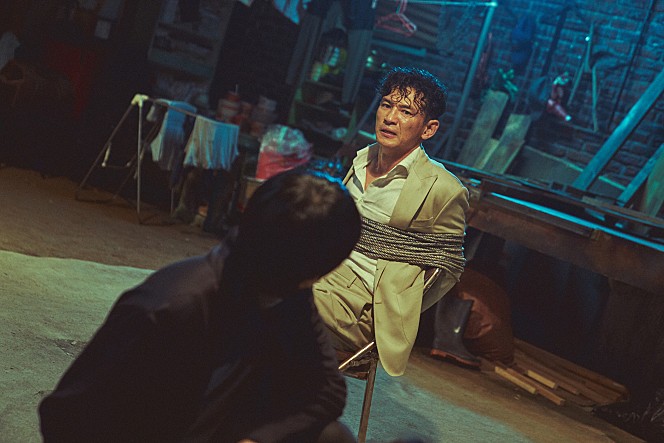 The third major release of the summer relied more on concept and execution, rather than special effects or a blockbuster-scale budget. Hostage: Missing Celebrity by debut writer-director Pil Gam-seong features top star Hwang Jeong-min playing himself, in a fictional story about the actor being kidnapped and held for ransom. In keeping with the concept, the director decided to cast largely unknown actors in the other roles to heighten the film's sense of reality. Tense and dramatic, the film was well-received after its mid-August release, and sold a total of 1.6 million tickets.
The third major release of the summer relied more on concept and execution, rather than special effects or a blockbuster-scale budget. Hostage: Missing Celebrity by debut writer-director Pil Gam-seong features top star Hwang Jeong-min playing himself, in a fictional story about the actor being kidnapped and held for ransom. In keeping with the concept, the director decided to cast largely unknown actors in the other roles to heighten the film's sense of reality. Tense and dramatic, the film was well-received after its mid-August release, and sold a total of 1.6 million tickets.
The combination of some innovative dealmaking, and a willingness to take risks by the film companies involved (particularly production company Filmmakers R&K, which produced both Escape from Mogadishu and Hostage: Missing Celebrity), resulted in a partial win for Korean cinema in the summer of 2021. Surely, if there had been no summer box office season, the psychological and financial hit to the industry would have been more severe. And in the end, these three releases would rank as the best-selling Korean films not only in the summer, but for the year as a whole.
The fall season was marked by continued struggles with COVID and some moderate successes at the box office. The Chuseok holiday in September, another traditionally strong period for Korean films, saw two major releases: thriller On the Line from CJ Entertainment, and the rural-set drama Miracle: Letters to the President from Lotte Entertainment. The latter film, based on a true story, earned less at the box office but is the more memorable of the two, with its assured acting performances and touching story about family, talent and ambition. Director Lee Jang-hoon, whose debut feature Be With You (a Far East Film Festival 20 selection) was a solid hit in 2018, is marking himself as an important new voice in the genre of family melodrama.
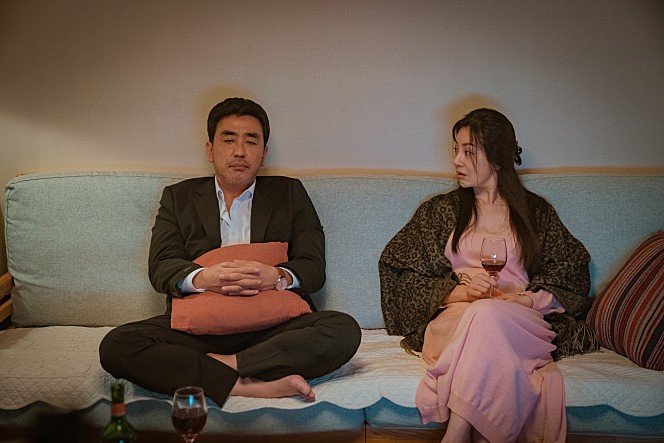 Later in the fall, a pleasant surprise emerged with the release of Perhaps Love, the feature directorial debut of well-known actress Cho Eun-ji (The Villainess). A bold comedy about a famous but troubled novelist (Ryu Seung-ryong) and his tangled personal life, the film features an unforgettable cast of characters and some of the funniest moments provided by Korean cinema in 2021. Despite the challenges it faced at the box office, Perhaps Love amassed 500,000 admissions and marked out its director as a key talent to watch.
Later in the fall, a pleasant surprise emerged with the release of Perhaps Love, the feature directorial debut of well-known actress Cho Eun-ji (The Villainess). A bold comedy about a famous but troubled novelist (Ryu Seung-ryong) and his tangled personal life, the film features an unforgettable cast of characters and some of the funniest moments provided by Korean cinema in 2021. Despite the challenges it faced at the box office, Perhaps Love amassed 500,000 admissions and marked out its director as a key talent to watch.
The autumn may have been a grim time overall for Korean cinema, but that doesn't mean people weren't talking about Korean content. The release of Netflix series Squid Game in September and its astounding worldwide success had all of Korea buzzing. Much of the talent behind Squid Game were longstanding contributors to Korean cinema, from director Hwang Dong-hyuk -- whose previous works Miss Granny and Silenced (an FEFF Audience Award winner) will be familiar to audiences in Udine -- to leading actor Lee Jung-jae and his nearly three decades of experience in Korean film. Seeing this team succeed to such a degree on Netflix's platform was both encouraging and exciting, but also bittersweet for people in the film industry. With movie theaters hobbled by the pandemic, and Netflix investing $500 million per year in Korean content, the large-scale migration of talent to OTT platforms was hard to witness without a certain degree of alarm. For the comparatively few Korean feature films entering production in 2021, competition to secure the services not only of actors but also directors and all manner of production crew made the situation even more difficult.
As winter came, Korea experienced an unprecedented surge in COVID cases, despite vaccination rates of more than 90% among adults. Big-budget tentpoles that had decided to sit out the summer saw even less reason to take a chance on the winter box office season. Ironically, however, in the midst of the COVID surge Spider-Man: No Way Home opened and powered its way to 7.6 million admissions -- easily the best performance of the pandemic period. This was a much-needed boost to theater chains, and provided some reassurance that moviegoing was not yet dead. Nonetheless it played out largely as a one-off success, not leading to any broader recovery in box office admissions. The single blockbuster-scale Korean release of the winter, Lotte Entertainment's The Pirates: The Last Royal Treasure, topped out at 1.3 million admissions, not near enough to cover its massive budget.
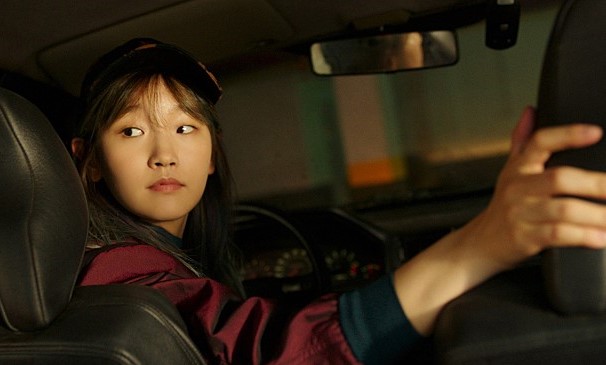 Nonetheless, a few mid-sized Korean films opened in January and drew some attention. Special Delivery (pictured right) is an action film in which Park So-dam ('Jessica' from Bong Joon Ho's Parasite) plays an expert driver on the run from a corrupt detective. Filled with energy and personality, the film earned yet more praise for the talented Park in her first action role. Then a few weeks later, a much heavier drama burst onto the scene. Kingmaker is a thinly-veiled depiction of the events leading up to Korea's 1971 presidential election, in which the authoritarian president Park Chung Hee was nearly unseated by the upstart (and future president) Kim Dae Jung. A political drama with much to say about the tension between power and ideals, the release was even more relevant given that Korea was in the midst of a contemporary presidential campaign.
Nonetheless, a few mid-sized Korean films opened in January and drew some attention. Special Delivery (pictured right) is an action film in which Park So-dam ('Jessica' from Bong Joon Ho's Parasite) plays an expert driver on the run from a corrupt detective. Filled with energy and personality, the film earned yet more praise for the talented Park in her first action role. Then a few weeks later, a much heavier drama burst onto the scene. Kingmaker is a thinly-veiled depiction of the events leading up to Korea's 1971 presidential election, in which the authoritarian president Park Chung Hee was nearly unseated by the upstart (and future president) Kim Dae Jung. A political drama with much to say about the tension between power and ideals, the release was even more relevant given that Korea was in the midst of a contemporary presidential campaign.
With February and March showing no further signs of a breakthrough, the film industry once again finds itself gazing into the near future, not knowing whether the industry will finally turn a corner in the coming months, or whether the downturn will persist. The Omicron wave in Korea has been so many times bigger than anything that has preceded it, that one expects when it does finally recede, citizens will feel more at ease out in public. A cautious optimism for the upcoming summer season seems to be taking hold among local distributors. Film festivals, at least, are returning in force; after a partial revival of the Busan International Film Festival in October (in-person screenings at 50% capacity, though with no parties and few international guests), the Jeonju International Film Festival in May is planning for a return to its former scale.
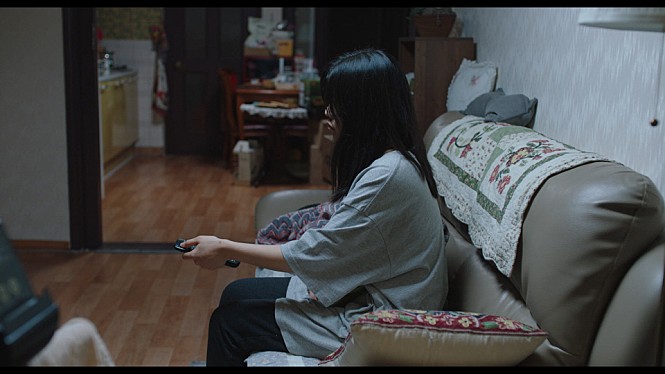 Meanwhile, the crisis brought on by the pandemic has given members of the Korean film industry much time to think about the present and future of Korean cinema. One issue that continues to receive much attention is the need for further diversity in Korean cinema. Independent films have felt as vital as ever during the pandemic, with new voices emerging every year. 2021 saw quite a few independent films attract attention, including the major prizewinner The Apartment With Two Women by debut director Kim Se-in. A startlingly intense family drama about a single mother and her 20-year old daughter, the film screened at Busan and Berlin, and is just getting started on what is sure to be a long festival career. This year's FEFF will highlight several exciting independent works, from the genre-inflected Thunderbird produced by the Korean Academy of Film Arts, to acclaimed documentaries Fanatic and Kim Jong-boon of Wangshimni.
Meanwhile, the crisis brought on by the pandemic has given members of the Korean film industry much time to think about the present and future of Korean cinema. One issue that continues to receive much attention is the need for further diversity in Korean cinema. Independent films have felt as vital as ever during the pandemic, with new voices emerging every year. 2021 saw quite a few independent films attract attention, including the major prizewinner The Apartment With Two Women by debut director Kim Se-in. A startlingly intense family drama about a single mother and her 20-year old daughter, the film screened at Busan and Berlin, and is just getting started on what is sure to be a long festival career. This year's FEFF will highlight several exciting independent works, from the genre-inflected Thunderbird produced by the Korean Academy of Film Arts, to acclaimed documentaries Fanatic and Kim Jong-boon of Wangshimni.
Nonetheless, the election of conservative candidate Yoon Suk-yeol in March to a 5-year term as president is seen as an ominous sign for independent filmmakers. The previous administration had boosted its financial support to independent cinema, providing a much-needed lifeline in difficult times. But if Yoon follows the example of previous conservative presidents, such support may well dry up in the coming years.
One also senses changes taking place within the realm of genre cinema. Up until now, Korean audiences have never fully embraced low-budget genre films, in contrast to many markets in Europe. The thrillers for which Korean cinema is famous have been produced mostly as mainstream commercial features with sizable budgets. And yet the genre films being produced in Korea these days are showing much broader range in terms of scale and budget. Widening distribution options on OTT and other platforms, as well as expanding opportunities for international distribution, has meant that mid-range and lower-budget action films, thrillers and horror movies enjoy more of a second life after their theatrical runs.
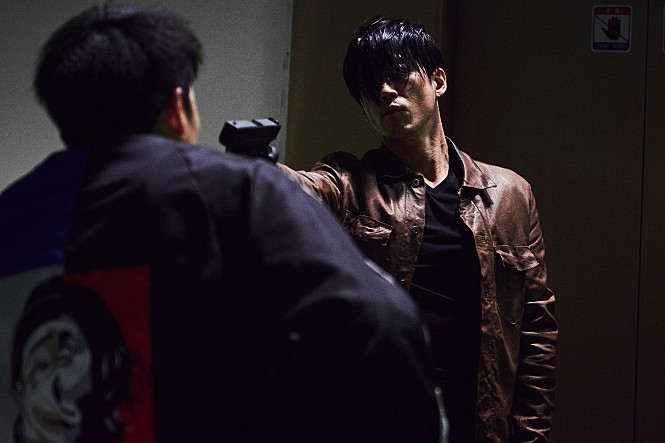 This year's FEFF features several notable action films in its program. Tomb of the River adopts the seaside city of Gangneung as the setting for a classic tale of betrayal and gang warfare. The film features veteran actor Yoo Oh-sung (Friend) and Jang Hyuk as two gangsters of opposite temperament destined to collide. Jang Hyuk also takes the lead role in The Killer, (pictured right) continuing his late career reinvention as a formidable action star. The film, which receives its world premiere in Udine, has already secured distribution deals to 23 international territories.
This year's FEFF features several notable action films in its program. Tomb of the River adopts the seaside city of Gangneung as the setting for a classic tale of betrayal and gang warfare. The film features veteran actor Yoo Oh-sung (Friend) and Jang Hyuk as two gangsters of opposite temperament destined to collide. Jang Hyuk also takes the lead role in The Killer, (pictured right) continuing his late career reinvention as a formidable action star. The film, which receives its world premiere in Udine, has already secured distribution deals to 23 international territories.
There's no question that Korean cinema finds itself at an interesting crossroads in its development. Worldwide interest in Korean content only seems to be getting stronger, but the pandemic has temporarily pushed the film industry aside, as acclaimed series on Netflix and other platforms gather international attention. Clearly, the Korean film industry still has the talent and know-how to be successful. But can it survive shifting market forces and the lingering effects of the pandemic to regain its former glory? One suspects that 2022 may provide an answer to this question -- but it's not yet clear what the answer will be.
Stalled: Korean Cinema in 2020
Following the Korean film industry over the past 12 months has been a bit like watching a sports car stalled at the side of the road. With great effort and a bit of ingenuity, the driver just manages to start the engine... but after creeping forward a short distance, the engine kicks out again. You know that this is a vehicle that can travel at impressive speeds, but for the time being, it is stuck.
A year ago, as spring ended and the (in usual times) peak summer box office season approached, the audience seemed to be on the fence. South Korea's first major COVID-19 outbreak had taken place in February, and it was clear that the pandemic was not going away anytime soon. But authorities had brought it under control with an effective test-and-trace strategy, keeping the average number of new cases to about 50 per day.
Movie theaters were seen by the general public as a particularly dangerous place to be spending time during a pandemic, but the film industry was trying to change the narrative. In reality, universal mask use and the high ventilation standards in place for movie theaters meant that theatrical screenings were quite safe. Even a year later, not a single person in Korea has been confirmed to have caught COVID-19 at a movie theater. But it was clear that audiences would only consider returning to the theater en masse if the disease were beaten back more generally in society.
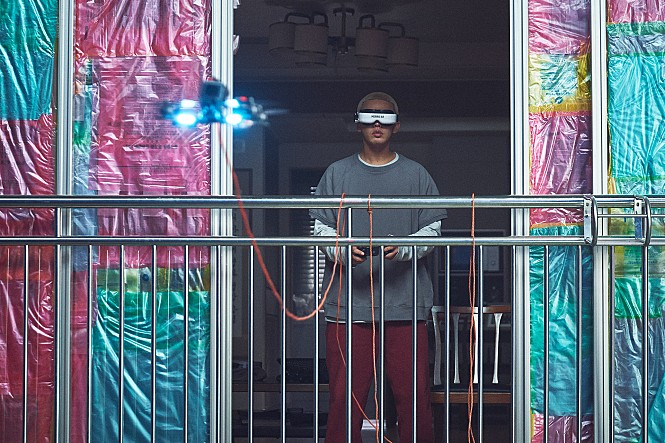 There was also the lack of high-profile content in theaters. Hollywood releases dried up almost completely, as in the rest of the world. Korean distributors too pulled all their major releases in the first part of the year, but by June they were debating whether to test the waters. Innocence, a mid-budgeted, highly melodramatic legal thriller released on June 10, exceeded expectations by amassing close to 900,000 admissions (about US$7 million). The zombie thriller #Alive (pictured left), which would go on later to find an international audience through Netflix, sold 1.9 million tickets (close to $15 million) after its June 24 release in theaters.
There was also the lack of high-profile content in theaters. Hollywood releases dried up almost completely, as in the rest of the world. Korean distributors too pulled all their major releases in the first part of the year, but by June they were debating whether to test the waters. Innocence, a mid-budgeted, highly melodramatic legal thriller released on June 10, exceeded expectations by amassing close to 900,000 admissions (about US$7 million). The zombie thriller #Alive (pictured left), which would go on later to find an international audience through Netflix, sold 1.9 million tickets (close to $15 million) after its June 24 release in theaters.
Such numbers convinced local distributors to gamble on the summer season. Although not all the planned releases went through, distributor N.E.W. decided to go ahead and slot in Peninsula, one of the year's most anticipated films, for a July 15 release. A big-budget sequel of sorts to the 2016 runaway hit Train to Busan, Peninsula centers around a Korean soldier in Hong Kong who takes up a gangster's offer to infiltrate the zombie-infested Korean peninsula to liberate a truckful of cash. In the end, despite lukewarm reviews, the film performed well, grossing 3.8 million admissions (adding up to roughly US$30 million) in Korea, and also topping the box office in other parts of Asia that had contained the virus well. It seemed like a proper summer season was taking shape.
Steel Rain 2, a political thriller that is a sequel in name only to the original Steel Rain (2017) - it imagines a wholly different doomsday scenario, involving the leaders of South Korea, North Korea and the US all taken hostage on a nuclear submarine - opened on July 29 and had middling success. Its 1.8 million admissions is less than half that of the original film, but still good enough for revenues of about $13 million.
 Unexpectedly, the winner of the summer box office season turned out to be not Peninsula, but Deliver Us from Evil, an action thriller set mostly in Thailand. The film stars Hwang Jung-min as a veteran assassin who rushes to Bangkok to save his kidnapped daughter. With impressively staged action sequences, striking cinematography by Parasite DoP Hong Kyeong-pyo, and several memorable performances including Lee Jung-jae as the stylish and menacing villain Ray, Deliver Us from Evil topped 2 million admissions after only 5 days on release. On its 18th day on release it reached 4 million admissions (US$32 million), but by then events had already turned for the worse.
Unexpectedly, the winner of the summer box office season turned out to be not Peninsula, but Deliver Us from Evil, an action thriller set mostly in Thailand. The film stars Hwang Jung-min as a veteran assassin who rushes to Bangkok to save his kidnapped daughter. With impressively staged action sequences, striking cinematography by Parasite DoP Hong Kyeong-pyo, and several memorable performances including Lee Jung-jae as the stylish and menacing villain Ray, Deliver Us from Evil topped 2 million admissions after only 5 days on release. On its 18th day on release it reached 4 million admissions (US$32 million), but by then events had already turned for the worse.
It was an extensive cluster infection at a conservative church, combined with a massive anti-government rally organized in part by the leader of that church, that led to a sharp rise in cases not only in Seoul, but in the rest of the country as well. Although not on the scale of outbreaks in other countries (the August wave peaked at 441 positive tests on a single day), it had a huge effect on the nation's psyche. Attendance at theaters plunged.
One film that suffered from particularly unfortunate timing was the action comedy OK! Madam, starring Uhm Jung-hwa. The story of a family who wins a trip to Hawaii but then has their plane hijacked by North Korean terrorists, OK! Madam opened on August 12, hoping to take advantage of the three-day weekend from August 15-17 that was predicted to bring box office gold. Instead, cases began to spike on August 14, dominating the news cycle and resulting in many canceled ticket reservations. The film ended up selling a total 1.2 million tickets.
 Case counts stabilized somewhat in September and October, but the damage had been done. For much of the mainstream audience, moviegoing shifted into the mental category labeled "things to do after the pandemic is over." During the Chuseok holiday at the end of September, traditionally a boom time at the box office, case counts were actually quite low, but theaters remained deserted. Distributors that had hoped for a rebound ended up suffering the consequences. Cult director Shin Jung-won's eccentric Night of the Undead, despite being a thoroughly enjoyable and hilarious film, bombed at the box office with just over 100,000 admissions. Two weeks later, the critically acclaimed debut film Voice of Silence (pictured left) featuring the very popular Yoo Ah-in only managed to secure 400,000 admissions.
Case counts stabilized somewhat in September and October, but the damage had been done. For much of the mainstream audience, moviegoing shifted into the mental category labeled "things to do after the pandemic is over." During the Chuseok holiday at the end of September, traditionally a boom time at the box office, case counts were actually quite low, but theaters remained deserted. Distributors that had hoped for a rebound ended up suffering the consequences. Cult director Shin Jung-won's eccentric Night of the Undead, despite being a thoroughly enjoyable and hilarious film, bombed at the box office with just over 100,000 admissions. Two weeks later, the critically acclaimed debut film Voice of Silence (pictured left) featuring the very popular Yoo Ah-in only managed to secure 400,000 admissions.
Any hopes that the winter holiday season might give the film industry a bit of a rebound were crushed by a COVID third wave that was worse than anything before or since. Ironically, the peak number of new cases (1,241 in one day) came on Christmas, a holiday that in normal times could be expected to be a box office bonanza. But by then, all the major blockbusters that had considered a release, including CJ Entertainment's Seobok, had been postponed to a later date.
Early 2021 offered little in the way of respite, except for two foreign animated releases that enjoyed sustained long-term success. Pixar's Soul, released on January 20, earned glowing reviews and amassed a total of 2 million admissions. Even more successful was Demon Slayer: Mugen Train from Japan, which opened a week later and slow-burned its way to a total of 2.1 million admissions. But the Korean films which opened in theaters - mostly lower profile genre films and independent releases - failed to generate much of an audience.
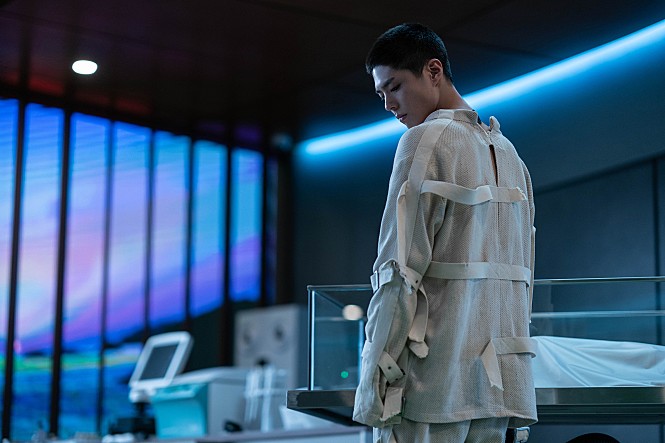 Ultimately, only one big-budget local movie went through with a release in spring 2021. Seobok - a futuristic action film about the world's first human clone who develops special powers, but escapes from his research team - boasted considerable star power in its male leads Gong Yoo and Park Bo-gum, as well as ambitious special effects. It was released on April 15, which is not usually a strong season for moviegoing, but CJ hedged its bets by opening it simultaneously on its own OTT platform TVing. It's not clear how many viewers tuned in to watch Seobok at home, but in theaters at least, the returns were low with 385,000 ticket sales.
Ultimately, only one big-budget local movie went through with a release in spring 2021. Seobok - a futuristic action film about the world's first human clone who develops special powers, but escapes from his research team - boasted considerable star power in its male leads Gong Yoo and Park Bo-gum, as well as ambitious special effects. It was released on April 15, which is not usually a strong season for moviegoing, but CJ hedged its bets by opening it simultaneously on its own OTT platform TVing. It's not clear how many viewers tuned in to watch Seobok at home, but in theaters at least, the returns were low with 385,000 ticket sales.
Ultimately, not a single Korean release from the first five months of 2021 managed to sell as much as 500,000 tickets. Given that as recently as 2019, a Korean film (Extreme Job) had sold upwards of 16 million tickets, this was quite a shock to the industry.
At the writing of this essay, the local film industry is looking ahead to the 2021 summer season with many of the same feelings and concerns as they had in the previous year. There are some positive signs. South Korea's vaccination drive started later than in many other countries, but when large shipments of vaccines finally began to arrive in May and June, it progressed quickly, with little anti-vaccine sentiment among the populace. Late spring also ushered in the return of high-profile Hollywood releases. Whereas in previous years, local distributors often viewed Hollywood as a competitor, in 2021 they hope that Hollywood can help coax local viewers to re-start their moviegoing habits. Early returns were decent: Fast & Furious 9 passed the 2 million admissions mark to become the highest grossing film of the year to date.
But the question of whether summer 2021 will be a time of recovery for the Korean box office, or yet another disappointment, is still up in the air. The local film industry, which has been pushed to its limits during the pandemic, and which has a large backlog of films waiting for release, has much riding on the outcome.
Between Two Earthquakes: Korean Cinema in 2019
In the year since the previous Far East Film Festival was held in April 2019, two earthquakes have shaken the South Korean film industry. The first was Bong Joon Ho's Parasite, which on multiple levels ranks as the most successful Korean film in history. Its storybook trajectory, which began with a Palme d'Or in May 2019 and ended with its Best Picture win at the Oscars in February 2020, was so unprecedented that the industry was pushed to rethink some of its most basic assumptions about what Korean films can achieve in the global market. With an estimated $257 million worldwide box-office total, including $53 million in U.S. theaters, it is not only the most acclaimed and awarded Korean film of all time, but also the highest grossing.
 The second earthquake, of course, was the COVID-19 pandemic, which hit South Korea's film industry just as hard as it did everywhere else. The fact that the country had previously had such a vibrant theatrical market - with Koreans watching more films in theaters per capita than in any other country in the world - meant that the whiplash from postponed releases and closed theaters was especially severe. At this point the long-term impact of the pandemic is still impossible to calculate, but it seems likely that the economics of filmmaking in Korea are going to change in fundamental ways.
The second earthquake, of course, was the COVID-19 pandemic, which hit South Korea's film industry just as hard as it did everywhere else. The fact that the country had previously had such a vibrant theatrical market - with Koreans watching more films in theaters per capita than in any other country in the world - meant that the whiplash from postponed releases and closed theaters was especially severe. At this point the long-term impact of the pandemic is still impossible to calculate, but it seems likely that the economics of filmmaking in Korea are going to change in fundamental ways.
In future times when people look back on the years 2019-2020, memories will be dominated by these two seismic events. But there are other films that emerged in the past 12 months that are in themselves still worth seeking out and remembering. This year's online edition of the Far East Film Festival will serve as an opportunity to highlight some of those works.
Let's start by going back to the summer of 2019. The year to date had produced two huge hits of over 10 million admissions (comedy Extreme Job, released in January and invited to the 21st FEFF in April, and Parasite), but no other commercial standouts. As usual, Korea's major distributors had lined up several ambitious releases for the peak summer season, but given the weak performance of big-budget films in the previous year, their success was far from certain. Sure enough, of the four major releases, two were major commercial disappointments, one just barely broke even and one was a strong success. The disappointments included The King's Letters, a period drama about Korea's most famous monarch King Sejong, which was hammered by an SNS-fueled controversy over the supposed liberties the film took with the historical record; and director Kim Joo-hwan (Midnight Runners)'s big-budget exorcist thriller The Divine Fury, which failed to generate positive word-of-mouth despite the casting of popular star Park Seo-joon. Nationalist-tinged The Great Battle: Roar to Victory, about Korean independence fighters' successful ambush of Japanese colonial forces in June 1920, fared somewhat better with 4.7 million admissions. But it was the disaster movie Exit that ultimately prevailed, with 9.4 million admissions.
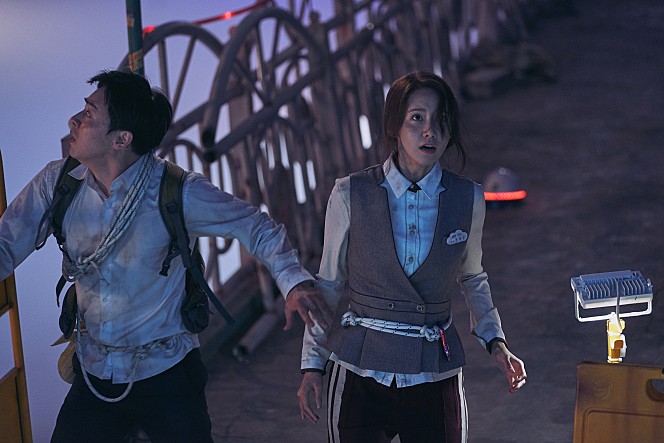 Exit, by debut director Lee Sang-geun, imagines a terrorist incident in which poison gas spreads across downtown Daegu, forcing citizens to flee to the top of buildings for safety. The film's effective mixture of likable characters, humor and suspenseful climbing sequences provided the kind of breezy fun many viewers were looking for in the summer months. Produced by Ryoo Seung-wan and his wife Kang Hye-jeong, the film succeeded not with the familiar formula of top-level star power and expensive special effects (one of the benefits of having poison gas as the main antagonist is that it's fairly simple to render visually), but with good storytelling and well-shot suspense.
Exit, by debut director Lee Sang-geun, imagines a terrorist incident in which poison gas spreads across downtown Daegu, forcing citizens to flee to the top of buildings for safety. The film's effective mixture of likable characters, humor and suspenseful climbing sequences provided the kind of breezy fun many viewers were looking for in the summer months. Produced by Ryoo Seung-wan and his wife Kang Hye-jeong, the film succeeded not with the familiar formula of top-level star power and expensive special effects (one of the benefits of having poison gas as the main antagonist is that it's fairly simple to render visually), but with good storytelling and well-shot suspense.
As is often the case, the fall season provided an opening for a mixture of lower-budget genre films and dramas that touch on various aspects of contemporary Korean society. One noteworthy release that outperformed expectations was the hard-edged romantic comedy Crazy Romance, by debut director Kim Han-kyul. Starring Kim Rae-won (The Prison) and the always-delightful Gong Hyo-jin (Door Lock), the film centers around two coworkers, each with a bit of a drinking problem, who enter into a sometimes-friendship, sometimes-flirtation that is never really sure where it is going. Director Kim's sardonic take on Korea's work and social scene, and her refusal to idealize romance, make for a wholly unique film that is difficult to characterize.
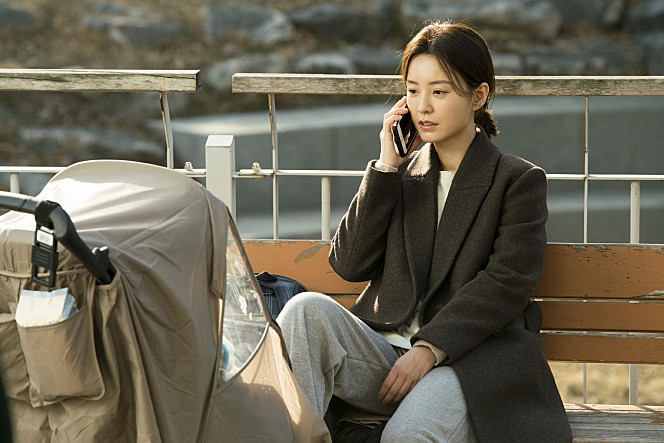 The most discussed release of the fall was the story of an ordinary housewife, Kim Ji-young, Born 1982. The film is based on a 2016 novel by Cho Nam-joo that was a bestseller not only in South Korea, but also in Japan and China (it was subsequently released in English translation in early 2020). The ordinariness of the protagonist is part of the author's point - she chose the name Kim Ji-young because it is the most common female name of her generation, and the characterization is left deliberately abstract. In this way her struggles to get by in a male-dominated society take on a wider resonance. Though not an easy novel to adapt into a film, director Kim Do-young's casting of Jung Yoo-mi in the lead role was inspired, and its release sparked a nationwide discussion about (or in some quarters, an angry backlash against) feminism in contemporary Korea. The film ended up with a solid 3.7 million admissions.
The most discussed release of the fall was the story of an ordinary housewife, Kim Ji-young, Born 1982. The film is based on a 2016 novel by Cho Nam-joo that was a bestseller not only in South Korea, but also in Japan and China (it was subsequently released in English translation in early 2020). The ordinariness of the protagonist is part of the author's point - she chose the name Kim Ji-young because it is the most common female name of her generation, and the characterization is left deliberately abstract. In this way her struggles to get by in a male-dominated society take on a wider resonance. Though not an easy novel to adapt into a film, director Kim Do-young's casting of Jung Yoo-mi in the lead role was inspired, and its release sparked a nationwide discussion about (or in some quarters, an angry backlash against) feminism in contemporary Korea. The film ended up with a solid 3.7 million admissions.
The second half of 2019 was also a comparatively fertile period for Korean independent films. Whereas in recent times it has been mostly politically-oriented documentaries that captured mainstream attention among the 100+ independent films released in theaters each year, in 2019 it was female-centered dramas that received the spotlight. Coming-of-age story House of Hummingbird, set in Seoul in 1994, was far and away the most acclaimed, selling over 130,000 tickets and winning upwards of 50 awards from festivals and awards ceremonies in Korea and abroad. But there were other success stories as well. Director Yoon Ga-eun's The House of Us, a heartfelt companion piece to her acclaimed 2017 feature The World of Us, focuses on a middle-school student trying to save her parents' marriage, and two younger girls she meets who are trying to save their home. Moonlit Winter, the second feature by Director Lim Dae-hyung (Merry Christmas Mr. Mo), takes place mostly in Japan and depicts a long-lost romance between two women. Strong word-of-mouth led the film to over 100,000 admissions. Even the coolly experimental Maggie, which premiered at the 2018 Busan International Film Festival and which departs from many storytelling conventions, managed to attract 40,000 admissions, a strong score for an independent release. It does seem that within the realm of independent cinema, one film's success often paves the way for increased audience interest in subsequent releases as well.
Moving towards the lucrative winter vacation season, the big studios lined up three major releases for mid-late December. Forbidden Dream by veteran director Hur Jin-ho (The Last Princess) also centered around the famous King Sejong, this time on his friendship with noted inventor Jang Young-sil. The chemistry between actors Han Suk-kyu and Choi Min-sik drew the praise of critics but only a modest gross of about 1 million admissions. Comedy Start-Up, based on a famous webtoon and featuring prolific star Ma Dong-seok, fared somewhat better with a gross of 3.3 million. Like Exit, this film too came from Kang Hye-jeong and Ryoo Seung-wan's production house Filmmakers R&K.
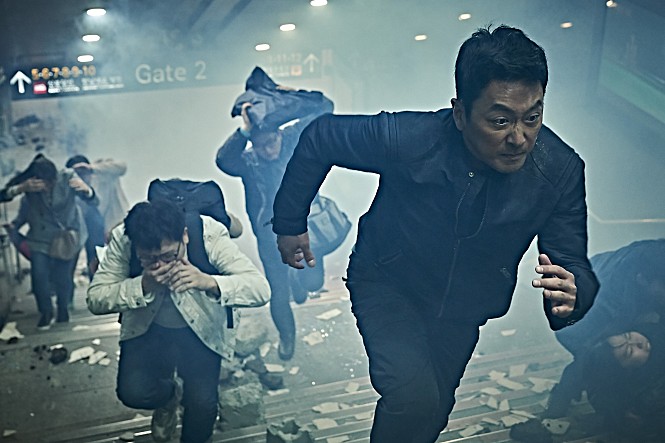 But in terms of scale, budget and ultimate commercial success, the behemoth of the winter was the disaster movie Ashfall. Featuring top stars Lee Byung-hun, Ha Jung-woo, Ma Dong-seok, Han Hye-jin and K-pop singer-turned-actress Bae Suzy, the film posits a multiple-stage violent eruption of the volcano Mt. Baekdu which lies on the border between North Korea and China. With all the peninsula threatened with catastrophe, and the North Korean leadership all wiped out in an earthquake, it falls into the hands of a South Korean special forces operative and a North Korean spy to prevent total devastation. Guided by the principle "more is more", the film's ceaseless escalation of spectacle, destruction and sensational plot twists set it on another level from ordinary Korean blockbusters.
But in terms of scale, budget and ultimate commercial success, the behemoth of the winter was the disaster movie Ashfall. Featuring top stars Lee Byung-hun, Ha Jung-woo, Ma Dong-seok, Han Hye-jin and K-pop singer-turned-actress Bae Suzy, the film posits a multiple-stage violent eruption of the volcano Mt. Baekdu which lies on the border between North Korea and China. With all the peninsula threatened with catastrophe, and the North Korean leadership all wiped out in an earthquake, it falls into the hands of a South Korean special forces operative and a North Korean spy to prevent total devastation. Guided by the principle "more is more", the film's ceaseless escalation of spectacle, destruction and sensational plot twists set it on another level from ordinary Korean blockbusters.
The first part of 2020 also opened on a commercially strong note. Around the time Parasite was collecting its four Oscar trophies, the 1970s-set political thriller The Man Standing Next was well on its way to amassing a 4.8 million admissions gross. From the director of Inside Men and The Drug King, the film is based on the real-life assassination of authoritarian president Park Chung-hee in 1979 by the head of his intelligence agency (played by Lee Byung-hun). This is a topic that has been covered multiple times in Korean cinema, such as in Im Sang-soo's controversial The President's Last Bang (2005) - which also screens in this year's FEFF program. The Man Standing Next focuses on the 40 days leading up to the shooting, and the various power struggles and intrigue that caused the protagonist to ultimately pull the trigger. It forms a particularly interesting companion piece with The President's Last Bang, which takes place over 24 hours but which nonetheless shows considerable overlap with the new film. The strong box office success of The Man Standing Next suggests that contemporary Korean history, which has formed the basis for many a blockbuster in the past two decades, continues to have commercial appeal if packaged in the right way.
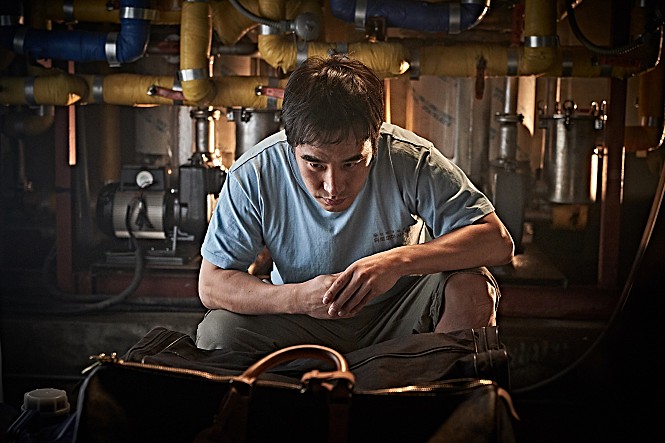 Nonetheless, trouble was brewing for Korean films. South Korea's first case of COVID-19 was reported on January 20, and anxiety spread quickly among the local populace, who still remembered a poorly-handled outbreak of the MERS coronavirus in 2015. Film distributors fell into a quandary about how to respond. One of the first casualties was the critically-praised thriller Beasts Clawing at Straws, which had just won a Special Jury Award at Rotterdam the previous month, and which was scheduled to open in theaters on February 12. Featuring a complex, well-structured plot and strong performances from Jung Woo-sung and Jeon Do-yeon, the film looked like a release with strong commercial potential. But as frightening headlines about the novel coronavirus began to proliferate, distributor Megabox Plus M decided to move the release back a week, to February 19. In retrospect, this was a fatal mistake, as a major cluster of infections were reported in Daegu on the 19th. The news worsened quickly and within a week, South Korea had one of the highest concentrations of confirmed infections in the world. Beasts Clawing at Straws would end up with only 630,000 admissions, the first of many titles to see their shot at profitability go up in smoke.
Nonetheless, trouble was brewing for Korean films. South Korea's first case of COVID-19 was reported on January 20, and anxiety spread quickly among the local populace, who still remembered a poorly-handled outbreak of the MERS coronavirus in 2015. Film distributors fell into a quandary about how to respond. One of the first casualties was the critically-praised thriller Beasts Clawing at Straws, which had just won a Special Jury Award at Rotterdam the previous month, and which was scheduled to open in theaters on February 12. Featuring a complex, well-structured plot and strong performances from Jung Woo-sung and Jeon Do-yeon, the film looked like a release with strong commercial potential. But as frightening headlines about the novel coronavirus began to proliferate, distributor Megabox Plus M decided to move the release back a week, to February 19. In retrospect, this was a fatal mistake, as a major cluster of infections were reported in Daegu on the 19th. The news worsened quickly and within a week, South Korea had one of the highest concentrations of confirmed infections in the world. Beasts Clawing at Straws would end up with only 630,000 admissions, the first of many titles to see their shot at profitability go up in smoke.
The pandemic also affected films in production. In a case of spectacularly bad timing, a string of big-budget films set in overseas locations were all scheduled to ramp up production in early 2020. Of these, only Ryoo Seung-wan's Escape From Mogadishu, which began shooting in Morocco in late 2019, managed to wrap production before international travel restrictions were put in place. Productions that were not so lucky included the crime drama Bogota, which pulled out of Colombia with only a fraction of its shooting complete; Yim Soon-rye's Afghanistan-set Negotiation, which had to cancel its planned shoot in Jordan; and the Lebanon-set kidnapping drama Pirap starring Ha Jung-woo which had to postpone its production to 2021.
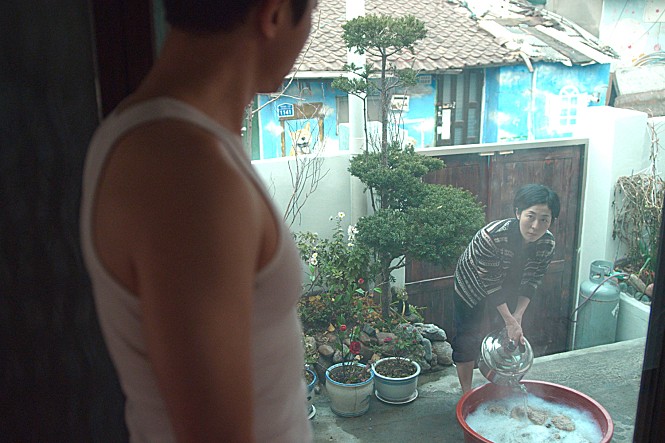 South Korea did end up handling its outbreak well and flattening its curve, so that the country never went into full lockdown. But theaters were hit particularly hard, and film attendance slowed to a trickle. Virtually all of the major commercial releases were postponed to later in the year, with re-releases like La La Land taking up the slack. Nonetheless there were a few low-budget independent films that pushed ahead with their releases, and ended up grossing numbers that - by the standards of independent cinema -- were rather decent. One notable example was Lucky Chan-sil, the offbeat story of an out-of-work producer, which was enthusiastically received during its premiere at the 2019 Busan International Film Festival. Opening commercially on March 5, the film still managed to pull in 25,000 viewers, which would have been considered a success in any year.
South Korea did end up handling its outbreak well and flattening its curve, so that the country never went into full lockdown. But theaters were hit particularly hard, and film attendance slowed to a trickle. Virtually all of the major commercial releases were postponed to later in the year, with re-releases like La La Land taking up the slack. Nonetheless there were a few low-budget independent films that pushed ahead with their releases, and ended up grossing numbers that - by the standards of independent cinema -- were rather decent. One notable example was Lucky Chan-sil, the offbeat story of an out-of-work producer, which was enthusiastically received during its premiere at the 2019 Busan International Film Festival. Opening commercially on March 5, the film still managed to pull in 25,000 viewers, which would have been considered a success in any year.
Looking ahead to the future, it's hard to see what lies in wait. For all the struggles that Korean independent cinema has been through in recent years, this sector will likely show more resilience in the face of the damage wrought by the pandemic. But it's an open question when audiences will return to theaters in numbers that will support a big-budget film. New labor regulations in recent years have pushed up the cost of shooting in Korea, so at the very least it will be a struggle to get back to making movies on the scale of Ashfall. On the other hand, the success of Parasite suggests that if or when the world does recover from the pandemic, be it in 2021 or in later years, South Korea may be poised to continue its a role as an influential cultural leader far beyond its own borders. Clearly, hard times lie ahead. But all hope is not lost.
Sending a Message: Korean Cinema in 2018
There are times in the history of any film industry when the audience makes its feelings known. The past twelve months have been such a time. A string of big-budget, high profile releases that were expected to do well were rejected by the audience with a vehemence that was a bit startling. Online discourse about film, which has always been polarized, displayed a sustained level of anger and frustration that was noticeable. On the other hand, films that offered something new, or were made in a style or genre that had been overlooked in recent years, often outperformed expectations. When you step back and look at the year as a whole, there was a noticeable gap between the kind of films that Korea's big studios were releasing in theaters, and the kind of films that audiences wanted to see. After losing an astonishing amount of money, the film companies now seem to have gotten the message.
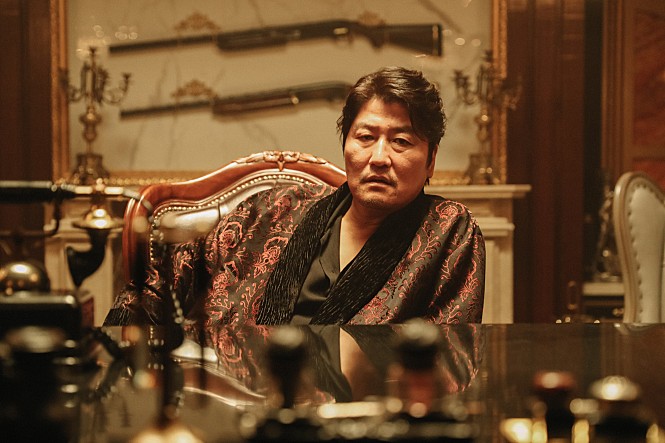 Consider as an example The Drug King, a big-budget production released in December 2018. On paper this project must have seemed like a can't-miss prospect. The director Woo Min-ho was coming off a massive, well-received hit film Inside Men (2015). Leading star Song Kang-ho has a long, reliable track record of success, most recently in the massive 2017 hit A Taxi Driver, and can be relied upon to give a dynamic, eye-opening performance. He was surrounded by a strong supporting cast including Bae Doona and Jo Jeong-seok. The story is based on real events and references the major social transformations of the late 20th century - an approach that has worked well in the past. Finally, it was released by major distributor Showbox during the peak winter box office season, when students finish their exams and head to the movie theaters in droves.
Consider as an example The Drug King, a big-budget production released in December 2018. On paper this project must have seemed like a can't-miss prospect. The director Woo Min-ho was coming off a massive, well-received hit film Inside Men (2015). Leading star Song Kang-ho has a long, reliable track record of success, most recently in the massive 2017 hit A Taxi Driver, and can be relied upon to give a dynamic, eye-opening performance. He was surrounded by a strong supporting cast including Bae Doona and Jo Jeong-seok. The story is based on real events and references the major social transformations of the late 20th century - an approach that has worked well in the past. Finally, it was released by major distributor Showbox during the peak winter box office season, when students finish their exams and head to the movie theaters in droves.
Yet The Drug King performed at only a fraction of its high expectations (1.8 million admissions, which was well below its break-even point). Online comments about the film were merciless, condemning the predictable rise-and-fall plot and the film's reliance on provocative content to attract attention. Within no time it was being held up as an example of all that is wrong with contemporary Korean cinema. Although it's true that The Drug King compares poorly to Inside Men in terms of storytelling and execution, it seems likely that if it had been released five years earlier, it wouldn't have received anywhere near the same level of criticism. In other words, much of the anger directed towards The Drug King may have reflected accumulated frustration about Korean films in general.
In contrast, consider the case of the mid-budget comedy Extreme Job. From up-and-coming director Lee Byoung-heon, one of the few directors working in the film industry to specialize in comedy, the film is about a group of detectives who struggle to keep a low profile while on an extended stakeout of a criminal organization. They decide to buy out a failing fried chicken restaurant across the street from the criminal's hideout to give them a base, secure in the knowledge that hardly any customers will show up. But when a lone customer starts raving online about a bizarre fusion fried chicken dish cooked up by one of the cops, the restaurant becomes a viral sensation and they are soon overwhelmed with business.
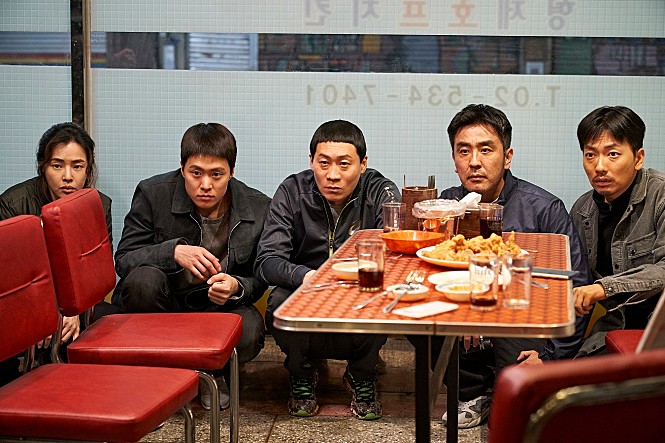 In this case, a very different dynamic was at work. The film is undeniably funny and effectively paced. Given the audience's positive response, it's no surprise that it turned into a hit. But the scale of its success went far beyond even the rosiest projections. Released in late January 2019, Extreme Job spent a month at #1 and recorded an astonishing 16.3 million admissions, making it Korea's second most popular film of all time after 2014 historical epic Roaring Currents' total of 17.6 million admissions. In terms of revenue, Extreme Job ranks at the top with US$123 million. Director Lee surely deserves all the credit for his success, but it's also true that the film seemed to tap into pent-up demand for a decent comedy.
In this case, a very different dynamic was at work. The film is undeniably funny and effectively paced. Given the audience's positive response, it's no surprise that it turned into a hit. But the scale of its success went far beyond even the rosiest projections. Released in late January 2019, Extreme Job spent a month at #1 and recorded an astonishing 16.3 million admissions, making it Korea's second most popular film of all time after 2014 historical epic Roaring Currents' total of 17.6 million admissions. In terms of revenue, Extreme Job ranks at the top with US$123 million. Director Lee surely deserves all the credit for his success, but it's also true that the film seemed to tap into pent-up demand for a decent comedy.
Why have so few Korean comedies been made in recent years? For the most part, it's because of conventional wisdom among investors and the big film studios. Comedies have been considered an "old" genre, that worked well in the early 2000s but were not well suited to the contemporary audience. Now, of course, that conventional wisdom has been shattered, and film companies are rushing to add comedies to their slate.
But it goes beyond a simple question of genre. There is a sort of money-making template, based on star power, high production values and serious, weighty themes, that has been embraced by investors. The idea that the middle is falling out of the industry, leaving only low budget films and blockbuster-scale works that can secure a wide release, has been repeated like a mantra, even in the face of contradictory evidence. As a result of these beliefs (and rising production costs, particularly due to new labor rules), 2018 saw a massive increase in the number of big-budget films (defined as 10 billion won or US$9 million and up), and comparatively low levels of mid-budgeted films in the $3 million to $7 million range.
 In the end, the big-budget films suffered a bloodbath, and the few mid-budgeted films that were released did rather well. Many of the blockbuster flops were from directors who have solid track records of box office success, such as Kim Jee-woon's dystopian Illang: The Wolf Brigade (pictured right), Kang Hyeong-cheol's musical Swing Kids set in a POW camp, Kim Byung-woo's military thriller Take Point, Choo Chang-min's murder mystery Seven Years of Night, Yeon Sang-ho's Psychokinesis, Woo Min-ho's The Drug King, and from early 2019, Lee Jeong-beom's corrupt cop drama Jo Pil-ho: The Burning Rage.
In the end, the big-budget films suffered a bloodbath, and the few mid-budgeted films that were released did rather well. Many of the blockbuster flops were from directors who have solid track records of box office success, such as Kim Jee-woon's dystopian Illang: The Wolf Brigade (pictured right), Kang Hyeong-cheol's musical Swing Kids set in a POW camp, Kim Byung-woo's military thriller Take Point, Choo Chang-min's murder mystery Seven Years of Night, Yeon Sang-ho's Psychokinesis, Woo Min-ho's The Drug King, and from early 2019, Lee Jeong-beom's corrupt cop drama Jo Pil-ho: The Burning Rage.
Each of these films had a defensible strategy for finding box-office success, but part of the problem was that they all had more or less the same strategy. There is clearly a level of audience fatigue setting in for the sort of dark, heavy drama that characterizes much recent big-budget filmmaking. One recent blockbuster-scale release (which I won't identify for the sake of spoilers) ends with the film's charismatic leads being gunned down by machine gun fire. This was meant to reference Korea's tragic modern history, and perhaps provoke an upsurge of nationalist feeling, but after years of watching such films, viewers no longer seem to be in the mood. The idea that blockbuster films should be fun to watch is something that has been overlooked in recent times.
A look at the blockbusters that did achieve some blockbuster success is illuminating. 2018's most successful film by far was Along With the Gods: The Last 49 Days which tallied 12.3 million admissions in early August. This sequel to the even more successful Along With the Gods: The Two Worlds from late 2017 is based on a popular web comic, and features a mix of spectacle and melodrama set in the realm of the afterlife. Despite a weak critical reception, the film appealed to all age groups and set itself up for more lucrative sequels in the future.
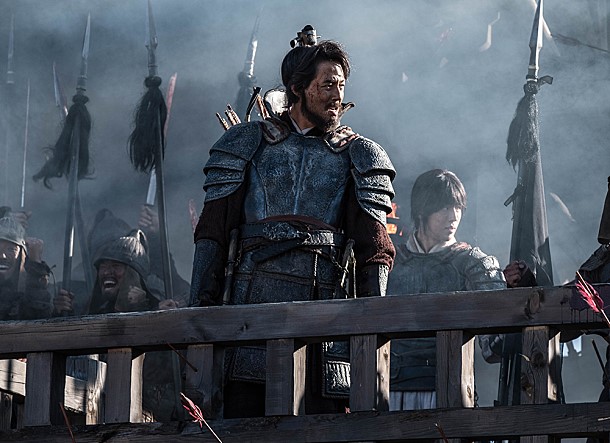 Another commercial success, if not on the same level, was director Kim Kwang-sik's first big budget production The Great Battle. Budgeted at US$20 million and based on a 7th century skirmish between Tang Dynasty forces and the residents of the small Ansi Fortress, the film is rich in spectacle and features a charismatic performance by popular star Jo In-sung. Although not groundbreaking, it benefits from effective pacing and an emotionally involving buildup to the final confrontation. It was, in other words, fun -- and audiences lined up to make it the second-highest grossing Korean film of the year, with a total of 5.4 million admissions.
Another commercial success, if not on the same level, was director Kim Kwang-sik's first big budget production The Great Battle. Budgeted at US$20 million and based on a 7th century skirmish between Tang Dynasty forces and the residents of the small Ansi Fortress, the film is rich in spectacle and features a charismatic performance by popular star Jo In-sung. Although not groundbreaking, it benefits from effective pacing and an emotionally involving buildup to the final confrontation. It was, in other words, fun -- and audiences lined up to make it the second-highest grossing Korean film of the year, with a total of 5.4 million admissions.
Two other big-budget films managed to do respectably well, earning positive word of mouth through effective characterization and storytelling, as well as highly memorable settings and content. The Spy Gone North premiered at Cannes in May 2018 and went on to earn a respectable 4.9 million admissions during its summer release. Set in the 1990s, and based on the dramatic real-life experiences of an undercover spy, the US$20 million film presented a new perspective on North-South relations as well as some beautifully rendered shots of Pyongyang.
Meanwhile Lee Hae-young's Believer, a loosely adapted remake of Johnnie To's Drug War, was the one big-budget release of 2018 that seemed to pick up real momentum from positive word of mouth. With a supremely talented ensemble cast giving highly memorable performances, the film demonstrated that not all dark-themed films were doomed to fail, if they exhibited tight storytelling and something unique. Despite being released "off season" in May, Believer accumulated just over 5 million admissions.
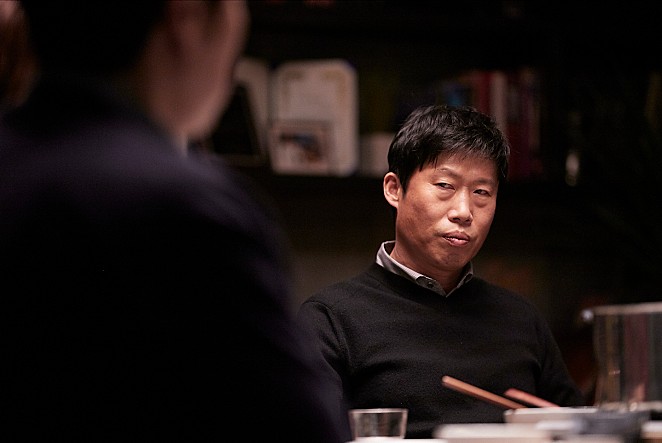 The picture was much brighter for the mid-budgeted films of 2018, which appealed to viewers mostly on the strength of their storytelling. At the head of the pack was Intimate Strangers (pictured), the Korean remake of the famously successful 2016 Italian feature Perfect Strangers which has spawned numerous remakes across the world. Sticking fairly close to the original, the film benefitted from good casting and enthusiastic word of mouth to rack up a highly impressive 5.3 million admissions. Considering its modest budget, it stands as one of the year's most profitable releases.
The picture was much brighter for the mid-budgeted films of 2018, which appealed to viewers mostly on the strength of their storytelling. At the head of the pack was Intimate Strangers (pictured), the Korean remake of the famously successful 2016 Italian feature Perfect Strangers which has spawned numerous remakes across the world. Sticking fairly close to the original, the film benefitted from good casting and enthusiastic word of mouth to rack up a highly impressive 5.3 million admissions. Considering its modest budget, it stands as one of the year's most profitable releases.
Also drawing attention was Default, the second film by director Choi Kook-hee (Split), which examines South Korea's questionable handling of the 1997 Asian financial crisis, and its closed door dealings with the International Monetary Fund over a record bailout package. Sharing some things in common with Hollywood film The Big Short, but also portraying the lasting effects of the crisis on South Korea's middle class, the film is especially powered by a standout performance by actress Kim Hye-soo.
In terms of genre cinema, director Lee Kwon's well-received thriller Door Lock was also built around the acting skills of an acclaimed performer. Kong Hyo-jin plays an employee at a bank who suspects that someone is trying to get into her apartment. A remake of the 2011 Spanish thriller Sleep Tight by Jaume Balaguero, the film's expert handling of suspense was well received by audiences. Meanwhile the popular Ma Dong-seok of Train to Busan fame also found a suitable vehicle for his star persona in Unstoppable, a hugely likeable and entertaining action film that recalls the Taken franchise.
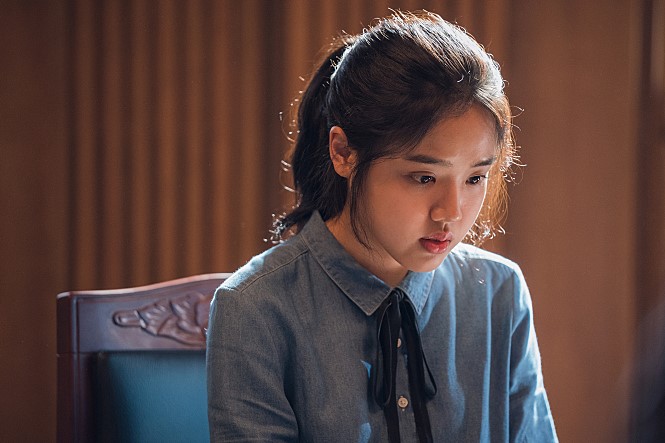 Although the early part of 2019 has been dominated by Extreme Job's extreme success, a few other works have garnered attention from audiences. Innocent Witness (pictured) is a courtroom drama about an autistic girl (Kim Hyang-gi) who is the only witness of a mysterious crime. When the defendant's lawyer (Jung Woo-sung, in a charismatic performance) comes looking for a way to discredit her testimony, he finds himself turning more sympathetic to her point of view.
Although the early part of 2019 has been dominated by Extreme Job's extreme success, a few other works have garnered attention from audiences. Innocent Witness (pictured) is a courtroom drama about an autistic girl (Kim Hyang-gi) who is the only witness of a mysterious crime. When the defendant's lawyer (Jung Woo-sung, in a charismatic performance) comes looking for a way to discredit her testimony, he finds himself turning more sympathetic to her point of view.
Finally, the drama Birthday holds a special place among recent films. It's hard to overestimate the effect of the tragic 2014 sinking of the Sewol Ferry on contemporary Korean society. Although the politics surrounding the event are complicated, Birthday avoids politics and depicts a family torn apart by the loss of their teenage son. Centered around the heartbreaking performances of award-winning actors Sol Kyung-gu and Jeon Do-yeon, the film has proven to be both meaningful and well made. It also marks the emergence of an exciting new talent in debut director Lee Jong-eon, a longtime assistant to director Lee Chang-dong.
So where does Korean cinema stand at the current moment? Although the overall statistics for 2018 indicate only a modest decline, the large number of dramatic box office failures suggest that producers and investors have some soul-searching to do. The last decade has seen the increasing systemization of the film industry, as its biggest companies have grown ever more powerful. In some respects this has made the industry stronger, but it has also left it vulnerable in a creative sense. The more formulas and templates adopted by the big studios, the more likely it is that audiences will grow tired of seeing the same style of movies over and over again.
It may be that someday we can look back on 2018 as a key moment, when the audience spoke up and expressed its dissatisfaction with the state of Korean filmmaking. At first glance it looks like the studios are getting the message, but whether they are truly flexible enough to respond to audiences' evolving tastes is yet to be seen.
Making Amends: South Korean Cinema in 2017
The past 12 months have brought a change of seasons to South Korean politics and society. For the Korean film community, the election of President Moon Jae-in to replace the disgraced and impeached Park Geun-hye signaled the end of a decade-long winter, which was marked by slashed funding, government reprisals and secret blacklists of cultural figures. Much of the focus of the past year has been on rebuilding institutions like the Korean Film Council and the Busan International Film Festival which had been compromised under the previous two administrations. But the arrival of spring has not been without its own degree of turbulence. In the political sphere, tensions with North Korea and the U.S. has kept the country on edge, even as a new diplomatic front opened in early 2018. And after a slow start, the #MeToo movement hit South Korea with full force, shaking many sectors of society, including the film industry.
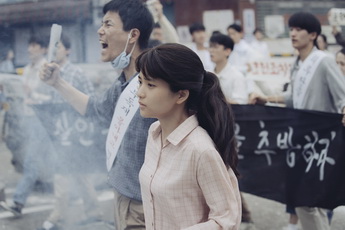 Several films released over the past year have successfully captured various aspects of the current historical moment. The sense of society rising up and ushering in a new era was effectively depicted in Jang Joon-hwan's 1987: When the Day Comes. Set in the run-up to the so-called June Struggle of 1987, in which mass demonstrations forced the military government to introduce direct presidential elections and a democratic constitution, the film follows a wide cast of characters in order to show how one small act of resistance can lead to another, and gradually build up momentum for social change. With its combination of a timely social message (the film inevitably calls to mind the mass demonstrations against the government leadership in 2016-17), its complex but effective storytelling, and its all-star cast, 1987: When the Day Comes was for many critics the film of the year.
Several films released over the past year have successfully captured various aspects of the current historical moment. The sense of society rising up and ushering in a new era was effectively depicted in Jang Joon-hwan's 1987: When the Day Comes. Set in the run-up to the so-called June Struggle of 1987, in which mass demonstrations forced the military government to introduce direct presidential elections and a democratic constitution, the film follows a wide cast of characters in order to show how one small act of resistance can lead to another, and gradually build up momentum for social change. With its combination of a timely social message (the film inevitably calls to mind the mass demonstrations against the government leadership in 2016-17), its complex but effective storytelling, and its all-star cast, 1987: When the Day Comes was for many critics the film of the year.
Just as timely in many ways was the political thriller Steel Rain, which explores the present-day tension between South and North Korea. Directed by Yang Woo-seok (whose debut film The Attorney was an FEFF award-winner in 2014), the film opens with a elaborately-planned coup attempt against the North Korean leadership. In the chaos and confusion that results, a North Korean military agent ends up in Seoul, forced to cooperate with a South Korean national security secretary whose motives he cannot trust. At turns suspenseful, funny, frightening and thought-provoking, the film opened in December at a time when real-life nuclear tensions on the Korean peninsula were almost as intense as the events depicted in the film.
The abovementioned movies represent two of the three major releases of the 2017-18 winter box-office season. As it turned out, the third film Along With The Gods: The Two Worlds also (unintentionally) found itself at the center of a major social storm. The #MeToo movement, which took shape last fall in Hollywood following allegations against producer Harvey Weinstein, did not immediately take hold in Korea. However in late January, a female prosecutor Seo Ji-hyun appeared on live TV to describe being groped at a funeral by one of her superiors, and the reprisals she suffered after she tried to speak up about it. The outpouring of public support she received encouraged other women to go public with their own stories, and before long the #MeToo movement had penetrated deep into all corners of Korean society.
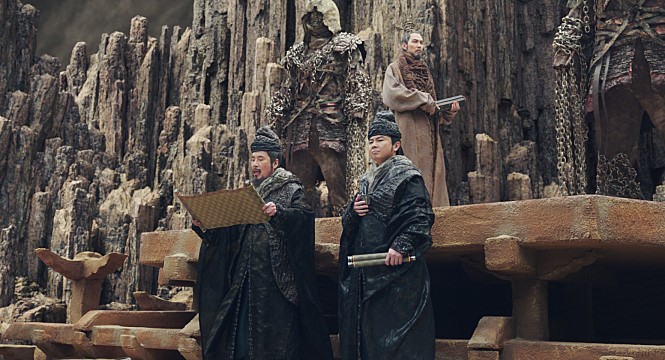 Within the film industry, one of the first figures to be accused was the popular supporting actor Oh Dal-soo (Assassination, Ode to My Father), who admitted to sexually abusing several women early in his career. Oh had played a key supporting role in the tremendously successful Along With the Gods: The Two Worlds, although the film had already earned the majority of its 14.4 million admissions (the second-highest grossing film of all time in Korea) at the time the story broke. Nonetheless, this film is merely the first in a two-part series, with part two already shot and being readied for a summer 2018 release. After some deliberation, the production company decided to re-cast and re-shoot the scenes that feature Oh and another actor Choi Il-hwa who was accused of similar crimes.
Within the film industry, one of the first figures to be accused was the popular supporting actor Oh Dal-soo (Assassination, Ode to My Father), who admitted to sexually abusing several women early in his career. Oh had played a key supporting role in the tremendously successful Along With the Gods: The Two Worlds, although the film had already earned the majority of its 14.4 million admissions (the second-highest grossing film of all time in Korea) at the time the story broke. Nonetheless, this film is merely the first in a two-part series, with part two already shot and being readied for a summer 2018 release. After some deliberation, the production company decided to re-cast and re-shoot the scenes that feature Oh and another actor Choi Il-hwa who was accused of similar crimes.
Major figures in the political world, academia, literature, theater circles and more have been brought down by #MeToo allegations, but the most high profile case in the film industry involves Golden Lion-winner Kim Ki-duk and his frequent collaborator Cho Jae-hyun, who were accused by multiple women on a leading investigative TV program of repeated assault. Both are now currently under criminal investigation, and it appears that their long careers may be over.
So in one sense, the Korean film industry is going through a period of profound upheaval and change. The Korean Film Council is making an effort to address issues like sexual harassment and gender discrimination in the industry. At the same time, they are also drawing up plans to increase support for independent cinema, which has suffered through a lean decade under conservative rule. The number of independent films produced in Korea is expected to rise in the coming years, as more funds are made available for production support. Nonetheless, distribution and marketing of independent films will remain a challenge in a market dominated by the major distributors.
The one area of the industry that has not shown much change is in the overall statistics. In 2017 there were 219.9 million film tickets sold totaling $1.66 billion, a 0.8% increase on the previous year. The market share of Korean films dropped slightly to 51.8%. Four distributors - CJ Entertainment, Lotte Entertainment, Showbox, and NEW - continue to dominate the market (CJ has been the top distributor for 15 years straight), although the smaller distributor-exhibitor Megabox found considerable success with mid-budget releases like The Outlaws, Little Forest and Anarchist from the Colony.
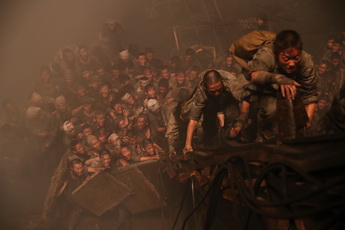 Some of the year's box-office hits were expected to do well from the start, while others came as a surprise. The most ambitious, high-profile release of 2018 was Ryoo Seung-wan's big-budget The Battleship Island, which opened in July. Set during World War II on the Hashima Island coal mine, the film depicts the tragic experiences of Korean forced laborers and women forced into prostitution. Its jaw-dropping action sequences and massive open set unquestionably set a new standard for Korean blockbusters. Nonetheless the film's mix of historical polemic and genre spectacle proved highly controversial, in a way that exposed divisions within Korean society. Those on the more nationalist end of the spectrum were incensed at the film's depiction of Koreans collaborating with the Japanese, while those on the other end of the spectrum accused the film itself of being nationalist. In the end, The Battleship Island amassed 6.6 million admissions - a considerable amount, but far short of initial expectations.
Some of the year's box-office hits were expected to do well from the start, while others came as a surprise. The most ambitious, high-profile release of 2018 was Ryoo Seung-wan's big-budget The Battleship Island, which opened in July. Set during World War II on the Hashima Island coal mine, the film depicts the tragic experiences of Korean forced laborers and women forced into prostitution. Its jaw-dropping action sequences and massive open set unquestionably set a new standard for Korean blockbusters. Nonetheless the film's mix of historical polemic and genre spectacle proved highly controversial, in a way that exposed divisions within Korean society. Those on the more nationalist end of the spectrum were incensed at the film's depiction of Koreans collaborating with the Japanese, while those on the other end of the spectrum accused the film itself of being nationalist. In the end, The Battleship Island amassed 6.6 million admissions - a considerable amount, but far short of initial expectations.
Another major summer release, Jang Hun's A Taxi Driver, also took its inspiration from a real-life tragedy. In this case it was a lethal government crackdown on demonstrators in the city of Gwangju in 1980, which ended with hundreds (or perhaps thousands) of people killed and the army invading the city. The film focuses on a German photojournalist Jürgen Hinzpeter who, with the help of a taxi driver from Seoul, recorded images from the events in Gwangju and then distributed them to the outside world. Since news of the incident was suppressed in the Korean press, underground videotapes of the footage shot by Hinzpeter circulated among the Korean populace in the coming years - as indeed can be seen in a memorable scene from 1987: When the Day Comes. A Taxi Driver proved to be the must-see release of the summer season, with 12.2 million tickets sold.
Some other hits from 2017 arrived with less pre-release hype, but succeeded through strong word of mouth. Midnight Runners by up-and-coming director Jason Kim tells the story of two young police academy students who witness a kidnapping late one night, and decide to pursue the kidnappers, despite their lack of experience. A funny and warm-hearted action comedy that also goes into some pretty dark places, the film hung on to amass an impressive 5.7 million admissions.
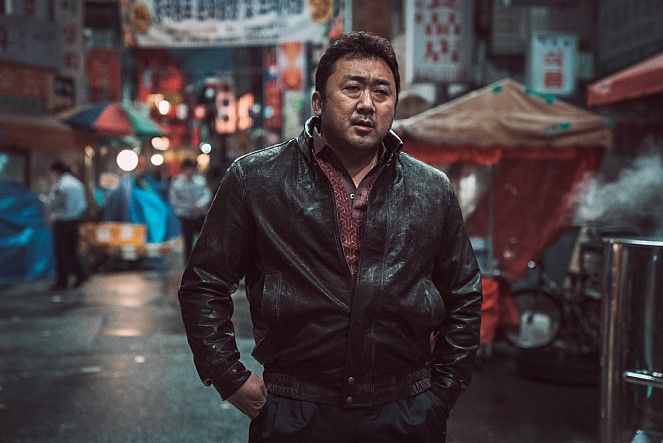 The Outlaws by debut director Kang Yun-sung was even more of a surprise. A violent thriller about an ethnic Korean gangster from China, and the police detective who tries to bring him to justice, the film looked from the outside like any number of other Korean mid-budget crime films. But a combination of inventive characterization, energetic pacing, and a charismatic performance by Ma Dong-seok (a.k.a. Don Lee, Train to Busan) turned it into a potent force at the box office. Indeed, with his unique blend of physical brawn and toughness masking an inner warmth and sympathy, Ma Dong-seok is proving himself to be a major box-office draw. After debuting in early October at #3, The Outlaws quickly rose to #1 and held on long enough to rack up a highly impressive 6.9 million admissions.
The Outlaws by debut director Kang Yun-sung was even more of a surprise. A violent thriller about an ethnic Korean gangster from China, and the police detective who tries to bring him to justice, the film looked from the outside like any number of other Korean mid-budget crime films. But a combination of inventive characterization, energetic pacing, and a charismatic performance by Ma Dong-seok (a.k.a. Don Lee, Train to Busan) turned it into a potent force at the box office. Indeed, with his unique blend of physical brawn and toughness masking an inner warmth and sympathy, Ma Dong-seok is proving himself to be a major box-office draw. After debuting in early October at #3, The Outlaws quickly rose to #1 and held on long enough to rack up a highly impressive 6.9 million admissions.
Sure enough, the fall season was bursting at the seams with thrillers. As a reliably performing genre with a certain degree of international appeal, thrillers have taken up an ever greater share of the major studios' slates in recent years. Some of the other standouts from 2017 include Zhang Hang-jun's psychological thriller Forgotten, which puts the audience in the mind of a very troubled young man who sees and remembers details about a disturbing murder that may or may have actually happened. A Special Lady by debut director Lee An-gyu stands out for its fascinating female lead played with cool authority and menace by veteran actress Kim Hye-soo. And The Chase turns familiar police procedurals on their head by depicting the investigation and pursuit of a serial killer, not by a group of tough young detectives, but rather by two retired old men who make up for their lack of physical prowess with a stubborn refusal to give up.
Moving beyond genre movies, 2017 was a good year for lower-budget dramas and independent films, although only a few titles managed to break out and receive widespread attention. Politically-themed documentaries such as Our President (about the late President Roh Moo-hyun) and Criminal Conspiracy (about government efforts to control public broadcasters) did well at the box-office, which was perhaps unsurprising given the current mood. For fiction features it was more of an uphill struggle to reach viewers, but the diverse subject matter and innovative style of independent films spoke for themselves. One example of such a film - though it is a very special case - was Running Actress, the directorial debut of acclaimed actress Moon So-ri. Featuring herself playing herself, the film is a wry look at the various burdens and pressures that actors and other members of the Korean film industry deal with each day.
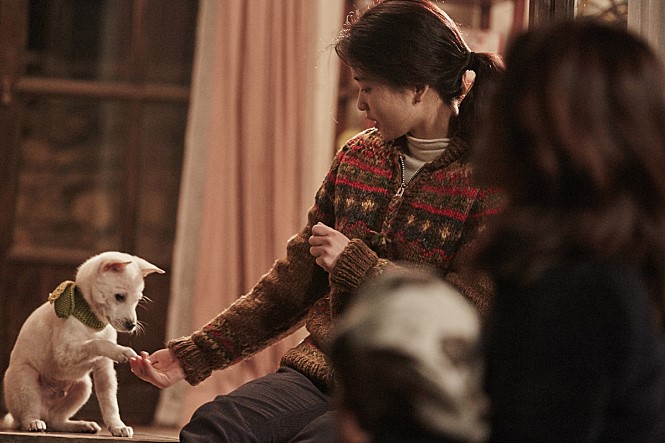 Moving into early 2018, one of the most striking things about Korean cinema in the first three months of the year was the better-than-expected performance of a group of low and mid-budget films. Director Yim Soon-rye's Little Forest, featuring rising star Kim Tae-ri (The Handmaiden), is an adaptation of a Japanese manga about a woman who sets aside her fast-paced life to move to the countryside, grow food, and cook. Quite popular with younger viewers, the film's better-than-expected box office performance spoke both to the quality of the filmmaking, and also perhaps to a reconsideration of life values among the younger generation, who suffer the most from the highly competitive nature of Korean society.
Moving into early 2018, one of the most striking things about Korean cinema in the first three months of the year was the better-than-expected performance of a group of low and mid-budget films. Director Yim Soon-rye's Little Forest, featuring rising star Kim Tae-ri (The Handmaiden), is an adaptation of a Japanese manga about a woman who sets aside her fast-paced life to move to the countryside, grow food, and cook. Quite popular with younger viewers, the film's better-than-expected box office performance spoke both to the quality of the filmmaking, and also perhaps to a reconsideration of life values among the younger generation, who suffer the most from the highly competitive nature of Korean society.
Also performing quite well were two films in genres that used to be mainstays of Korean cinema, but which in recent years have rarely been produced by the major studios. The classic melodrama Be With You is a remake of a 2004 Japanese film about a woman who mysteriously returns to her husband and young son six months after her death. With a standout performance by actress Son Ye-jin, the film fought off competition from bigger-budget fare and proved that melodramas still have potential in the Korean market.
Just a few weeks later, a similar dynamic was at play with the found-footage horror film Gonjiam: Haunted Asylum, directed by Jung Bum-sik (Epitaph). Budgeted at just $1 million, the film centers on a group of horror enthusiasts who film their visit to an abandoned, supposedly haunted insane asylum in the hopes of cashing in on Youtube. The horror genre has fallen far from its heyday in the early 2000s, when 5-6 new spine-tingling features arrived in theaters at the start of every summer. That seasonal tradition seems to have passed into history, but with the success of Gonjiam, which easily out-performed both Ready Player One and the big-budget CJ Entertainment production Seven Years of Night, new life has been breathed into the horror genre.
It may be that the unexpected success of the three films mentioned above was due to singular, one-time factors. But it also may be a sign that Korean audiences are in the mood for something new. Critics have been calling for a more diverse slate of films from the major studios for some years now. Perhaps now audiences will follow suit? The coming year, which will feature a record number of blockbusters budgeted at $10 million or over, will give us some indication.
Overshadowed by Reality?: South Korean Cinema in 2016
It's not uncommon for films to end up competing with real world events. A day of exceptionally good weather may make people less likely to go to the movie theater. If a national team has a particularly strong run in the World Cup, box office returns inevitably drop during their winning streak. In the case of South Korea, recent months have seen the film industry coping with a different sort of outside distraction: millions of people massing in the streets, demanding the removal of the president.
Korean politics has always been entertaining, but 2016 reached a level of peak scandal such that the events reported in the evening news rivaled even the most inventive political thrillers. It was perhaps inevitable that the strongly conservative Park Geun-hye, daughter of dictator Park Chung-hee who ruled from 1961 until his assassination in 1979, would have a controversial presidency. The policies she put in place were deeply divisive, from ordering government-written history textbooks to secretly compiling a blacklist of thousands of cultural figures to be denied government support, including such well-known names as director Park Chan-wook and actor Song Kang-ho.
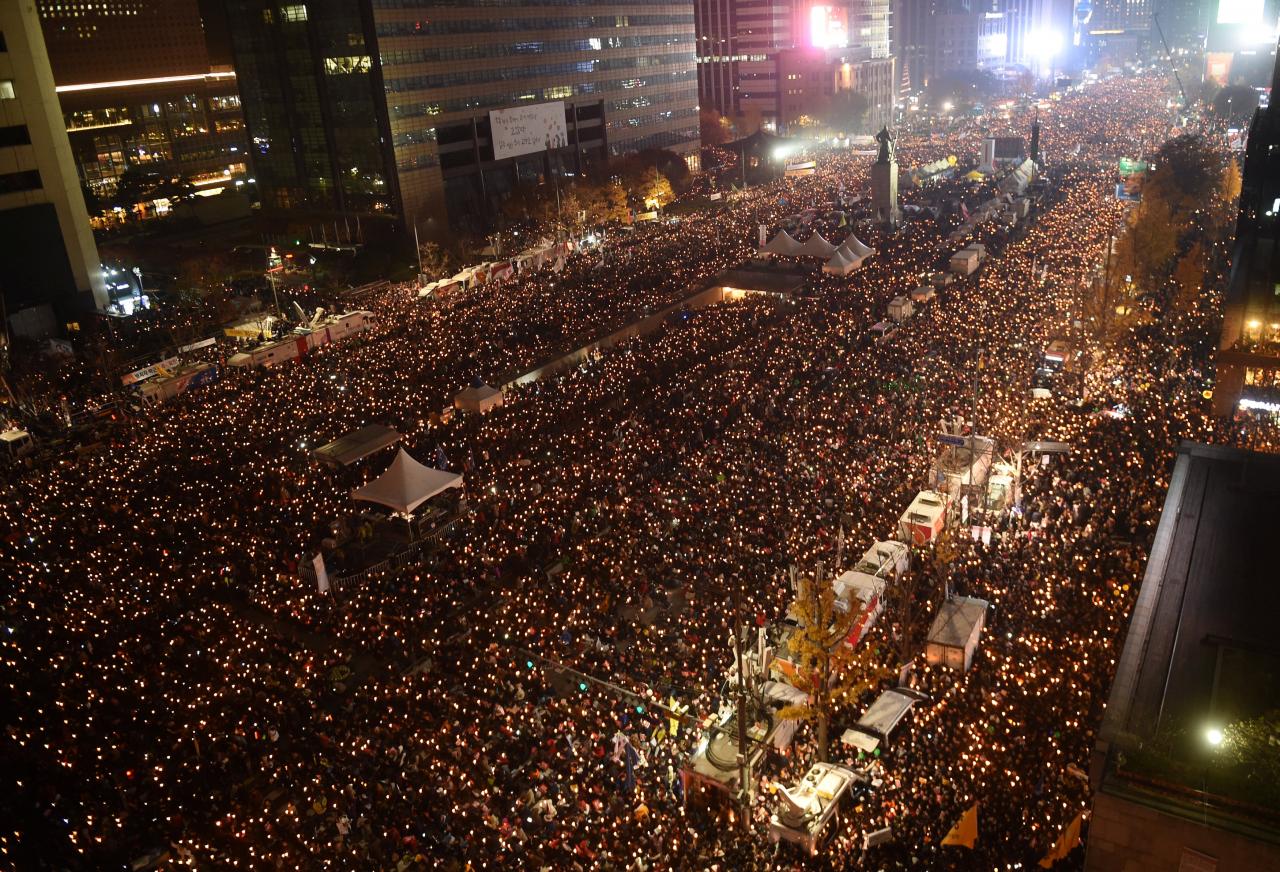 Nonetheless, revelations of a shadowy Rasputin-like figure who controlled her political career behind the scenes managed to startle even the most jaded of observers. Choi Soon-sil, the daughter of a cult-like religious leader, held no official position in government but was often the ultimate decision maker on issues ranging from policy to personnel appointments to the president's speeches and even her wardrobe. In the meantime, Choi used her connection with the president to pressure business groups like Samsung to pay her and her daughter millions of dollars' worth of bribes. It was not so much the corruption that shocked the populace, but the realization that the president was almost helpless on her own without the guidance of a woman who freely took advantage of her.
Nonetheless, revelations of a shadowy Rasputin-like figure who controlled her political career behind the scenes managed to startle even the most jaded of observers. Choi Soon-sil, the daughter of a cult-like religious leader, held no official position in government but was often the ultimate decision maker on issues ranging from policy to personnel appointments to the president's speeches and even her wardrobe. In the meantime, Choi used her connection with the president to pressure business groups like Samsung to pay her and her daughter millions of dollars' worth of bribes. It was not so much the corruption that shocked the populace, but the realization that the president was almost helpless on her own without the guidance of a woman who freely took advantage of her.
It was late autumn of 2016 when the full force of the scandal hit, and citizens responded by pouring into the streets for repeated demonstrations that numbered up to 2 million in central Seoul alone. Politicians in the National Assembly passed a motion of impeachment, temporarily barring Park from office as the Constitutional Court opened a case on whether her actions justified permanent dismissal. For the next three months the nation held its breath, until finally the court announced its decision on March 10 in an inspiring and carefully-judged ruling that upheld the impeachment. An election for the next president will be held in early May.
For members of the film industry, the past few years have been dark times politically. The Busan International Film Festival has been hurt badly by political reprisals after it screened a documentary in 2014 that was highly critical of the government. Government funding for independent and specialty cinema has been slashed, putting small distributors and arthouse theaters out of business. At the other end of the spectrum, the CJ group also faced pressure and direct threats from the Park Geun-hye administration, causing distributor CJ Entertainment to avoid financing films that conflicted too strongly with the president's priorities.
More generally, politics have been a huge distraction for the film industry at the end of 2016 and early 2017. Films unlucky enough to have been released in late autumn surely suffered a box office hit from the massive weekly Saturday protests. Meanwhile, policy decisions at the Korean Film Council and the Ministry of Culture and Tourism (the latter of which was particularly implicated in the president's scandal) have ground to a virtual halt over the past six months.
Given its traditionally high levels of government support for the film industry, South Korea is a country where politics really do have a big effect on cinema. In that sense, the upcoming presidential election has injected a long-overdue note of optimism into the film community. If, as expected, the opposition wins the election for the next president, it could prove to be the most positive news the film industry has heard in a long time.
Turning to the films themselves, the past 12 months were characterized by an unusual concentration of releases by big-name Korean directors, including Park Chan-wook (The Handmaiden, premiering at Cannes), Na Hong-jin (The Wailing, also bowing at Cannes), Kim Jee-woon (The Age of Shadows, premiering at Venice), Kim Ki-duk (The Net, also presented at Venice), and Hong Sangsoo (On the Beach at Night Alone, which competed in Berlin and won a Best Actress award for Kim Min-hee). It's an unusually strong collection of films that earned highly positive reviews.
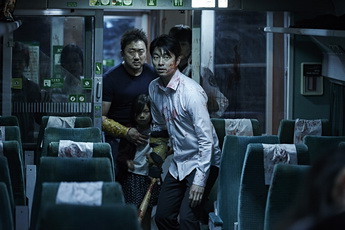 Also standing out was the Cannes premiere Train to Busan, the first live action film by independent animator Yeon Sang-ho. Released in Korea last July, the film about a zombie outbreak on a high-speed train topped the yearly box office (11.6 million admissions) but made a particular impression abroad. It set new box office records for Korean films in Singapore (US$ 4 million), Malaysia (US$ 5.2 million), the Philippines (US$ 6 million), and Taiwan (US$10 million), and the jaw-dropping US$9.3 million it earned in Hong Kong set a new record for Asian films as a whole, including Chinese-language films.
Also standing out was the Cannes premiere Train to Busan, the first live action film by independent animator Yeon Sang-ho. Released in Korea last July, the film about a zombie outbreak on a high-speed train topped the yearly box office (11.6 million admissions) but made a particular impression abroad. It set new box office records for Korean films in Singapore (US$ 4 million), Malaysia (US$ 5.2 million), the Philippines (US$ 6 million), and Taiwan (US$10 million), and the jaw-dropping US$9.3 million it earned in Hong Kong set a new record for Asian films as a whole, including Chinese-language films.
The movies mentioned above screened widely on the festival circuit and have already been released in many territories, including Italy. But the works that comprise this year's FEFF selection may provide a more representative sampling of the current state of filmmaking in Korea.
For example, Bluebeard by director Lee Soo-yeon represents an innovative new entry into Korean cinema's long tradition of thriller films. Cho Jin-woong (The Handmaiden) plays a soft-spoken colonoscopy specialist who moves to the countryside and develops an awkward relationship with his creepy neighbor. Director Lee's smooth handling of mood and tension recalls her previous feature The Uninvited (2003), which is now remembered as a modern-day classic.
Vanishing Time: A Boy Who Returned marks the commercial debut of director Um Tae-hwa, whose low-budget independent feature Ingtoogi turned heads in 2013. A moody fantasy about a young boy and girl affected by a strange time warp, the movie features striking special effects and a standout performance from debut actress Sin Eun-su. As a whole, the work is pervaded by a melancholic tone that later reveals itself as an homage to the students who passed away in the Sewol Ferry sinking of 2014.
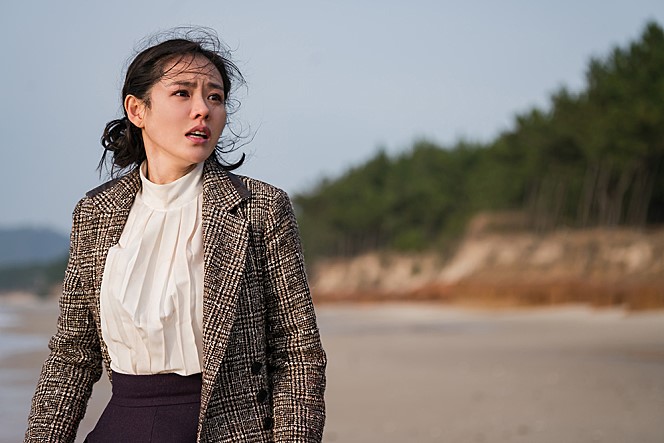 Hur Jin-ho's The Last Princess is the latest entry in one of the strongest current trends in Korean cinema: films dealing with the era of Japanese colonization (1910-1945). Based on a novel about one of the last descendants of the Korean royal line, the film takes considerable liberties with history but provides actress Son Ye-jin with a platform for a show-stopping performance. It also represents a newly evolved style for Korean melodrama, something closer to classic Hollywood cinema in its tone and presentation. Released in August 2016, it surpassed expectations at the box office with a strong 5.6 million admissions.
Hur Jin-ho's The Last Princess is the latest entry in one of the strongest current trends in Korean cinema: films dealing with the era of Japanese colonization (1910-1945). Based on a novel about one of the last descendants of the Korean royal line, the film takes considerable liberties with history but provides actress Son Ye-jin with a platform for a show-stopping performance. It also represents a newly evolved style for Korean melodrama, something closer to classic Hollywood cinema in its tone and presentation. Released in August 2016, it surpassed expectations at the box office with a strong 5.6 million admissions.
Broadly speaking, 2016 was a decent year at the box office, even with the year-end street protests. Although only one release (Train to Busan) passed the 10 million admissions mark, stats for the year as a whole compare favorably to the record-breaking 2015, with a slight rise in revenues and a slight drop in admissions. The average Korean citizen watched 4.20 films in 2016, which still ranks as the highest rate of attendance in the world.
One of the trends driving this box office performance is the continued strength of the star system, and studios' increased tendency to assemble an Ocean's Eleven-like cast of 3-4 major stars and a host of famous supporting players in its biggest-budget productions. (The model for this seems to be Choi Dong-hoon's 2012 heist film The Thieves and 2015 period extravaganza Assassination, both of which were smashing successes). The latest example of such packaging comes in the blockbuster release The Master, which features three white-hot male stars in Lee Byung-hun, Gang Dong-won, and Kim Woo-bin. Directed by FEFF alumnus Cho Ui-seok (Cold Eyes), the crime drama features various action setpieces and an ambitious finale shot in Manila. Released in the peak season just before Christmas, The Master ultimately grossed 7.2 million admissions.
Concerns about power and corruption (a timely theme, to be sure) lie at the heart of another recent release, New Trial, which is based on a real-life incident. Film/TV star Jung Woo plays a cynical and dejected lawyer who ends up supporting a poor young man's efforts to clear his name of murder. Director Kim Tae-yun (Another Family) delivers an entertaining film while also managing to inject a measure of idealism and moral outrage into the story. The film proved to be a good match for the public mood, and surpassed expectations with 2.4 million tickets sold.
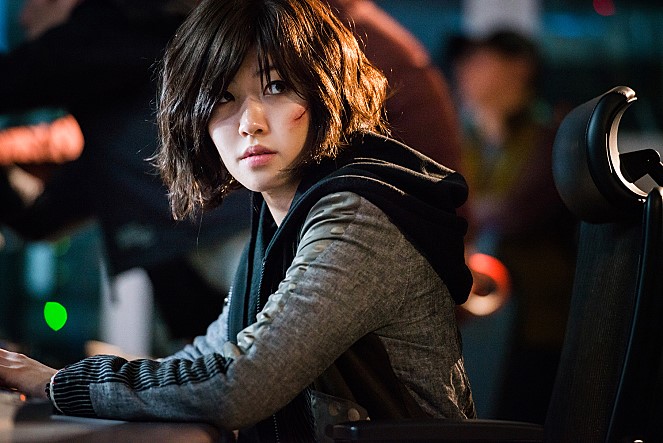 Drawing a similar number of viewers during the same period in early 2017 was the more playful Fabricated City, which is also centered around a young man unfairly accused of murder. Director Park Kwang-hyun's long awaited follow-up to his 2005 hit Welcome to Dongmakgol (an FEFF Audience Award winner), the film boasts a colorful array of characters and an anarchic, comic book sensibility that connected well with young viewers. And even with its outlandish villain (played with a knowing wink by How to Use Guys With Secret Tips star Oh Jeong-se), this film too shows how ordinary citizens can easily fall victim to the rich and powerful.
Drawing a similar number of viewers during the same period in early 2017 was the more playful Fabricated City, which is also centered around a young man unfairly accused of murder. Director Park Kwang-hyun's long awaited follow-up to his 2005 hit Welcome to Dongmakgol (an FEFF Audience Award winner), the film boasts a colorful array of characters and an anarchic, comic book sensibility that connected well with young viewers. And even with its outlandish villain (played with a knowing wink by How to Use Guys With Secret Tips star Oh Jeong-se), this film too shows how ordinary citizens can easily fall victim to the rich and powerful.
Other highlights of recent months include the debut film Split by director Choi Kook-hee, set within a bowling and gambling underworld where a totally unexpected friendship develops. It's not only an original idea, but surprisingly well acted and executed for a first time director. Canola, set mostly on the picturesque Jeju Island, is also about two people from different worlds working to establish a relationship. The elderly Gae-chun, played movingly by actress Youn Yuh-jung (The Actresses), has lived the last 12 years in a daze after the sudden disappearance of her granddaughter. Then suddenly one day her granddaughter returns, having grown into a young woman.
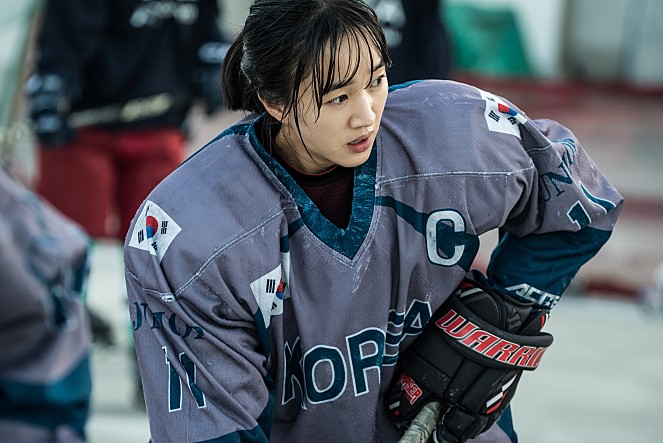 Run-Off, meanwhile, presents the struggles of a diverse and inexperienced group of women who are thrown together to represent South Korea in women's hockey at the Asian Games. A sequel in name to the 2009 hit Take-Off, though the only link between the two films is their basic concept, Run-Off follows a predictable trajectory but becomes hugely gripping by the end, thanks in part to a heartfelt performance from Soo Ae as a woman who played hockey in North Korea before defecting.
Run-Off, meanwhile, presents the struggles of a diverse and inexperienced group of women who are thrown together to represent South Korea in women's hockey at the Asian Games. A sequel in name to the 2009 hit Take-Off, though the only link between the two films is their basic concept, Run-Off follows a predictable trajectory but becomes hugely gripping by the end, thanks in part to a heartfelt performance from Soo Ae as a woman who played hockey in North Korea before defecting.
On a darker note, The Prison features veteran actor Han Seok-kyu (Shiri) as a menacing convict named Ik-ho who even while in jail is able to orchestrate daring and elaborate crimes in the outside world. When a new prisoner arrives, Ik-ho sees something unusual in him, but decides to put him in his place. Finally, House of the Disappeared features Han Seok-kyu's Shiri co-star Kim Yun-jin (who later became famous in the TV series Lost) as a woman accused of murdering her family. Released from prison years later, she hurries back to her dilapidated house, believing it holds the key to finding her long-lost son.
What do all these films tell us about the current state of Korean commercial filmmaking? They paint a picture of an industry that is more closely tied to established genres than it was a decade ago, but which still makes an effort to do something interesting and new within those boundaries. Less established directors do not enjoy the level of creative freedom as a Park Chan-wook or a Kim Jee-woon, but their creative energy - and their high level of competence - can be felt in works like these.
The above films also contain more than a few outstanding acting performances. This is a reminder that South Korean cinema benefits not only from star power, but also from the high degree of dedication and perfectionism that is now taken for granted among Korean actors. Even many child actors display tremendous range and power in their performances of recent years.
And as for the future? The coming months promise a resolution to the turmoil in the president's office which has so clearly impacted the film industry in recent years. Yet not everything is smooth sailing ahead. A standoff with China over the deployment of the U.S.-provided THAAD anti-ballistic missile system has resulted in China's retaliatory suspension of cultural exchanges, package tours and film-related business between the two countries. The two film industries had significantly deepened their ties in recent years, so this sudden reversal is hitting the Korean film industry hard. (This is not even to mention the destabilizing influence of recent North Korean provocations and the even more unpredictable behavior of the man in charge of the U.S. government.)
Still, Korean filmmakers show no signs of slowing down, and we have some tremendously ambitious releases to look forward to in the coming year, including Bong Joon-ho's Netflix-financed Okja and Ryoo Seung-wan's The Battleship Island. Given this, it's quite possible that before the year is finished, Korean cinema will have seized back the spotlight from politics.
In a Serious Mood: South Korean Cinema in 2015
The past 12 months have been a time in which politics, history, and economics have all played a particularly central role in the Korean film industry. Whereas 3-4 years ago most press coverage of the film industry focused on its commercial growth, perceptions of the film industry appear to be shifting. As the narrative of the commercially powerful local industry that dominates its home market and wins over fans abroad has started to wear thin, conversation about the film industry is now more likely to focus on its contributions to Korea's social and political sphere. These days, the image of a commercially successful film director is not just someone who earns a lot of money, but someone who -- like Choi Dong-hoon with Assassination or Yoon Je-gyun with Ode to My Father -- starts a national conversation on a certain topic. Meanwhile, lighthearted films and lighthearted talk about the film industry are on the decline. These are serious times for Korean cinema.
Admittedly, social and political issues have always been close to the surface in Korean films. In a country that over the last century has experienced colonization, war, national division, dictatorship, and a turbulent transition to democracy, this is perhaps inevitable. But the current political climate in Korea is particularly divisive and harsh. Specifically, the sense of gloom and trauma that fell over the country in the wake of the April 2014 Sewol ferry disaster, which claimed the lives of hundreds of students, has yet to lift. The belief that Korean society is a corrupt and unfair system, where the powerful pursue their own interests at the expense of everyone else, finds expression in many contemporary Korean films.
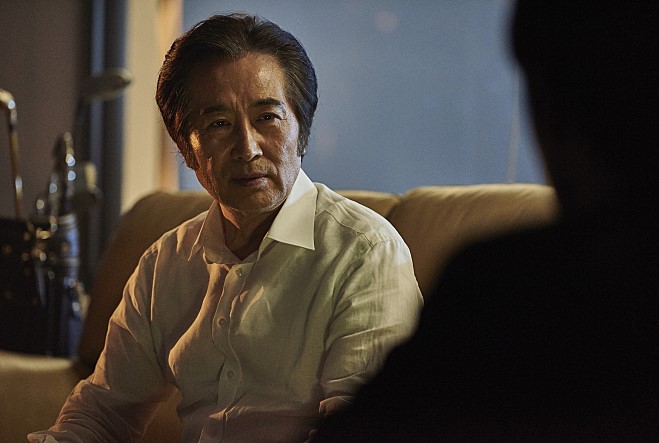 One among many relevant examples is the political/crime drama Inside Men, which opened in November and enjoyed broad commercial success on a scale that nobody saw coming. The story centers around three representative figures: an ambitious prosecutor (Cho Seung-woo) whose career is blocked by his lack of connections; a minor gangster (Lee Byung-hun) who vows to get revenge on the politician who betrayed him; and a powerful newspaper editor (Baek Yoon-sik) who plays the role of kingmaker in local politics. This film by director Woo Min-ho resonated strongly with the frustration and cynicism of the mainstream public, leading to extremely positive word of mouth. Despite its strong content and 19+ rating, the 130-minute film sold a massive 7 million tickets, and was then released in an extended 181-minute version that sold an additional 2 million tickets. No 19+ rated Korean film has ever sold so many tickets.
One among many relevant examples is the political/crime drama Inside Men, which opened in November and enjoyed broad commercial success on a scale that nobody saw coming. The story centers around three representative figures: an ambitious prosecutor (Cho Seung-woo) whose career is blocked by his lack of connections; a minor gangster (Lee Byung-hun) who vows to get revenge on the politician who betrayed him; and a powerful newspaper editor (Baek Yoon-sik) who plays the role of kingmaker in local politics. This film by director Woo Min-ho resonated strongly with the frustration and cynicism of the mainstream public, leading to extremely positive word of mouth. Despite its strong content and 19+ rating, the 130-minute film sold a massive 7 million tickets, and was then released in an extended 181-minute version that sold an additional 2 million tickets. No 19+ rated Korean film has ever sold so many tickets.
Inside Men may have been a unique box office phenomenon, but the basic concept of a bloodied underdog attempting to bring a member of the country's financial or political elite to justice has been replayed countless times in recent Korean films. Other examples include the prison drama A Violent Prosecutor (9.7 million admissions), legal drama The Advocate: A Missing Body (1.1 million admissions), and especially Ryoo Seung-wan's Veteran, the top grossing film of 2015 in which a steely police detective (Hwang Jung-min) starts a feud with the arrogant son of a business tycoon (Yoo Ah-in).
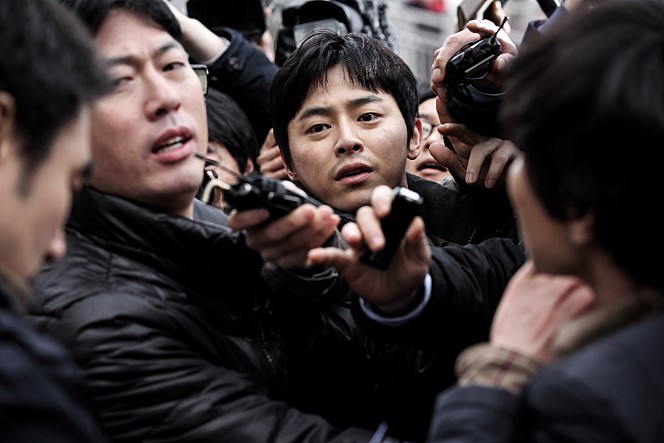 Apart from business and political elites, the mainstream press has also come under the microscope in recent films. After the biased and often incompetent press coverage of the Sewol tragedy drew widespread public condemnation, the role of journalists and media companies in shaping the national conversation has received more attention than ever before. One film that takes a poignant look at how media hysteria can grow out of hand is the second feature by Director Roh Deok, The Exclusive: Beat the Devil's Tattoo. The story of a reporter who breaks a sensational story that quickly spins out of control, The Exclusive provides a particularly vivid look at the inner dynamics of today's media.
Apart from business and political elites, the mainstream press has also come under the microscope in recent films. After the biased and often incompetent press coverage of the Sewol tragedy drew widespread public condemnation, the role of journalists and media companies in shaping the national conversation has received more attention than ever before. One film that takes a poignant look at how media hysteria can grow out of hand is the second feature by Director Roh Deok, The Exclusive: Beat the Devil's Tattoo. The story of a reporter who breaks a sensational story that quickly spins out of control, The Exclusive provides a particularly vivid look at the inner dynamics of today's media.
Yet of all the recent trends in contemporary Korean cinema, the one that most stands out relates to 20th-century history. In a turn that few industry observers could have predicted, an unprecedented number of films set in the Japanese colonial era (1910-1945) have been released or are currently in production.
This is surprising because traditionally, this has been a historical era that filmmakers have preferred to avoid. The colonization was a particularly harsh and authoritarian project which involved Japanese authorities assuming complete control over the Korean economy and public life, with the stated end goal of forcing Koreans to give up their native culture. By the end of the colonial period, use of the Korean language was restricted and Koreans were forced to adopt Japanese names.
The colonial period remains a painful topic, in part because the Korean elites who were seen as collaborating with Japanese rule were allowed to retain their wealth and influence by US administrators in the post-war years. In 2005, the makers of the ambitious biopic Blue Swallow about Korea's first female airplane pilot were harshly criticized by some angry netizens who claimed (unfairly, in many critics' opinions) that the film was celebrating the career of a collaborator. Given these sorts of ideological minefields, why bother setting a film in a time period that evokes nothing but subjugation and misery for contemporary audiences?
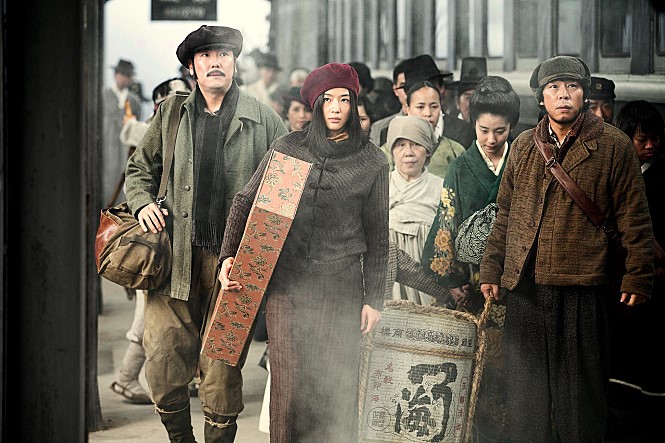 It was Choi Dong-hoon's star-studded Assassination that emerged as the first contemporary Korean film set in the colonial era to enjoy major commercial success. Starring Gianna Jun Ji-hyun, Ha Jung-woo, Lee Jung-jae and many other recognizable stars, the film centered around Korean independence fighters plotting to assassinate a Japanese military figure and a rich Korean collaborator. The film, which sold 12.7 million tickets (ranking as the 8th best-selling film of all time in Korea) quickly became the talk of the nation and led to a revival of interest in the colonial period and the Korean independence movement, which was largely based in Manchuria and China.
It was Choi Dong-hoon's star-studded Assassination that emerged as the first contemporary Korean film set in the colonial era to enjoy major commercial success. Starring Gianna Jun Ji-hyun, Ha Jung-woo, Lee Jung-jae and many other recognizable stars, the film centered around Korean independence fighters plotting to assassinate a Japanese military figure and a rich Korean collaborator. The film, which sold 12.7 million tickets (ranking as the 8th best-selling film of all time in Korea) quickly became the talk of the nation and led to a revival of interest in the colonial period and the Korean independence movement, which was largely based in Manchuria and China.
Multiple other films set in the colonial era also reached screens in 2015, and they were among the more creative and interesting efforts of the year. Lee Hae-young's genre-bender The Silenced is set in 1938 at a remote girls boarding school where the school administration is hiding something sinister. The film drew particular praise for its young cast, including lead Park Bo-young (Scandal Makers) and breakout young star Park So-dam (The Priests). Meanwhile, Park Hoon-jung's third feature The Tiger: An Old Hunter's Tale features Oldboy star Choi Min-sik as a grizzled tiger hunter who gets caught up in a massive, destructive hunt ordered by a Japanese administrator. Packed with symbolism, the film's tiger represents both nature, which is in conflict with modern development, and something of the native spirit of Korea.
Two lower budget films from early 2016 that tackled particularly serious topics related to the colonial era also captured significant attention from the public. Dongju: The Portrait of a Poet centers around the famous Korean poet Yoon Dongju, who attended university in Japan and died in prison after being accused of supporting independence efforts. The first low-budget production by King and the Clown director Lee Joon-ik sold an impressive 1 million tickets and earned critical praise for capturing the essence of the complicated and painful relationship between Korea and Japan. Meanwhile, Cho Jung-rae's Spirits Homecoming, about so-called "comfort women" who were forced into sexual servitude by the Japanese army during World War II, became a box office sensation with 3 million tickets sold. Interest in the film was undoubtedly heightened by a recent development in which the South Korean and Japanese governments reached a settlement on the comfort women's longstanding calls for a public apology. Nonetheless the government never consulted the survivors themselves, who denounced the deal amidst a public outcry.
Looking ahead, the trend of films set in the colonial era is scheduled to continue for at least the next couple years. In addition to numerous mid-sized productions, three of Korea's best known directors are jumping into the ring: Park Chan-wook (whose novel adaptation The Handmaiden is nearing completion), Kim Jee-woon (whose Secret Agent, scheduled for the fall, stars Song Kang-ho in a story about 1920s independence fighters), and Ryoo Seung-wan (whose Battleship Island, about 400 Koreans who attempt to escape a 1930s labor camp, is scheduled for next year).
A final trend that continues to have a major impact on the film industry is the increasing level of cooperation with China. For the moment, there is a strong mutual interest on the part of the South Korean and Chinese film industries to work together. China sees in South Korea a highly developed and successful commercial industry from which it can learn a lot about production technique, storytelling, marketing, and the technical aspects of filmmaking. South Korean filmmakers, on their part, are attracted by the size of the Chinese audience, significantly higher pay, and the opportunity to find a place within an emerging filmmaking powerhouse.
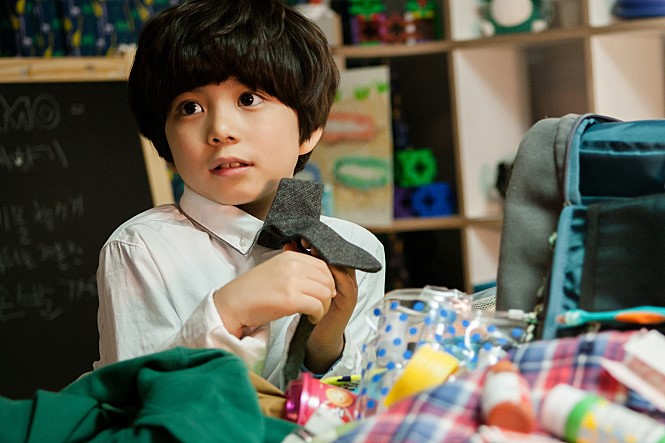 That said, effective co-operation is not an easy thing to pull off. Misunderstandings and disagreements have led to the collapse of numerous co-productions. Even when such issues are smoothed out, it is rare to find a story that seamlessly blends elements of both cultures. In this sense the comic drama Making Family, about a Korean boy who discovers that his sperm donor father is an artist living in China, represents a small but unusually successful instance of co-operation. Starring Korean actress Kim Ha-neul and Chinese actor/singer Aarif Rahman, the film has been warmly received by audiences.
That said, effective co-operation is not an easy thing to pull off. Misunderstandings and disagreements have led to the collapse of numerous co-productions. Even when such issues are smoothed out, it is rare to find a story that seamlessly blends elements of both cultures. In this sense the comic drama Making Family, about a Korean boy who discovers that his sperm donor father is an artist living in China, represents a small but unusually successful instance of co-operation. Starring Korean actress Kim Ha-neul and Chinese actor/singer Aarif Rahman, the film has been warmly received by audiences.
Amidst the general overall trend towards serious films on weighty topics, there have been very few lighthearted comedies to be found at the Korean box office. Perhaps the one comedy of the past 12 months to stir up significant word of mouth was Wonderful Nightmare by Director Kang Hyo-jin. Romantic comedy veteran Uhm Jung-hwa stars as a rich, ruthless single lawyer who, after an untimely accident and a bureaucratic mix-up in heaven, finds herself transposed into the life of a harried mother of two teenagers. Although it's not hard to predict where the film is going to end, strong performances all around and a clever, well-crafted screenplay helped the film to hang on at the box office far longer than anyone expected.
By the numbers, one can certainly say that 2015 was a strong year. For the fifth year in a row, overall box-office admissions (including both Korean and international films) set a new record. The total of 217.3 million tickets works out to an annual average of 4.3 films per citizen, which is believed to be the highest in the world. Although Korean films now occupy a slightly smaller percentage of the pie compared to a few years ago (local market share in 2015 was 52%), the fact that the pie keeps growing means that money keeps flowing into the film industry.
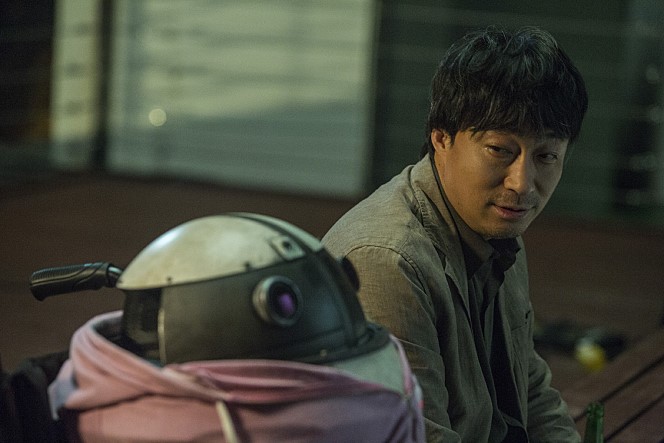 Yet these days, it's the quality and originality of Korean films that concerns observers more than their profitability. Particularly compared to the more freewheeling era of a decade ago, current films feel more predictable and conventional in their storytelling, casting and cinematic style. The filmmaking system has developed into such an efficient machine that proven formulas, rather than creative and crazy ideas, have a much easier time attracting finance. That said, it's still possible for unusual and surprising films to occasionally slip through the cracks. This year's case in point is Sori: Voice from the Heart, a film about a US spy satellite with artificial intelligence that intentionally crashes to Earth and ends up helping a grief-stricken father look for his lost daughter. Although not a box-office hit, it charmed critics with its unexpected narrative touches and its heartwarming but realistic message.
Yet these days, it's the quality and originality of Korean films that concerns observers more than their profitability. Particularly compared to the more freewheeling era of a decade ago, current films feel more predictable and conventional in their storytelling, casting and cinematic style. The filmmaking system has developed into such an efficient machine that proven formulas, rather than creative and crazy ideas, have a much easier time attracting finance. That said, it's still possible for unusual and surprising films to occasionally slip through the cracks. This year's case in point is Sori: Voice from the Heart, a film about a US spy satellite with artificial intelligence that intentionally crashes to Earth and ends up helping a grief-stricken father look for his lost daughter. Although not a box-office hit, it charmed critics with its unexpected narrative touches and its heartwarming but realistic message.
Observers have also been paying attention to some efforts to develop alternative filmmaking models that might support more creativity. One that has attracted both praise and criticism is CGV Arthouse, a division of Korea's leading multiplex chain which is also owned by its largest distributor, CJ Entertainment. CGV Arthouse locates itself in the middle of mainstream commercial cinema and low-budget independent film. Although in some cases it has helped independent filmmakers to shoot films on a slightly larger scale and reach a larger audience, in other cases it has produced works that are essentially mainstream genre films, but made in a way to give more creative space to the director. Two relevant examples of the latter include Coin Locker Girl, a hard-edged drama starring Kim Hye-soo that screened in Cannes' Critics Week last year, and Fatal Intuition, a smart thriller by sophomore director Yun Jun-hyeong that was warmly received by audiences during its fall release.
Yet it remains true that directors enjoy the most freedom when working on low-budget projects set up outside of the mainstream system. One particularly exciting debut from early 2016 was by director Yoon Ga-eun, who had already made a name for herself in the preceding years with award-winning short films. The World of Us is an intimate portrait of an ostracized young girl who becomes friends with a troubled student who moves into her neighborhood. With surprisingly solid acting and a well-observed story, the film is sure to linger in the memory of its viewers.
 Fourth Place, a feature by veteran director Jung Ji-woo (Happy End, Eun-Gyo) was one of the highlights of the 2015 Busan International Film Festival. Produced by the National Human Rights Commission of Korea, the film considers various issues around education and abuse as it relates to a young swimmer and his overbearing coach.
Fourth Place, a feature by veteran director Jung Ji-woo (Happy End, Eun-Gyo) was one of the highlights of the 2015 Busan International Film Festival. Produced by the National Human Rights Commission of Korea, the film considers various issues around education and abuse as it relates to a young swimmer and his overbearing coach.
Finally, this year marks the directorial debut of an actor who will be familiar to many fans of Korean cinema. Cho Jae-hyun, a regular collaborator of Kim Ki-duk's in films like Crocodile (1996), Bad Guy (2002) and Mobius (2013), proves to have an instinctual talent for character and storytelling in his film A Break Alone, about a married man who continues to obsess over a woman from his past. Starring Park Hyuk-kwon and Yoon Joo, the film has a style and rhythm that is all its own.
Looking ahead to the coming year or two, Korean film fans can look forward to some major works from the abovementioned Park Chan-wook, Kim Jee-woon, and Ryoo Seung-wan, as well as the highly anticipated mystery thriller Gokseong from Na Hong-jin, which opens in Korea this May. Leading director Bong Joon-ho is also preparing the highly ambitious global project Okja for 2017.
But given the huge numbers of films currently in production or development, we can also expect some lower-profile surprises to emerge. While it's true that the average Korean film has become more predictable in recent times, the fact that so many films continue to be made is one of the industry's strengths. It also makes it more likely that an unexpected discovery will turn up out of nowhere.
Money and Trouble: South Korean Cinema in 2014
The past 12 months in Korean cinema have been marked by two massive hit films, an accelerating trend, and plenty of controversy. Whether or not it was a good year or a bad year depends very much on who you happen to be talking to, but 2014 was a year to be remembered.
Let's begin with the hits. At the start of 2014, the reigning box office champion in Korea was James Cameron's 2009 film Avatar, with 13.6 million admissions. The #2 to #10 slots in the all-time box-office top ten were all taken up by Korean films, two of which (Bong Joon-ho's 2006 monster movie The Host, and Choi Dong-hoon's 2012 caper film The Thieves) had just barely cleared the 13 million admissions mark. But Avatar's record still seemed secure. In a country of 50 million inhabitants, there must be some upper limit to how many tickets a single film can sell. Avatar's score, which represented 27% of the population, was judged by many industry observers to be about as high as any film was likely to go.
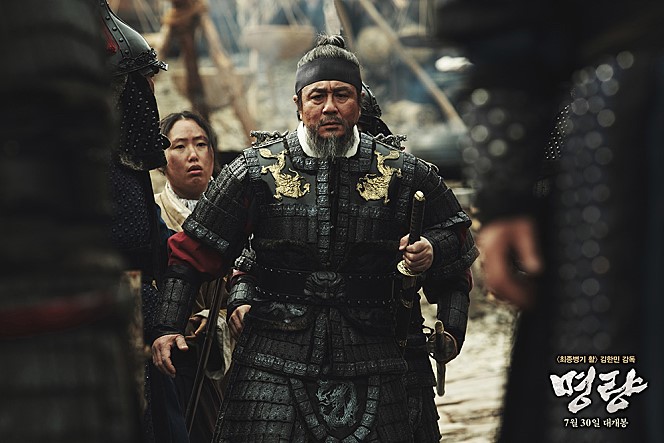 Nonetheless, two Korean films released in 2014 ended up passing Avatar. The first was Roaring Currents, which opened at the end of July. Directed by Kim Han-min (War of the Arrows), the film is an adaptation of a famous chapter in Korean military history. In the year 1597, during Hideyoshi's invasion of Korea, the celebrated admiral Yi Sun-sin took a battered force of only 13 warships and managed to defeat a force of 300 Japanese ships. The David-vs.-Goliath triumph has been adapted for the screen numerous times throughout Korean film and television history. But advances in CGI made it possible for Kim to create an unusually detailed and epic battle, which in the film lasts for a full hour. Choi Min-sik (Oldboy, Lucy) was perhaps the perfect choice as the lead character Yi Sun-sin, but unfortunately the screenplay didn't afford his character much depth. The decision to cast Korean actors in the roles of the Japanese antagonists was another questionable decision much debated by viewers. In the end, the film received a lukewarm response from critics, and even much of the general audience. But it became the very definition of a must-see film, given the combination of a stirring tale of national triumph, a respected main actor, and the film's ruminations on leadership which seemed relevant to the current political climate. Led by middle-aged male viewers, the film shot past Avatar in only two and a half weeks, and ended up with an astounding 17.6 million admissions.
Nonetheless, two Korean films released in 2014 ended up passing Avatar. The first was Roaring Currents, which opened at the end of July. Directed by Kim Han-min (War of the Arrows), the film is an adaptation of a famous chapter in Korean military history. In the year 1597, during Hideyoshi's invasion of Korea, the celebrated admiral Yi Sun-sin took a battered force of only 13 warships and managed to defeat a force of 300 Japanese ships. The David-vs.-Goliath triumph has been adapted for the screen numerous times throughout Korean film and television history. But advances in CGI made it possible for Kim to create an unusually detailed and epic battle, which in the film lasts for a full hour. Choi Min-sik (Oldboy, Lucy) was perhaps the perfect choice as the lead character Yi Sun-sin, but unfortunately the screenplay didn't afford his character much depth. The decision to cast Korean actors in the roles of the Japanese antagonists was another questionable decision much debated by viewers. In the end, the film received a lukewarm response from critics, and even much of the general audience. But it became the very definition of a must-see film, given the combination of a stirring tale of national triumph, a respected main actor, and the film's ruminations on leadership which seemed relevant to the current political climate. Led by middle-aged male viewers, the film shot past Avatar in only two and a half weeks, and ended up with an astounding 17.6 million admissions.
The second massive hit was released in December, at the year's other peak moviegoing season. JK Youn's Ode to My Father is not based on a real event, but it is very much concerned with history, in this case the era that stretches from the Korean War to the present. Inspired in part by films like Forrest Gump and Always - Sunset on Third Street, it is a look at the major events and historical forces that shaped Korea over the past 60 years, through the eyes of an ordinary citizen. More specifically, Youn said that he wanted to make a film that highlighted and paid tribute to the sacrifices made by his father's generation. Main character Duk-soo is just a boy when the film opens, and during a chaotic evacuation from Hungnam in North Korea, he becomes separated from his father and younger sister. He ends up in Busan with his mother and two other siblings, but life will prove hard in the coming decades, and to support his family he signs up to work as a miner in Germany, and later as a technician during the Vietnam War. All the while he dreams of being reunited with his lost family members.
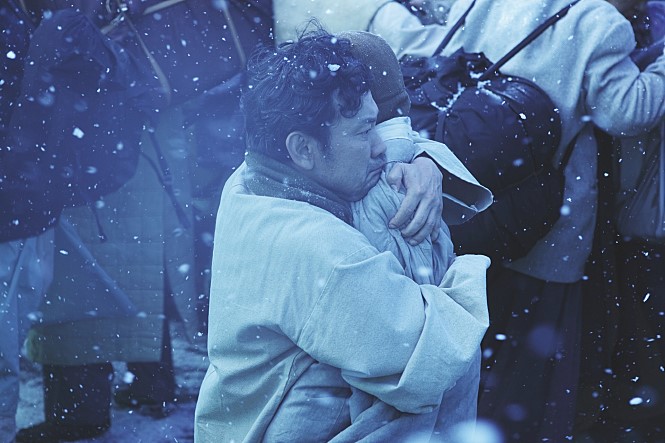 This is in many ways the most ambitious film yet for Youn, who over the years has found success with gangster comedy My Boss My Hero (2001), sex comedy Sex Is Zero (which screened at Udine in 2003), and tsunami disaster movie Haeundae, which itself sold 11 million tickets in 2009 (and which also screened at FEFF). Some critics have attacked Ode to My Father for its allegedly conservative view of modern history, but that is only one possible reading of it, and like Youn's other films there is a sharp edge lying just beneath the glossy surface. Although it didn't open nearly as strongly as Roaring Currents, it remained at or near the top of the charts for over two months, and by late February had passed the 14 million admissions mark.
This is in many ways the most ambitious film yet for Youn, who over the years has found success with gangster comedy My Boss My Hero (2001), sex comedy Sex Is Zero (which screened at Udine in 2003), and tsunami disaster movie Haeundae, which itself sold 11 million tickets in 2009 (and which also screened at FEFF). Some critics have attacked Ode to My Father for its allegedly conservative view of modern history, but that is only one possible reading of it, and like Youn's other films there is a sharp edge lying just beneath the glossy surface. Although it didn't open nearly as strongly as Roaring Currents, it remained at or near the top of the charts for over two months, and by late February had passed the 14 million admissions mark.
In the days of Shiri (1999), JSA (2000) and Friend (2001), a massive local hit film was typically the cause for widespread optimism and cheer, but in 2014 the industry response to the success of Roaring Currents and Ode to My Father was more circumspect. Both films were financed and distributed by CJ E&M, which towers above the industry and is now a major player in territories like Vietnam and Indonesia. Whereas in the past, many considered local cinema as being locked in a battle with Hollywood, these days the urgent questions facing the industry are more to do with the role of huge local conglomerates in the industry, and the increased corporatization of the filmmaking process. In this sense, the emergence of these two massive hits only underlined the fact that Korean cinema is now in a very different moment than it was a decade, or even just a few years ago.
As far as overall numbers go, the Korean film industry is still firing on all cylinders. Koreans watched a record 4.19 films per capita in 2014, which ranks highest among the world's major cinema markets. That amounted to a record 166.4 million admissions in overall ticket sales. Nonetheless, last year Hollywood grabbed a bigger share of the pie than usual, thanks to the runaway success of Frozen, Interstellar and other titles, bringing the market share for Korean films down to 50.1%. A report by the Korean Film Council on the overall profitability of Korean commercial films also pointed to a steep fall in average profits from 15.4% in 2013 (an admittedly very high figure) down to 0.3% last year. In other words, there are some people getting rich in the Korean film industry, but the wealth is not being spread very evenly.
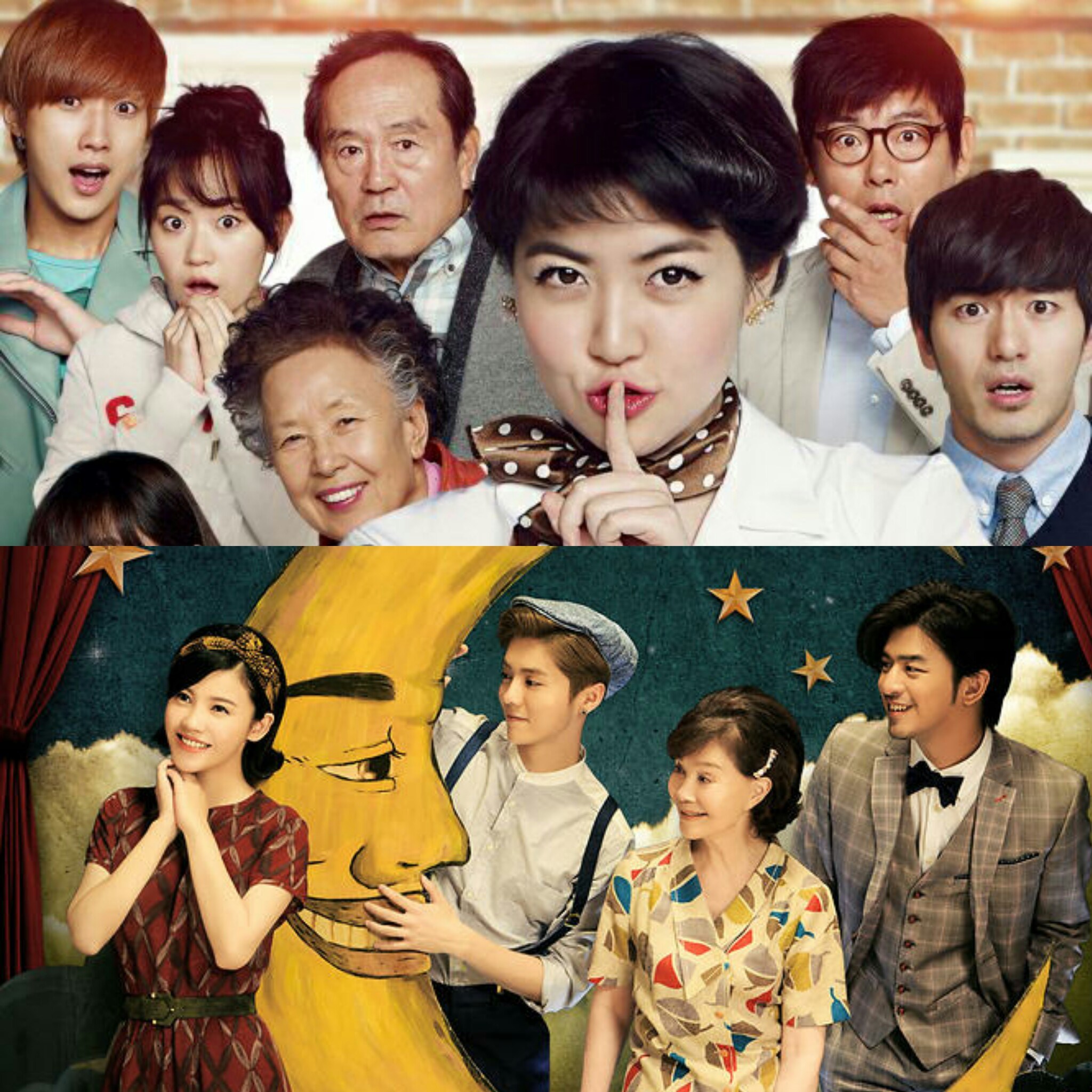 Potential riches are also the driving force between the major trend of recent times, which is the rapidly warming relationship between the Korean and Chinese film industries. Although not a new trend, it is a movement that is clearly gaining momentum. More and more Korean directors and stars are accepting offers to make films in China. A recent news article estimated that 200 Korean producers are in China right now looking to set up film projects. CJ E&M, which operates a multiplex chain in China, has been active producing Chinese-language titles, including a new version of Korean hit comedy Miss Granny that earned $60 million in China. At the 2014 Busan International Film Festival, the Chinese presence was unmistakable, with Youku Tudou and iQIYI announcing deals and throwing lavish parties. In October, Chinese media company Huace bought a $52 million stake in Korean distributor N.E.W. The following month, Dailan Wanda Group and the city of Busan jointly launched a $180 million film investment fund.
Potential riches are also the driving force between the major trend of recent times, which is the rapidly warming relationship between the Korean and Chinese film industries. Although not a new trend, it is a movement that is clearly gaining momentum. More and more Korean directors and stars are accepting offers to make films in China. A recent news article estimated that 200 Korean producers are in China right now looking to set up film projects. CJ E&M, which operates a multiplex chain in China, has been active producing Chinese-language titles, including a new version of Korean hit comedy Miss Granny that earned $60 million in China. At the 2014 Busan International Film Festival, the Chinese presence was unmistakable, with Youku Tudou and iQIYI announcing deals and throwing lavish parties. In October, Chinese media company Huace bought a $52 million stake in Korean distributor N.E.W. The following month, Dailan Wanda Group and the city of Busan jointly launched a $180 million film investment fund.
It's clear that the trend is being driven by mutual interest on the two sides, but the source of that interest is different. China is mostly seeking South Korean expertise in terms of content production, marketing know-how, use of star power, and technological innovation. The popularity of Korean TV dramas and music in China occasionally sparks consternation among Chinese politicians, but those working in the cultural industries are keen to pursue joint projects in the hopes of developing their own capabilities. On the Korean side the interest is, unsurprisingly, in China's vast market, and in Chinese investment. As a film market, China currently dwarfs Korea in size, and the gap is expected to quickly grow larger.
Some observers see these developments and think back to 2004-2006, when Japan's unexpected burst of interest in Korean pop culture put investors into a frenzy. Korean film producers, if they could cast a popular star, could more than finance the cost of their film with a single distribution deal to Japan. For a brief time, this completely overturned the economics of filmmaking in Korea. But ultimately the boom whimpered, and Japanese distributors stopped paying exorbitant prices for Korean films. A kind of recession followed for the Korean film industry.
This time around, the interest coming from China is much more broad-based, and it seems likely to last considerably longer. If Korean films can find even a small, sustainable foothold in China, and become more active in the production of Chinese-language content, then the impact on the industry will be huge. Right now there's the scent of a gold rush in the air. But if a day arrives, soon or far into the future, when China no longer needs South Korea's help, the comedown will be frightening.
The other thing that 2014, and indeed 2015 will be remembered for is controversy. Korea suffered a terrible tragedy last April when the Sewol ferry, overloaded with passengers and cargo, sank in strong currents off the southwestern coast. Although the captain and crewmembers were among the first to escape, 300 passengers died, most of them high school students on a class trip. A botched rescue effort, and the government's refusal of outside help, raised serious questions about the competence and judgment of figures up and down the chain of command. Meanwhile the nation was plunged into mourning and a deep bout of soul-searching, with many citizens' confidence in their own society deeply shaken.
All sectors of society and business were affected by the tragedy, including the film industry. Film festivals canceled red carpet events and parties, and three major distributors also found themselves in a predicament over their summer release schedule. In an awful coincidence, three of the summer's four biggest scheduled releases were set on the ocean, and featured sinking ships. Roaring Currents, no less, took place in the very same treacherous straight where the Sewol capsized. Ultimately the releases went ahead as scheduled, with Roaring Currents and The Pirates - a lighthearted period-set romp - appearing to suffer no consequences. Nonetheless Haemoo, a much darker film produced by Bong Joon-ho, may well have been impacted by lingering memories of the sinking.
 Throughout the spring and summer, the tragedy produced deep divisions within the political scene, as the government came under heavy criticism and rival parties debated the terms of an official investigation. Meanwhile, directors Lee Sang-ho and Ahn Hae-ryong were busy editing the first documentary about the incident. The Truth Shall Not Sink With Sewol (also known by its less portentous Korean title Diving Bell) focuses on the head of a diving corporation and his efforts - ultimately thwarted by authorities - to donate the use of a 3-ton diving bell to assist in the rescue operation. Highly critical of the government and the local news media, the documentary was invited to screen at the Busan International Film Festival. However shortly before the event, Busan mayor Seo Byung-soo called publicly for the film's invitation to be rescinded. Festival director Lee Yong-kwan refused, a media storm erupted, and screenings went ahead as planned. International trade papers gave the film strong reviews, and it was released commercially later that month.
Throughout the spring and summer, the tragedy produced deep divisions within the political scene, as the government came under heavy criticism and rival parties debated the terms of an official investigation. Meanwhile, directors Lee Sang-ho and Ahn Hae-ryong were busy editing the first documentary about the incident. The Truth Shall Not Sink With Sewol (also known by its less portentous Korean title Diving Bell) focuses on the head of a diving corporation and his efforts - ultimately thwarted by authorities - to donate the use of a 3-ton diving bell to assist in the rescue operation. Highly critical of the government and the local news media, the documentary was invited to screen at the Busan International Film Festival. However shortly before the event, Busan mayor Seo Byung-soo called publicly for the film's invitation to be rescinded. Festival director Lee Yong-kwan refused, a media storm erupted, and screenings went ahead as planned. International trade papers gave the film strong reviews, and it was released commercially later that month.
However the film, and the standoff in Busan, appears to have provoked the government into retaliation. First, Busan city ordered what some people are calling a punitive audit just weeks after the end of the festival. This was followed by the mayor calling for Lee Yong-kwan's resignation, which Lee also refused. Simultaneously, the national government appointed a new head of the Korean Film Council who quickly introduced new measures that would require pre-approval for all screenings at the nation's film festivals. (Previously, festivals became exempt from such requirements after holding their third edition) Support programs to independent cinema were also cut, and restructured to provide support to a limited number of titles selected by a KOFIC-appointed committee.
The film industry reacted with fury, labeling the actions as a return of government censorship, which had been declared unconstitutional in 1996. Press conferences were called and protests were scheduled; nonetheless, the government appears to have the upper hand. The situation will continue to play out over the course of 2015, and for filmmakers, much appears to be at stake.
With all of the big news and issues of the past year, at times the films themselves seemed to fall out of the spotlight. However, while not what you would call a banner year for commercial cinema, there were still very interesting films to be found in a variety of styles and genres.
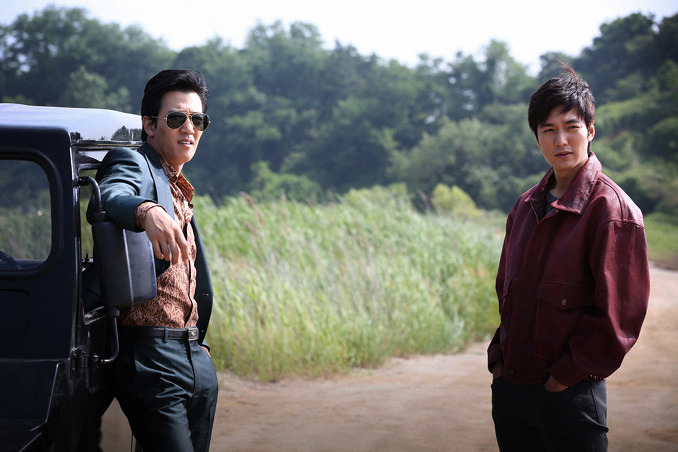 One of the standouts was Gangnam Blues, released in early 2015. Yu Ha has pushed the action and gangster film genres in fascinating directions with his previous works Once Upon a Time in High School (2004) and A Dirty Carnival (2006). Very much concerned with the interplay of power, politics and money, in his latest work he has fashioned a complex epic that centers around land speculation in the Gangnam district of Seoul in the 1970s. While international audiences will be familiar with the affluent Gangnam shown in Psy's famous music video, as recently as four decades ago the region was mostly farmland. Yu concocts a gripping story in which competing interests start to realize the potential of the district, and use any means necessary to acquire a greater share for themselves.
One of the standouts was Gangnam Blues, released in early 2015. Yu Ha has pushed the action and gangster film genres in fascinating directions with his previous works Once Upon a Time in High School (2004) and A Dirty Carnival (2006). Very much concerned with the interplay of power, politics and money, in his latest work he has fashioned a complex epic that centers around land speculation in the Gangnam district of Seoul in the 1970s. While international audiences will be familiar with the affluent Gangnam shown in Psy's famous music video, as recently as four decades ago the region was mostly farmland. Yu concocts a gripping story in which competing interests start to realize the potential of the district, and use any means necessary to acquire a greater share for themselves.
Power and money intertwine in different ways in another of the year's hits, Tazza: The Hidden Card. Based on the well-known comic that inspired the original Tazza hit film of 2006 by Choi Dong-hoon, the sequel is set within the same world but with a focus on different characters. Director Kang Hyoung-chul, whose first two films Scandal Makers and Sunny were breakout hits, shoots this story of gambling, deception and fraud with energy and panache, and the talented ensemble cast provides many memorable performances.
The year's most daring film in terms of genre and tone has to be My Ordinary Love Story by Lee Kwon, which screened as the closing film at the 2014 Puchon International Fantastic Film Festival, but was unfairly overlooked by audiences on its general release. Hard to describe without giving away its surprises, the film centers around a young woman who after a string of disastrous relationships believes she has finally found the right man. But some unexplained calls on his cellphone cause her to grow suspicious, leading her into a situation that spins out of control.
And if there were an award for best costumes, it would surely go to The Royal Tailor, a period-set drama about designers of traditional hanbok clothing in the Joseon Dynasty. The second film from Lee Won-suk, who won the audience award at FEFF with his standout comedy How To Use Guys with Secret Tips (2013), The Royal Tailor is a fully entertaining and gorgeously visualized story of the sometimes friendship, sometimes rivalry between two designers with fundamentally different tastes and talents. Korean cinema's boom in historical dramas shows no signs of abating, but the trend is unlikely to produce a better-looking film than this one.
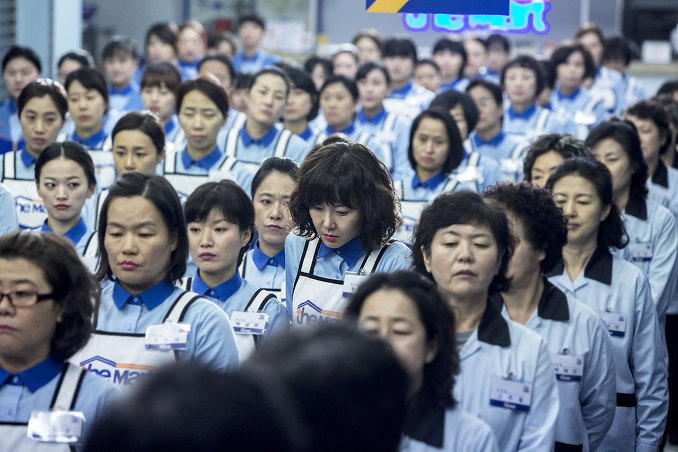 Boo Ji-young's Cart carries on a fascinating recent trend in social issue films. Based on a real incident, the film is about the employees of a discount store who are abruptly fired, and who make the difficult decision to go on strike. Highly moving, and always engaging to watch, the film can be described as a somewhat more audience-friendly take on a Ken Loach film. Although not a big hit, the film attracted 800,000 admissions and a warm response from critics.
Boo Ji-young's Cart carries on a fascinating recent trend in social issue films. Based on a real incident, the film is about the employees of a discount store who are abruptly fired, and who make the difficult decision to go on strike. Highly moving, and always engaging to watch, the film can be described as a somewhat more audience-friendly take on a Ken Loach film. Although not a big hit, the film attracted 800,000 admissions and a warm response from critics.
In the past decade Hollywood has remade a number of contemporary Korean classics including Oldboy, but has mostly made a hash of the process. By contrast with My Love My Bride, a contemporary director has remade a much-loved Korean film from the early 1990s by Lee Myung-Se, and found success. The new work, by The Barber's President director Lim Charn-sang, updates the story to the present day but retains its thoughtful and touching look at the realities of marriage. Shin Min-a (A Bittersweet Life) and Jo Jung-suk (The Face Reader) are both charming and believable as the lead couple.
As for debut films, one of the standouts was Confession by Lee Do-yun. The story centers around three friends from childhood who find themselves pulled in different directions as they become adults. The mother of one man owns an illegal gambling operation, and she secretly asks one of her son's friends to stage a fake robbery, so that she can collect an insurance payment. Secrets, misunderstanding and tragedy lead to a crisis for all three. Director Lee shows an unusual sensitivity and gift for characterization in this dark coming of age story.
The coming year looks to be packed with new releases, as a sort of production boom has taken hold. Some of the most anticipated titles are targeted for early summer, including Ryoo Seung-wan's latest feature Veteran, and the chilling Gokseong from the talented and unique Na Hong-jin (The Chaser). The industry itself can probably expect more turmoil and controversy, but viewers, it seems, will have plenty to watch in the theater.
The Bubble That Doesn't Burst: South Korean Cinema in 2013
A Korean man quoted in The New York Times recently, speaking about stage musicals, said, "Here in Korea we have bubbles, like everywhere else, but they don't burst. They just keep getting bigger." Such a statement may sound like the precursor to a sudden crash. But at least at the present moment, the South Korean film industry is looking like one of those bubbles that defy the laws of physics.
In 2013 Korean cinema once again soared to new heights, easily surpassing the record-breaking totals of 2012. Korean films alone sold a record 127.3 million tickets in 2013, up 11% on the previous year. That is more than twice as many admissions as they recorded in 2008. Nine of the top 10 grossing films of the year were Korean, and overall domestically-produced films accounted for 59.7% of all ticket sales. Amazingly, a report by the Korean Film Council estimated that, independent films excluded, the average commercial Korean film in 2013 will ultimately turn a profit of 15.2%.
Statistics like these suggest that Korean cinema is in the midst of its most successful run ever. In one sense, that is true. But a broader look at the film industry reveals a more mixed assessment. Some critics argue that large conglomerates, who dominate the film industry, restrict creative freedom in the pursuit of profits. They note that the spirit of creative experimentation that characterized the Korean film industry in the late 1990s and early 2000s has been replaced by an increasingly corporate approach to filmmaking.
Certainly, critics who watch all or most of the Korean films released in theaters each year can feel in them an overall sense of conformity. The mainstream film industry sticks to formulas more than it used to, and offers up fewer surprises than it has in the past. Nonetheless filmmakers have retained their ability to entertain, and every so often something exciting emerges.
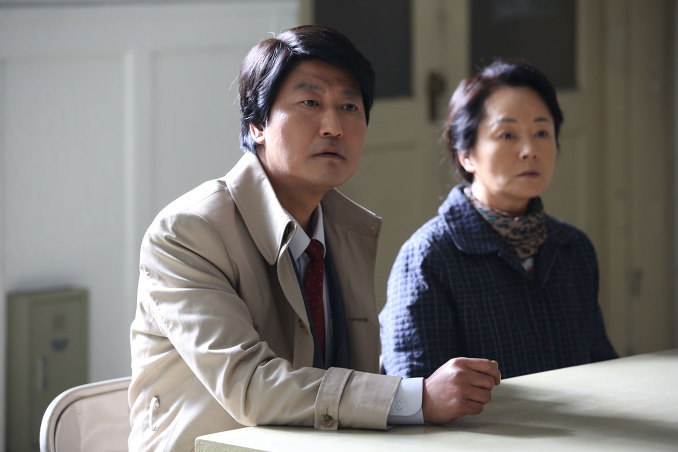 In the 12 months since the last edition of the FEFF, there have been quite a number of major box office hits. Remarkably, the top three grossing films over that period all feature the same actor. Song Kang-ho has long been recognized as one of Korean cinema's very top stars, but even he has never experienced a year like he did in 2013. The three films in which he appeared combined for an astounding 29.9 million admissions.
In the 12 months since the last edition of the FEFF, there have been quite a number of major box office hits. Remarkably, the top three grossing films over that period all feature the same actor. Song Kang-ho has long been recognized as one of Korean cinema's very top stars, but even he has never experienced a year like he did in 2013. The three films in which he appeared combined for an astounding 29.9 million admissions.
The most successful of the three was The Attorney, which opened on December 18 and ultimately sold 11.4 million tickets. Set in Busan in the early 1980s, it stars Song as a young lawyer who sets up a successful practice giving tax advice, after being shunned by the legal establishment because of his lack of a university degree. However he then gets drawn into a controversial case involving the arrest and torture of a group of students by the military government. As he faces the prospect of losing his successful career, he feels stirring within him a growing sense of idealism and purpose.
Although never stated explicitly in the film, everyone who watched it knew that it is based on the early life of Roh Moo-hyun, who would go on to be elected President of South Korea in 2002. Roh, whose efforts to introduce a progressive politics to Korean society hit many snags during his five years in office, committed suicide in May 2009. His memory continues to stir strong feelings on both sides of the political divide. The Attorney caused a sensation upon its release. Although part of this can be attributed to the way the film fits into Korea's current political climate, the strengths of the work were undeniable. First-time director Yang U-seok and co-screenwriter Yun Hyun-ho created a very solid and engaging storyline that is capped by some truly inspiring court scenes. Song Kang-ho, for his part, expresses his character's growing sense of outrage and determination with great force and control. For many Korean viewers who have fallen into despondency over the current state of Korean society and politics, the film was a bittersweet source of encouragement.
 Just three months earlier, Song had found success in a very different kind of role. The Face Reader is set in the 15th century, and it centers around the true story of the Joseon Dynasty's first major succession crisis. Although the King and the major power holders in the court are all based on real-life figures, Song plays the invented character of a fallen aristocrat who displays an unusual talent for face reading. By studying a person's facial features, he is able to divine their hidden character traits and inclinations, and in some cases their destiny. This talent of his ultimately gets him caught up in political machinations at the court.
Just three months earlier, Song had found success in a very different kind of role. The Face Reader is set in the 15th century, and it centers around the true story of the Joseon Dynasty's first major succession crisis. Although the King and the major power holders in the court are all based on real-life figures, Song plays the invented character of a fallen aristocrat who displays an unusual talent for face reading. By studying a person's facial features, he is able to divine their hidden character traits and inclinations, and in some cases their destiny. This talent of his ultimately gets him caught up in political machinations at the court.
The Face Reader marked the first major breakout hit by director Han Jae-rim, whose previous two features Rules of Dating (2005) and The Show Must Go On (2007) both have ardent fan followings. Often compared to Masquerade (2012), another massively successful period drama, The Face Reader has similar strengths in its focused storyline and talented ensemble cast, but it takes a somewhat darker turn in its second half. Released during the extended Chuseok holiday in September, the film rode positive word-of-mouth to attract 9.1 million admissions.
The remaining film in Song Kang-ho's 2013 box office triptych is a special case. In fact, there is no other film like it in the history of Korean cinema. Bong Joon-ho's Snowpiercer is a $40 million film based on a French graphic novel and shot with an international cast headlined by Chris Evans, John Hurt, Tilda Swinton, Ed Harris, Octavia Spencer, Jamie Bell... and Song Kang-ho. (Ko Ah-sung, Song's co-star in The Host, is the film's only other Korean character.) Set in a hypothetical future ice age, it centers around a rebellion on a train that holds the last remnants of humanity. Although shot on set in the Czech Republic, and featuring dialogue mostly in English, it is not a Hollywood film or even an international co-production. Produced by Park Chan-wook's Moho Films and fully financed by Korean major studio CJ E&M, the film marks the Korean film industry's most ambitious effort yet to target viewers across the globe.
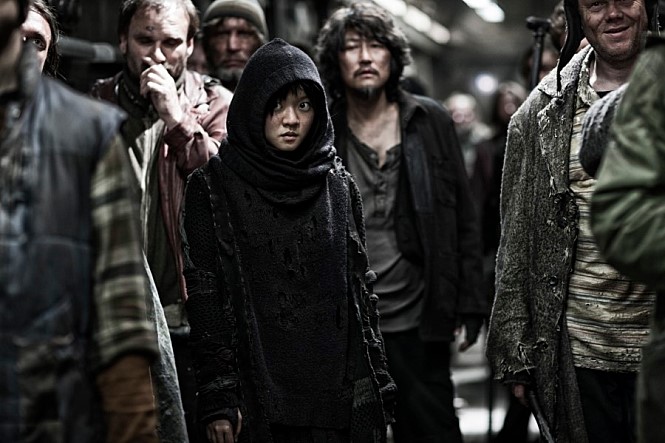 Although it opened in July to a somewhat mixed reception from Korean critics, the film became a major talking point for the general audience, and ultimately sold 9.3 million tickets. Internationally it was more widely embraced by critics but it ran into a major snag when The Weinstein Company, which had bought distribution rights to English-speaking countries, decided that the film needed 15-20 minutes of trimming. Although the idea seems ludicrous to anyone who has seen the film, a standoff developed between the company and Director Bong which delayed its release and limited its exposure on the film festival circuit. A compromise was finally reached in which the film will open uncut in the US in June of this year, but on a much smaller scale than originally intended.
Although it opened in July to a somewhat mixed reception from Korean critics, the film became a major talking point for the general audience, and ultimately sold 9.3 million tickets. Internationally it was more widely embraced by critics but it ran into a major snag when The Weinstein Company, which had bought distribution rights to English-speaking countries, decided that the film needed 15-20 minutes of trimming. Although the idea seems ludicrous to anyone who has seen the film, a standoff developed between the company and Director Bong which delayed its release and limited its exposure on the film festival circuit. A compromise was finally reached in which the film will open uncut in the US in June of this year, but on a much smaller scale than originally intended.
Snowpiercer is at the forefront of the Korean film industry's growing ambitions to target the global market. In a broad sense it was quite successful, however another big-budget release from 2013 with international ambitions offers a cautionary tale. Mr. Go was a surprisingly daring project from the moment it was announced. Based on a famous Korean manhwa (comic book) from the 1980s, the film tells the story of a gorilla from China who is taught to play baseball by a young circus trainer. When an enterprising sports agent from South Korea hears about this, he brings the two of them to Seoul and enlists Mr. Go in the Korean Baseball League.
Budgeted at over $20 million, the film was targeted simultaneously at local viewers and at the Chinese market. With 25% of its funding coming from Chinese distributor Hwayi Brothers, it stars Chinese actress Josie Xu (CJ7, Starry Starry Night) in the role of the circus trainer. But the real star of the production is the big gorilla, and the home-grown CGI wizardry that made this film possible. On a technical level the film is undeniably impressive, with the gorilla blending in seamlessly with the rest of the action. But director Kim Yong-hwa, who may have grown overconfident after smash hits Oh! Brothers (2003), 200 Pound Beauty (2006) and Take Off (2009), delivered a script devoid of emotional resonance. Although it did perform respectably in a wide release in China, it fell shockingly short of commercial expectations at home, selling only 1.3 million tickets.
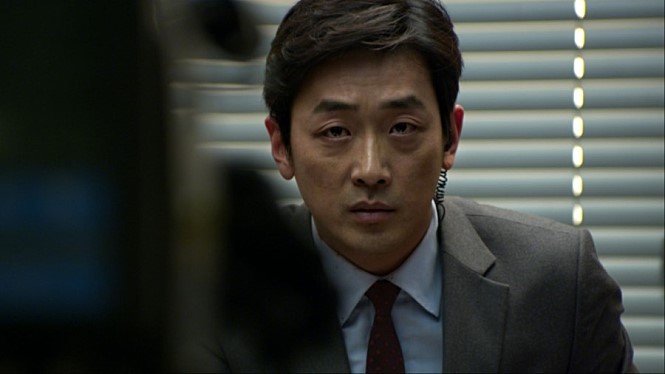 Most industry observers had expected the peak summer season to be a box office standoff between Snowpiercer and Mr. Go. But the role of challenger was unexpectedly taken up by a different film. Director Kim Byung-woo's The Terror Live, released on the same day as Snowpiercer, looks like an underdog in every respect. Although it tells the story of a mysterious terrorist who blows up one of Seoul's major bridges, the film takes place almost entirely within the space of a radio studio. With a limited budget, the film was not able to take on a star-filled cast, but the strength of its screenplay convinced the hugely respected and popular Ha Jung-woo to take the leading role. Ha remains front and center for almost the entire film, playing a demoted newscaster who suddenly finds himself conversing and negotiating with the suspected terrorist on air. The Terror Live is a textbook example of how to overcome limited resources and make a thrilling film based on tight storytelling and great acting. Its unexpectedly sharp social critique also played well with the local audience. After screening as the closing film at the 17th Puchon International Fantastic Film Festival, The Terror Live grossed a very impressive 5.6 million admissions. This marked the full commercial breakthrough of director Kim Byung-woo, who had previously directed the low-budget genre films Written (2007) and Anamorphic (2003).
Most industry observers had expected the peak summer season to be a box office standoff between Snowpiercer and Mr. Go. But the role of challenger was unexpectedly taken up by a different film. Director Kim Byung-woo's The Terror Live, released on the same day as Snowpiercer, looks like an underdog in every respect. Although it tells the story of a mysterious terrorist who blows up one of Seoul's major bridges, the film takes place almost entirely within the space of a radio studio. With a limited budget, the film was not able to take on a star-filled cast, but the strength of its screenplay convinced the hugely respected and popular Ha Jung-woo to take the leading role. Ha remains front and center for almost the entire film, playing a demoted newscaster who suddenly finds himself conversing and negotiating with the suspected terrorist on air. The Terror Live is a textbook example of how to overcome limited resources and make a thrilling film based on tight storytelling and great acting. Its unexpectedly sharp social critique also played well with the local audience. After screening as the closing film at the 17th Puchon International Fantastic Film Festival, The Terror Live grossed a very impressive 5.6 million admissions. This marked the full commercial breakthrough of director Kim Byung-woo, who had previously directed the low-budget genre films Written (2007) and Anamorphic (2003).
Meanwhile there was another summer release that, like The Terror Live, departs in interesting ways from the norms of Korean commercial cinema. Cold Eyes is a remake of Yau Nai-Hoi's 2007 Hong Kong thriller Eye in the Sky. Co-directors Cho Ui-seok and Kim Byeong-seo faced a great challenge in transposing that film, which captures so well the crowded urban spaces of Hong Kong, to the broader cityscape of Seoul. They also had to contend with the often unacknowledged fact that film remakes are extremely difficult to do well. However they were somehow able to reproduce the cold emotional palette of Hong Kong noir (which feels so unusual in a Korean film), all the while giving the story a distinctively Korean character. They also made great use of their actors, casting against type and avoiding stereotypes to create highly believable characters. Audiences were impressed with the result, buying up 5.5 million tickets.
It is somewhat reassuring to note that in 2013, many of the highest grossing films were well-made and seemed to be trying something new. Of course, that can't be said for all of the year's hit films (the groan-inducing Secretly Greatly's 7 million admissions seem to derive entirely from the star power of lead actor Kim Soo-hyun).
 Among the many mid-budgeted films that were released, there were many formulaic stories and needlessly inflated running times. But there was the occasional pleasant surprise. Very Ordinary Couple, by debut director Roh Deok, was one such film. A relationship drama filled with humor and sadness (but not what you'd call a romantic comedy), the film opens with a painful breakup and depicts our two leads' efforts to be happy on their own, before inevitably they feel drawn back towards each other. With sensitive performances by Kim Min-hee and Lee Min-gi, the film brings a much-needed freshness and a sense of realism to Korean commercial cinema. Given the strong commercial pressures and creative restraints placed on first-time directors, the success of this work is notable.
Among the many mid-budgeted films that were released, there were many formulaic stories and needlessly inflated running times. But there was the occasional pleasant surprise. Very Ordinary Couple, by debut director Roh Deok, was one such film. A relationship drama filled with humor and sadness (but not what you'd call a romantic comedy), the film opens with a painful breakup and depicts our two leads' efforts to be happy on their own, before inevitably they feel drawn back towards each other. With sensitive performances by Kim Min-hee and Lee Min-gi, the film brings a much-needed freshness and a sense of realism to Korean commercial cinema. Given the strong commercial pressures and creative restraints placed on first-time directors, the success of this work is notable.
Another pleasant surprise was the film Hope, by director Lee Joon-ik (King and the Clown, The Happy Life). Many viewers expressed strong feelings against this work even before it was even released, as it is based on a hugely upsetting true story of the brutal assault and rape of an elementary school girl. Yet when the film did finally reach theaters, it unexpectedly won audiences over by downplaying the violence and sensational elements of the story, and focusing instead on the family and the community's efforts to come together. In November it was named Best Picture at the Blue Dragon Film Awards, one of Korea's top two awards ceremonies. Meanwhile Korean independent and low-budget films continue to display a great deal of creativity and accomplishment, although they struggle to attract viewers in a market dominated by the major distributors. More than 60 low-budget feature films and over 20 documentaries received a theatrical release in 2013, mostly in theaters specializing in arthouse and independent cinema. These works comprised a diversity of styles including The Fake, a harrowing animated feature about a man who sets up a church in order to swindle the residents of a rural town; Jiseul, a grimly humorous black-and-white feature about a real-life massacre of civilians on Jeju Island in 1948; Rough Play, a film produced by Kim Ki-duk about the dramatic rise and fall of a popular actor; Pluto, which depicts the overbearing atmosphere at a highly competitive Korean high school; and Ingtoogi: The Battle of Internet Trolls, about competitors in an online game whose rivalry spills over into the real world.
As for documentaries, the subject matter taken on by Korean directors continues to grow more diverse. Politics (Cheonan Ship Project), Buddhism (On the Road), shamanism (Silk Flower), multiculturalism (Hello! Orchestra), boxing (The Ring of Life), fashion (Nora Noh), architecture (City: Hall), all-female theater troupes (The Girl Princes), and penniless film students (Lazy Hitchhikers' Tour de Europe) all formed the basis of thought-provoking and entertaining films. Korean documentaries have never been so varied, and so interesting.
Industry observers often fret about Korean cinema's entrenched power imbalances, and the many limits on creativity directors must face if they hope to reach a wide audience. But two continuing reasons for optimism are the vast pool of talent which the industry can draw on (roughly 1000 short films are made in Korea each year by film students and independent directors), and the degree to which cinema plays a central role in social life in South Korea. Going to the movie theater and talking about recent films has become an entrenched part of daily life not only for the young, but increasingly for families, middle-aged and older viewers. Thanks to expanding demographics, the local audience continues to grow. In this sense, perhaps the bubble really can just keep getting bigger, at least for a few more years.
The Boom is Back: South Korean Cinema in 2012
The boom is back in Korean cinema. With a record-breaking year at the box office, the Korean film industry is currently enjoying the same kind of runaway success that it did back in 2005-2006, when hits like King and the Clown and The Host gave domestic films more than 60% of the local market. In 2012, domestic films sold 114.6 million tickets, the first time ever that Korean cinema topped the 100 million mark. All year long, both midsized and large scale films outperformed expectations thanks to positive word-of-mouth and heightened audience interest. Overall admissions including imported films amounted to 195 million, up 22% on the previous year, and Korean cinema's share of the box office was an impressive 58.8%.
Of course, this is not to say that everyone in the industry was popping champagne corks. The string of massive hits over the past 12 months was a pleasant surprise for many industry insiders, but the general mood remains level-headed. There is also continued concern over inequalities and polarities in the market that seem to be growing more severe. Critics fret that a corporate mentality is influencing the filmmaking process to a greater extent than ever before.
Nonetheless, with the crisis of 2007-2008 fading into memory, the Korean film industry has restored its reputation at home. Investors enjoyed higher profits last year than they have in a decade: a report by the Korean Film Council estimated that the industry as a whole turned a 13% profit. Excluding low-budget works, the 70 commercial films released in 2012 earned on average about $5 million each in theatrical revenues. No less than 12 films reaped profits of at least 100%.
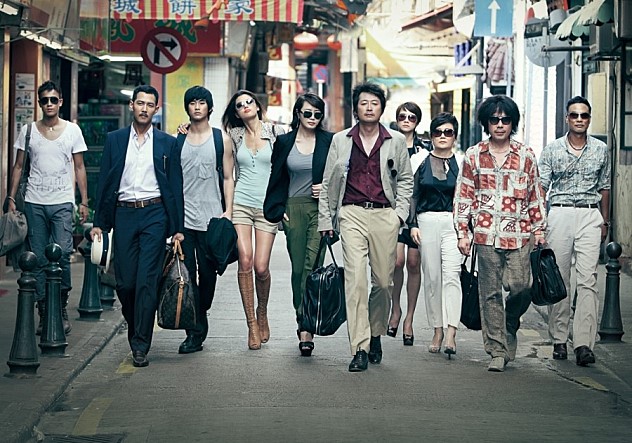 Among the top 10 grossing titles in 2012, seven were Korean films. This includes Choi Dong-hoon's caper movie The Thieves, whose 13.1 million admissions just barely eclipsed Bong Joon-ho's The Host (2006) to become the best-selling Korean film in history. (James Cameron's Avatar retains the all-time crown with 13.4 million admissions. If you think there are no feelings of rivalry on the part of Choi, whose previous film Woochi opened a week after Avatar, take note of the name of the puppy in The Thieves.) A glitzy heist film in the spirit of Ocean's Eleven, The Thieves tells the story of a group of elite Korean crooks who team up with a similarly skilled crew from Hong Kong in order to rob a diamond from a Macau casino. Audiences were dazzled in part by the star-filled cast, which included Gianna Jun (aka Jun Ji-hyun, The Berlin File), Kim Yun-seok (Punch), Kim Hye-soo (Tazza: The High Rollers), Lee Jung-jae (New World), and rising heartthrob Kim Soo-hyun, in addition to Hong Kong stars Simon Yam, Angelica Lee, and Derek Tsang. Director Choi Dong-hoon also deserves much of the credit for infusing the film with his trademark wit and upbeat tempo, making it one of the most unabashedly fun viewing experiences of the summer.
Among the top 10 grossing titles in 2012, seven were Korean films. This includes Choi Dong-hoon's caper movie The Thieves, whose 13.1 million admissions just barely eclipsed Bong Joon-ho's The Host (2006) to become the best-selling Korean film in history. (James Cameron's Avatar retains the all-time crown with 13.4 million admissions. If you think there are no feelings of rivalry on the part of Choi, whose previous film Woochi opened a week after Avatar, take note of the name of the puppy in The Thieves.) A glitzy heist film in the spirit of Ocean's Eleven, The Thieves tells the story of a group of elite Korean crooks who team up with a similarly skilled crew from Hong Kong in order to rob a diamond from a Macau casino. Audiences were dazzled in part by the star-filled cast, which included Gianna Jun (aka Jun Ji-hyun, The Berlin File), Kim Yun-seok (Punch), Kim Hye-soo (Tazza: The High Rollers), Lee Jung-jae (New World), and rising heartthrob Kim Soo-hyun, in addition to Hong Kong stars Simon Yam, Angelica Lee, and Derek Tsang. Director Choi Dong-hoon also deserves much of the credit for infusing the film with his trademark wit and upbeat tempo, making it one of the most unabashedly fun viewing experiences of the summer.
Ranking at #2 for the year was Choo Chang-min's Masquerade, sort of a Joseon Dynasty-era version of Dave in which popular star Lee Byung-hun (G.I. Joe) plays a dual role as the king, and a jester who is asked to impersonate him. Released ahead of the the Chuseok (autumn harvest) holiday in September, Masquerade smashed past the 10 million admissions mark and remained in theaters well into December, ultimately passing King and the Clown to become the third-best-selling Korean film ever with 12.3 million tickets sold.
Also earning massive returns was an unusual film titled A Werewolf Boy. Set primarily in the 1960s, it tells the story of a young woman who moves with her family to the countryside, where she encounters a strange young man who seems to have grown up wild, unable to speak. She and her family first assumes that he is an orphan from the Korean War, but as time passes and they befriend him, the mystery surrounding him deepens. Director Jo Sung-hee originally made his name in independent film, directing a highly praised short Don't Step Out Of the House (2008) that screened in Cannes, and then making his feature debut with the austere, low-budget End of Animal (2010). A Werewolf Boy is undeniably mainstream in its orientation, but its uncommon fusion of various genre elements and moods is unique. Helped along in part by the star power of young actor Song Joong-ki (Penny Pinchers) and the solid acting of Park Bo-young (Scandal Makers), the film sold more than 7 million tickets, ranking just behind The Avengers.
The success of some of the other films that placed in the year's box office top 10 came as a surprise to many observers. Period comedy The Grand Heist starring Cha Tae-hyun (Scandal Makers) didn't offer very much new to the genre, and it received only a so-so rating from viewers on the internet, but it nonetheless managed to sell 4.9 million tickets during the peak summer months. Deranged, about a nasty parasite that threatens to kill millions of people, received similarly unenthusiastic marks from critics and many ordinary viewers upon its release in July, but it nonetheless grossed 4.5 million tickets.
 In contrast, relationship comedy All about My Wife, which ranked at #9 with 4.6 million admissions, was broadly praised for its smart acting and crisp direction by Min Kyu-dong (All for Love, Memento Mori). A remake of an Argentinian comedy titled A Boyfriend for My Wife, the film centers on a man (Lee Seon-gyun, Nobody's Daughter Haewon) who is driven to distraction by the incessant attention and prodding of his sharp-tongued wife (Lim Soo-jung, I'm a Cyborg but That's Okay). When he accidentally comes into contact with a legendary Casanova figure (a show stealing performance by Ryu Seung-ryong, The Front Line), he offers the man money to seduce his wife and provide grounds for a divorce. Warmly embraced by viewers, the mid-budgeted film vastly exceeded commercial expectations.
In contrast, relationship comedy All about My Wife, which ranked at #9 with 4.6 million admissions, was broadly praised for its smart acting and crisp direction by Min Kyu-dong (All for Love, Memento Mori). A remake of an Argentinian comedy titled A Boyfriend for My Wife, the film centers on a man (Lee Seon-gyun, Nobody's Daughter Haewon) who is driven to distraction by the incessant attention and prodding of his sharp-tongued wife (Lim Soo-jung, I'm a Cyborg but That's Okay). When he accidentally comes into contact with a legendary Casanova figure (a show stealing performance by Ryu Seung-ryong, The Front Line), he offers the man money to seduce his wife and provide grounds for a divorce. Warmly embraced by viewers, the mid-budgeted film vastly exceeded commercial expectations.
Early 2013 also provided its share of big hit films. One example was the gangster noir New World from Park Hoon-jung, who was previously best known as the screenwriter for Ryoo Seung-wan's The Unjust (2010) and Kim Jee-woon's I Saw the Devil (2010). Inspired by the broad reach and dispassionate gaze of films like The Godfather and Infernal Affairs, Park set out to create a new kind of Korean gangster film that would focus not so much on individual characters, but on the power relationships that exist within a powerful crime syndicate and the police force. With a great cast headed by Lee Jung-jae (The Thieves), Choi Min-sik (Oldboy) and Hwang Jeong-min (The Unjust), New World racked up more than 3 million admissions in late February and early March.
Meanwhile the biggest hit of all was a sentimental drama titled Miracle in Cell No. 7, whose runaway commercial success left many observers' mouths (including this author's) hanging open. Inspired in part by Sean Penn vehicle I Am Sam, the film tells the story of a man (Ryu Seung-ryong) with the mental capabilities of a child who is wrongly imprisoned and sentenced to death. His cellmates, coming to his support, manage to smuggle his young daughter into the cell so that they can be reunited. Despite massive plot holes and a blatantly manipulative script, the film rode the strong performances of its actors to surge past 10 million admissions. At the time of this writing, it was unclear whether the film would challenge The Thieves for the all-time local box office crown.
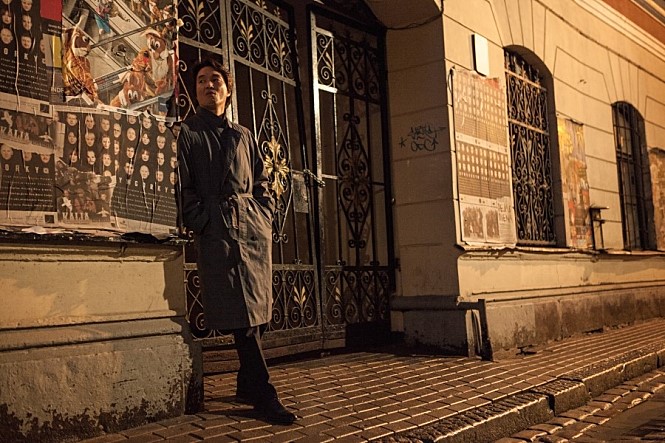 Released just a week later on January 30, Ryoo Seung-wan's blockbuster The Berlin File recorded over 7 million admissions to become the best-selling Korean action film of all time. Set and partly shot in Berlin, the film centers around a North Korean spy (Ha Jung-woo, The Yellow Sea) whose life is turned upside down when his wife (Gianna Jun, The Thieves) is accused of leaking secrets. Also starring Han Suk-kyu as a South Korean intelligence agent and the talented Ryoo Seung-beom as an operative sent in from Pyongyang, the film combines a complex web of intrigue with highly ambitious action set pieces. With the largest budget of any work in Ryoo Seung-wan's filmography, The Berlin File has become his biggest commercial hit to date.
Released just a week later on January 30, Ryoo Seung-wan's blockbuster The Berlin File recorded over 7 million admissions to become the best-selling Korean action film of all time. Set and partly shot in Berlin, the film centers around a North Korean spy (Ha Jung-woo, The Yellow Sea) whose life is turned upside down when his wife (Gianna Jun, The Thieves) is accused of leaking secrets. Also starring Han Suk-kyu as a South Korean intelligence agent and the talented Ryoo Seung-beom as an operative sent in from Pyongyang, the film combines a complex web of intrigue with highly ambitious action set pieces. With the largest budget of any work in Ryoo Seung-wan's filmography, The Berlin File has become his biggest commercial hit to date.
With the success of The Thieves, The Berlin File and firefighting extravaganza The Tower, which accumulated roughly 5 million admissions after being released on Christmas, the Korean blockbuster has taken significant steps towards repairing its tarnished reputation. In 2011, midsized films dominated the box office while the spectacular failure of effects driven, big-budget genre films My Way and Sector 7 cut deep into investors' profits. However the blockbusters of the past year have been more successful in building engaging stories in which to place their impressive special effects, and this surely helped them at the box office. Not all big-budget genre films in 2012 proved a success: Soar into the Sun aka R2B, a Top Gun inspired film starring pop singer Rain as a fighter jet pilot, bombed miserably upon its release in August. But whereas a year ago, the Korean blockbuster was looking like an endangered species, its future now seems assured.
The big hits of 2012 and early 2013 generated vast amounts of hype and press coverage, so that you'd have to be a true recluse living in Korea not to have heard of them. However amidst the media blitz, some other well-crafted genre films had a hard time getting the attention they deserved. Two prime examples of overlooked gems, in this author's opinion, are the romantic comedy How to Use Guys with Secret Tips, released as The Berlin File and Miracle in Cell No. 7 were dominating the box office; and the comic occult thriller Ghost Sweepers, released at the height of Masquerade's popularity.
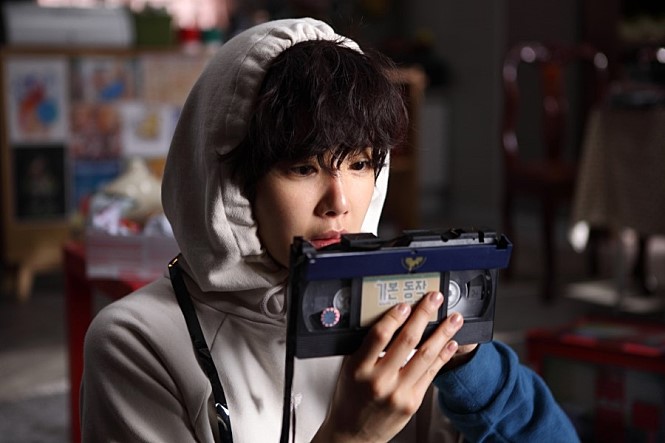 Korean romantic comedies tend to be hit or miss, but How to Use Guys with Secret Tips is one of the funniest and most charming examples of the genre in recent years. Lee Si-young, who is not only a rising actress but also an amateur boxer, plays a disgruntled assistant director whose life is going nowhere until she discovers a mysterious instructional video, "How to Use Men." Armed with new knowledge, she sees her career suddenly start to take off. Thanks to its many creative and hilarious details, and its perfect timing, the film is a true pleasure to watch. Unfortunately, however, not many people did watch it: its total audience amounted to just 500,000.
Korean romantic comedies tend to be hit or miss, but How to Use Guys with Secret Tips is one of the funniest and most charming examples of the genre in recent years. Lee Si-young, who is not only a rising actress but also an amateur boxer, plays a disgruntled assistant director whose life is going nowhere until she discovers a mysterious instructional video, "How to Use Men." Armed with new knowledge, she sees her career suddenly start to take off. Thanks to its many creative and hilarious details, and its perfect timing, the film is a true pleasure to watch. Unfortunately, however, not many people did watch it: its total audience amounted to just 500,000.
Ghost Sweepers is the latest film from director Shin Jung-won, who has established a unique comic/horror style in his previous works To Catch a Virgin Ghost (2004) and Chaw (2008). The plot involves a strange seaside village possessed by an unusually powerful spiritual force. All of Korea's most talented mystics, shamans, and exorcists charter a bus and set off to fix the problem, but it turns out to be much more of a challenge than any of them expect. The end result is both funny and gripping, but the film fell a bit short of 1 million admissions, which by today's standards is a commercial failure. One hopes that this won't negatively affect Shin's future projects.
Commercial expectations for mainstream films run pretty high, but large numbers of directors working in Korea set themselves much more modest goals. Last year, alongside the 70 commercial films released in theaters were 104 low-budget features. Although they may have played on only a few screens, many of these works represent creative high points of Korean cinema's output. Screenings and accolades at film festivals help to raise some awareness of these films, but directors also look forward to the opportunity to have their works released in Korean theaters and seen by local audiences. The obstacles to reaching a decent sized audience are high, but the existence of specialized chains and independent art-house theaters at least ensure that smaller films are released. In this sector of the film industry, 10,000 admissions is considered a decent performance.
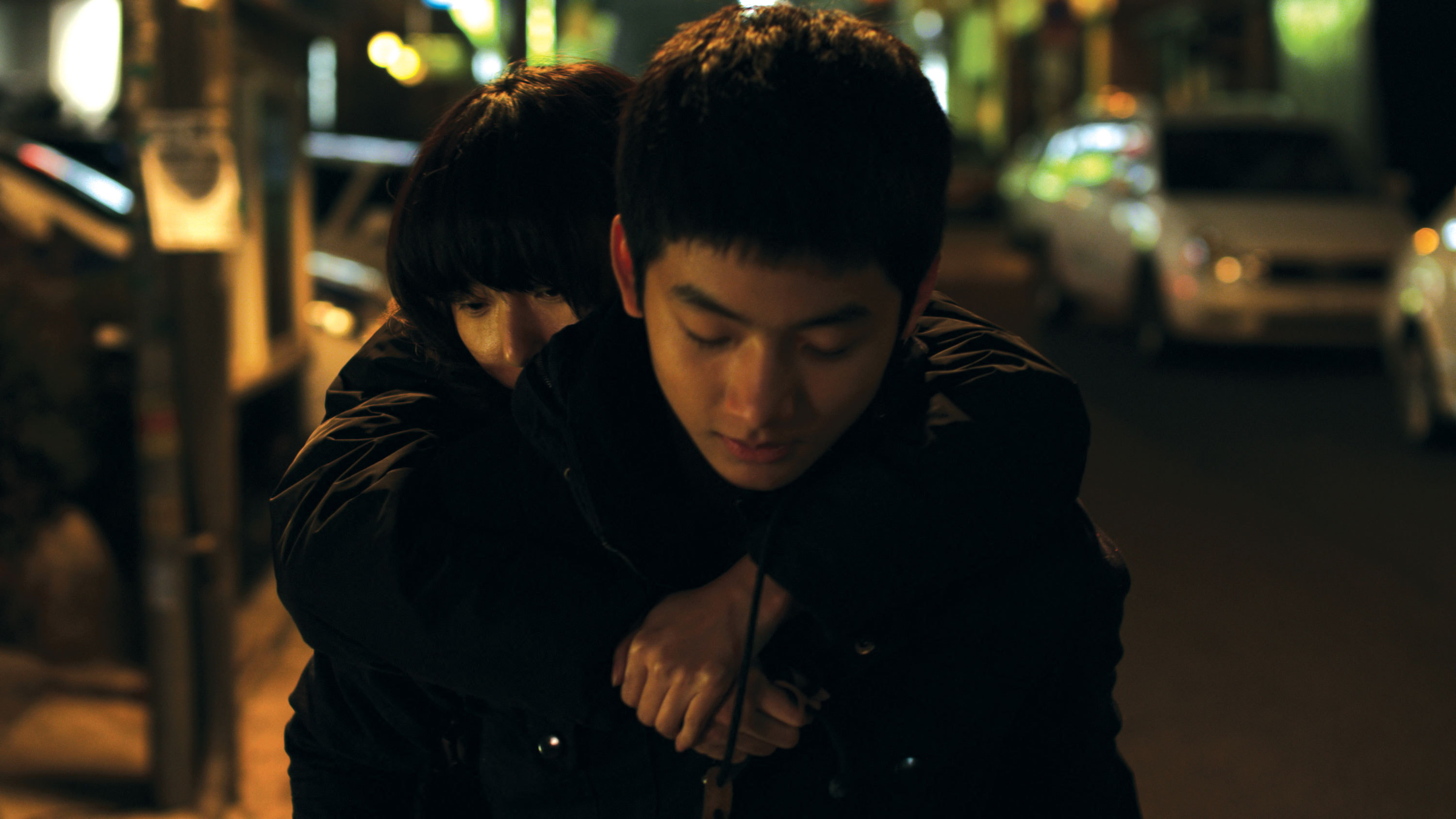 Kang Yi-kwan's Juvenile Offender is one such film that first received awards from abroad before opening in Korea in November. At the Tokyo International Film Festival, the teenage Seo Young-joo was presented with the Best Acting award, and the film as a whole received the Special Jury prize. Seo plays a high school student sent to a juvenile detention center, where he feels his chances of leading a normal life start to slip away. However fate has a surprise lined up for him in the shape of his long-lost mother. Told in a concise but heartbreaking manner, the film features great acting and a story that leaves much the viewer with much to think about.
Kang Yi-kwan's Juvenile Offender is one such film that first received awards from abroad before opening in Korea in November. At the Tokyo International Film Festival, the teenage Seo Young-joo was presented with the Best Acting award, and the film as a whole received the Special Jury prize. Seo plays a high school student sent to a juvenile detention center, where he feels his chances of leading a normal life start to slip away. However fate has a surprise lined up for him in the shape of his long-lost mother. Told in a concise but heartbreaking manner, the film features great acting and a story that leaves much the viewer with much to think about.
The Winter of the Year Was Warm, by producer-turned-director David Cho, features an everyday setting and a calm, reflective pace that could not have been reproduced in a mainstream film for commercial reasons. And yet, the warm emotions of this film have an appeal that is rare in cinema of any type. Although vaguely romantic in tone, the film is not about a romantic relationship. It is about a practical arrangement between a film director living in Seoul and a nurse in the seaside city of Gangneung to share their apartments on weekends. Although it sounds very unengaging, the great acting and subtle direction pull you in to these characters' lives.
The two films described above received great reviews but had to be satisfied with a very limited release. However the low-budget film National Security received a bigger boost, thanks to the fact that director Chung Ji-young's previous feature Unbowed (which screened at FEFF in 2012) was a surprise breakout hit. Using many of the same actors, Chung decided to film a tribute to the renowned democracy activist Kim Geun-tae, who was arrested and brutally tortured over a period of 22 days in 1985. Although undeniably difficult to watch, National Security was described by many critics as a triumph, and it was one of the most talked about premieres at the 2012 Busan International Film Festival.
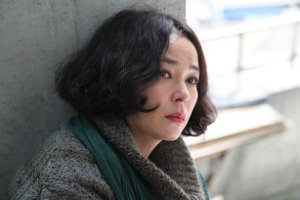 However the low-budget feature that made the biggest impact in 2012 was Kim Ki-duk's Pieta, which in August became the first Korean film ever to win the Golden Lion in Venice. Simultaneously gruesome and visually compelling, Pieta was hailed by its supporters as one of Kim's best films. It was also uncharacteristically embraced by Korean viewers, who in the past have often found Kim's work to be too alienating or disturbing. As the film's box office score passed 600,000, which for a low-budget film of its type was quite extraordinary, Kim announced that he would pull the film from theaters in order to give other low-budget works more access to the nation's screens.
However the low-budget feature that made the biggest impact in 2012 was Kim Ki-duk's Pieta, which in August became the first Korean film ever to win the Golden Lion in Venice. Simultaneously gruesome and visually compelling, Pieta was hailed by its supporters as one of Kim's best films. It was also uncharacteristically embraced by Korean viewers, who in the past have often found Kim's work to be too alienating or disturbing. As the film's box office score passed 600,000, which for a low-budget film of its type was quite extraordinary, Kim announced that he would pull the film from theaters in order to give other low-budget works more access to the nation's screens.
So 2012 was a year in which both big commercial hits and small independent films made their presence felt. However economic forces seem to be pushing both ends of the Korean film industry further apart. One issue of concern among critics is that it's becoming more rare for bigger budget films to take risks and push the envelope in an aesthetic sense. It's also becoming more difficult for arthouse directors like Lee Chang-dong or Im Kwon-taek to make the kind of high quality, mid-budgeted films that they used to make. With arthouse directors being pushed into the ultra low-budget sector, it's probably not economically possible in Korea to make films like Amour or A Royal Affair. At the opposite end, low-budget genre film - which thrives in Japan - has yet to find a foothold in Korea. Although the Puchon International Fantastic Film Festival (PiFan) does its best to provide a showcase for such works, the lack of a decent-sized audience in this specialty market is keeping them back.
Meanwhile, as Korea looks ahead to the remainder of 2013, one film looms in particular. Bong Joon-ho's Snowpiercer can fairly be described as the most ambitious Korean movie ever made. Based on a French comic book, the dystopian work features an international cast of well-known actors together with Song Kang-ho and Ko A-sung from The Host. Its $40 million budget is the most expensive ever for Korean film, but by February distributor CJ E&M had already earned back more than half of this through international sales. Given the director's track record (Memories of Murder, The Host, Mother), expectations are sky high. But this work will also answer the question of whether it is possible for an English-language Korean film to leave a real impact on the international market. Bong's compatriots Park Chan-wook (Stoker) and Kim Jee-woon (The Last Stand) have recently shot films in Hollywood, but Snowpiercer was entirely financed and developed in Korea. (Although shot in the Czech Republic, it was produced by Park Chan-wook's Moho Films, financed by CJ E&M, and is not an international co-production) The ultimate fate of Snowpiercer is sure to have repercussions for ambitious, big-budget Korean films.
Soul Searching: South Korean Cinema in 2011
South Korean industry figures and journalists are famous for drawing bad conclusions in the face of good statistics. In 2006, when local films captured 64% of the box office and The Host was setting new box office records, commentators could speak of nothing but impending doom. This may strike observers from other countries as odd, but you could view such behavior as one of the Korean film industry's strengths. Complacency is rare, and there is always much discussion about what is wrong -- even if there is not always consensus about how to fix it. At any rate, the pessimists proved to be correct in 2006, as the following year Korean cinema entered into a profound slump.
There has been a similar dynamic at work in 2011, which on paper has been the best year since 2006. The numbers are rosy: according to the Korean Film Council, 150 Korean films were released in theaters, and they managed to capture 52% of the overall box office. Total admissions for both local and imported films combined was the highest in the modern era, with 159.8 million tickets sold, the equivalent of $1.12 billion. Although no film managed to sell more than 10 million tickets -- the level of a mega-blockbuster -- two Korean films (Sunny and War of the Arrows) passed the 7 million admissions mark, one (Punch) passed the 5 million admissions mark, and two more (Silenced and Detective K) broke through the 4 million admissions mark. A total of 24 Korean films managed to sell at least 1 million tickets.
Nonetheless, there has been plenty of hand wringing in the past year, with several issues weighing heavy on the minds of producers and investors -- not to mention critics. Most prominently, this year has seen the spectacular failure of some supremely expensive would-be blockbusters. In fact, despite the commercial successes listed above, 2011 will probably be best remembered as the year of the failed blockbuster. It began in the summer season, with four big-budget Korean genre films lined up to take advantage of the lucrative summer vacation period which lasts from mid-July to the end of August.
 July 20 saw the release of the motorcycle action film Quick and Korean War movie The Front Line. Quick, which devoted much of its hefty budget to creating spectacular car chases and outlandish pyrotechnics, undershot expectations but was not a total failure with 3.13 million admissions recorded. As a commercial product it was highly uneven, but some memorable scenes and well-placed humor helped to generate decent word-of-mouth. Meanwhile the ambitious war movie The Front Line by up-and-coming director Jang Hun (Secret Reunion) grossed a similar amount with 2.95 million admissions. Investors in the big-budget film must have been somewhat disappointed, but reviews were positive, viewer ratings were decent and the film ended up carrying home some high-profile prizes at various end of the year awards ceremonies. It was also chosen by a committee to be Korea's submission for the best foreign language film category of the 2012 Oscars, but ultimately it did not make the shortlist. The film is technically quite accomplished, and it also features strong acting from its ensemble cast. In particular, newcomer Lee Je-hoon, who dazzled critics in his debut work Bleak Night (2010), picked up numerous awards for his portrayal of a drug-addicted young soldier.
July 20 saw the release of the motorcycle action film Quick and Korean War movie The Front Line. Quick, which devoted much of its hefty budget to creating spectacular car chases and outlandish pyrotechnics, undershot expectations but was not a total failure with 3.13 million admissions recorded. As a commercial product it was highly uneven, but some memorable scenes and well-placed humor helped to generate decent word-of-mouth. Meanwhile the ambitious war movie The Front Line by up-and-coming director Jang Hun (Secret Reunion) grossed a similar amount with 2.95 million admissions. Investors in the big-budget film must have been somewhat disappointed, but reviews were positive, viewer ratings were decent and the film ended up carrying home some high-profile prizes at various end of the year awards ceremonies. It was also chosen by a committee to be Korea's submission for the best foreign language film category of the 2012 Oscars, but ultimately it did not make the shortlist. The film is technically quite accomplished, and it also features strong acting from its ensemble cast. In particular, newcomer Lee Je-hoon, who dazzled critics in his debut work Bleak Night (2010), picked up numerous awards for his portrayal of a drug-addicted young soldier.
More spectacularly, the most highly anticipated and expensive film of the summer, 3-D monster movie Sector 7, proved to be a box office disaster. The story of workers on a deep sea oil rig who come into contact with a hostile sea creature, Sector 7 had been expected to earn massive returns. It came from the same production company that had been so successful with the effects-heavy disaster movie Haeundae in 2009. Sector 7 did open at #1 on August 4, but scathing reviews from critics and widespread ridicule from general audiences sunk its long-term chances at the box office. Despite the best efforts of Korea's leading distributor CJ E&M, the film starring Ha Ji-won and Ahn Sung-ki ultimately sold only 2.24 million tickets.
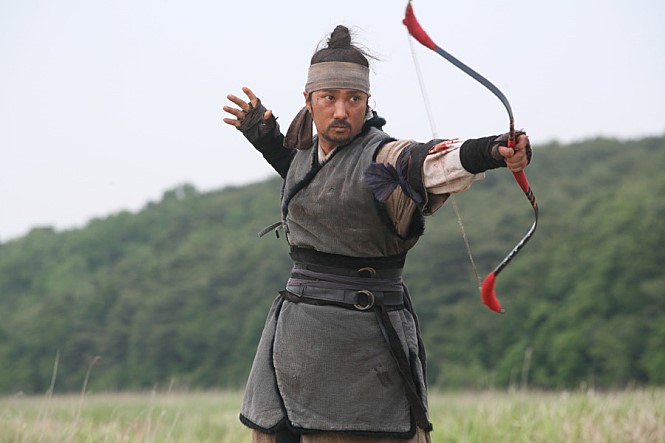 Only one blockbuster-sized production ended up truly connecting with audiences over the summer months. The War of Arrows, directed by Kim Han-min and starring Park Hae-il, is an ambitiously conceived period action film about a skilled archer trying to save his sister and her fiance from an invading Manchu army. Praised by viewers for its fast pacing and combat sequences, the film sold 7.46 million tickets to become the highest grossing Korean film of 2011, trailing behind only Transformers: Dark of the Moon, which took 7.79 million admissions. In particular, the way the film highlighted the bow and arrow as a lethal and precise weapon struck viewers as refreshingly new.
Only one blockbuster-sized production ended up truly connecting with audiences over the summer months. The War of Arrows, directed by Kim Han-min and starring Park Hae-il, is an ambitiously conceived period action film about a skilled archer trying to save his sister and her fiance from an invading Manchu army. Praised by viewers for its fast pacing and combat sequences, the film sold 7.46 million tickets to become the highest grossing Korean film of 2011, trailing behind only Transformers: Dark of the Moon, which took 7.79 million admissions. In particular, the way the film highlighted the bow and arrow as a lethal and precise weapon struck viewers as refreshingly new.
The major releases of the summer season had only scored 1 out of 4, but commentators were confident that the one massive genre project lined up for the winter season would restore faith in the Korean blockbuster. My Way was directed by Kang Je-gyu, whose unblemished box office record to date included the groundbreaking Gingko Bed in 1996, the legendary smash hit Shiri from 1999 which easily surpassed all previous box office records with 6 million+ admissions, and the Korean War film Tae Guk Gi from 2004 which broke records again with more than 11 million admissions. My Way was loosely based on the true story of a Korean man who, during World War II, was enlisted into the Japanese army, but subsequently captured by the Soviets, the Nazis, and finally by the Allied soldiers on Normandy beach. Heartthrob Jang Dong-gun played the lead role, together with Japanese actor Odagiri Joe who portrayed a Japanese soldier who undertakes the same journey. On paper, all the elements for a box office hit seemed to be in place, and Kang upped the ante with a massive $30 million budget that dwarfed that of any other previous Korean film except for D-War. However when it finally opened in late December, viewers found the long journey tedious rather than thrilling, and poor word-of-mouth quickly killed the film's box office chances. Ultimately it sold only 2.14 million tickets, even less than Sector 7.
The staggering losses incurred by Korean blockbusters in 2011 were a problem in itself. But this also led to a round of soul-searching in terms of Korea's system for developing and producing mainstream films. One side effect of the bubble of 2005-2006 and the industry-wide slump of 2007-2008 was that many independent producers lost a great deal of their power and influence. At the same time, major conglomerates such as CJ, which operated powerful distribution arms and their own theater chains, began to account for a greater and greater percentage of the industry's overall production. Soon, most films were being conceived and developed not in separate production companies, but inside the major conglomerates.
As such, the degree of corporate decision making in the filmmaking process continued to expand, particularly for big-budget, high-profile productions. Whereas in the late 1990s, influential producers often took decisions based on their instincts, in the present day most decisions have to be backed up by some model of past success. When details about some conglomerates' methods of evaluating screenplays were leaked to the broader public, many in the film industry reacted angrily to the implied notion that screenplay development was more science than art. (One example included having each individual scene of a screenplay rated on a point system, with the lower scoring scenes designated for removal)
The box office results of 2011 sent a mixed message on the effectiveness of the corporate approach. The failure of the conglomerates' highest profile releases would seem to argue for a broad rethink. Nonetheless, the best grossing films of 2011 -- mostly midsized productions -- were also the product of the big distributors. Some have conjectured that producers on these lower profile films were given a somewhat freer rein, resulting in films that felt fresher in a dramatic sense. At the same time, these releases were able to benefit from the significant distribution power of the parent company.
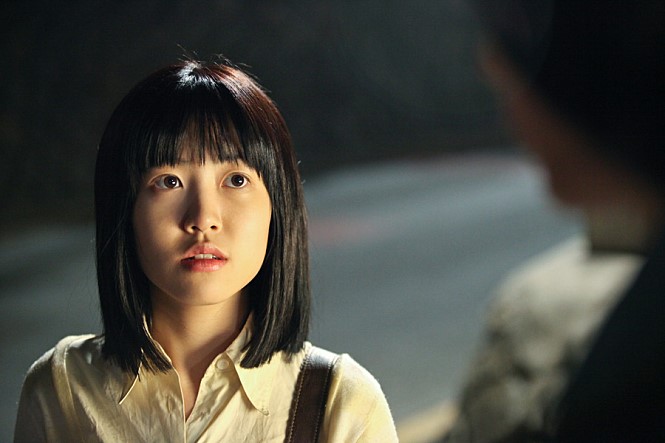 At any rate, it was mid-sized dramas and comedies that saved the Korean box office in 2011. Foremost among these was Sunny, the second film by talented up-and-coming director Kang Hyung-cheol. In the wake of his hugely successful debut film Scandal Makers from 2008 (8.3 million admissions), Kang took on a story that might seem at first glance to have limited box office appeal. A middle-aged woman feeling estranged from her husband and teenage daughter runs into her old high school friend in the hospital. After their happy reunion, they set out to reconnect with the other five members of their high school group which they called "Sunny". The film then provides an extended flashback into the 1980s. Character-centered dramas based on female friendship have found a limited degree of success in Korean film history, but such a film has never reached the blockbuster proportions of Sunny's run at the box office. The film's final tally of 7.4 million admissions was far beyond anyone's predictions, and it confirmed Kang's status as a gifted director and screenwriter who can get remarkable results out of seemingly ordinary material.
At any rate, it was mid-sized dramas and comedies that saved the Korean box office in 2011. Foremost among these was Sunny, the second film by talented up-and-coming director Kang Hyung-cheol. In the wake of his hugely successful debut film Scandal Makers from 2008 (8.3 million admissions), Kang took on a story that might seem at first glance to have limited box office appeal. A middle-aged woman feeling estranged from her husband and teenage daughter runs into her old high school friend in the hospital. After their happy reunion, they set out to reconnect with the other five members of their high school group which they called "Sunny". The film then provides an extended flashback into the 1980s. Character-centered dramas based on female friendship have found a limited degree of success in Korean film history, but such a film has never reached the blockbuster proportions of Sunny's run at the box office. The film's final tally of 7.4 million admissions was far beyond anyone's predictions, and it confirmed Kang's status as a gifted director and screenwriter who can get remarkable results out of seemingly ordinary material.
Another box office surprise was the success of Punch, the fourth film by director Lee Han who is best known for his 2002 debut work Lovers Concerto. Based on a popular novel, the film tells the story of the uneasy friendship that develops between a high school boy (Yu Ah-in) and his teacher (Kim Yun-seok), who also happens to be his next door neighbor. Initially the boy, named Wan-deuk, is bothered to distraction by the teacher, who keeps intruding into his personal life. However one day the teacher tells him that he has located the boy's mother, who ran away when he was just a baby. Wan-deuk, surprised by the news, is further shocked when he learns that his mother is from the Philippines. Viewers seemed to be particularly taken in by the acting performances in Punch, with the chemistry between rising star Yu and veteran actor Kim working particularly well. But a strong supporting cast, particularly a blustering neighbor played by Kim Sang-ho, also added much to the enjoyment of the film.
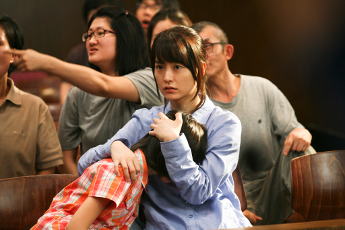 The two hit films mentioned above succeeded primarily by creating interesting, nuanced characters who could capture audiences' sympathies. However the box office performance of Hwang Dong-hyuk's Silenced tapped into broader social forces. The well-directed film is based on a shocking and heartbreaking real incident from the early 2000s in which pre-teens at a school for the deaf were sexually assaulted by school officials. The film was not the first to expose the incident -- in fact, it is based on a book written by one of Korea's best-known novelists. A controversial trial of the perpetrators received much press coverage at the time it took place. However something about the highly emotional medium of cinema, and the collective way in which the film was viewed, resulted in widespread popular outrage over the incident. Thanks in large part to the film, new laws were passed in late 2011 to provide additional protection for the disabled against sexual abuse. In this sense, the film's box office performance (4.7 million admissions) may be seen as something of a bonus, because the work's social aims were realized in such a spectacular way.
The two hit films mentioned above succeeded primarily by creating interesting, nuanced characters who could capture audiences' sympathies. However the box office performance of Hwang Dong-hyuk's Silenced tapped into broader social forces. The well-directed film is based on a shocking and heartbreaking real incident from the early 2000s in which pre-teens at a school for the deaf were sexually assaulted by school officials. The film was not the first to expose the incident -- in fact, it is based on a book written by one of Korea's best-known novelists. A controversial trial of the perpetrators received much press coverage at the time it took place. However something about the highly emotional medium of cinema, and the collective way in which the film was viewed, resulted in widespread popular outrage over the incident. Thanks in large part to the film, new laws were passed in late 2011 to provide additional protection for the disabled against sexual abuse. In this sense, the film's box office performance (4.7 million admissions) may be seen as something of a bonus, because the work's social aims were realized in such a spectacular way.
Meanwhile there were several other genre films in 2011 that, thanks to good execution and creative touches, well exceeded expectations at the box office. One example is Spellbound from debut director Hwang In-ho, a romantic comedy that incorporates some of the conventions of the horror genre. Popular star Son Ye-jin takes the lead role as a young woman who, after a near death experience, is tormented by visions of dead people. What's worse, people who become close to her also become susceptible to her visions, so she leads a solitary life until one day she crosses the path of a stage magician, played by Lee Min-gi. Benefiting from positive word-of-mouth on the internet, the film ultimately sold a highly impressive 3 million tickets.
Blind from Ahn Sang-hoon (Arang) is a thriller about a blind woman who is being pursued by a serial killer. Although not particularly original in its conception, the film succeeded thanks to an engaging performance from its lead actress Kim Ha-neul, and its ability to generate a surprising degree of suspense. The film sold 2.4 million tickets in total. Turning in an almost identical performance was The Client, a courtroom thriller centered around a murder case in which large amounts of blood -- but no body -- were found at the crime scene. The prosecution feels confident about the case, but a hot young defense attorney played by Ha Jung-woo gives his client a rousing defense. The film marked a successful transition to commercial filmmaking by director Son Young-seong, whose independent feature The Pit and the Pendulum screened at the Busan International Film Festival in 2009.
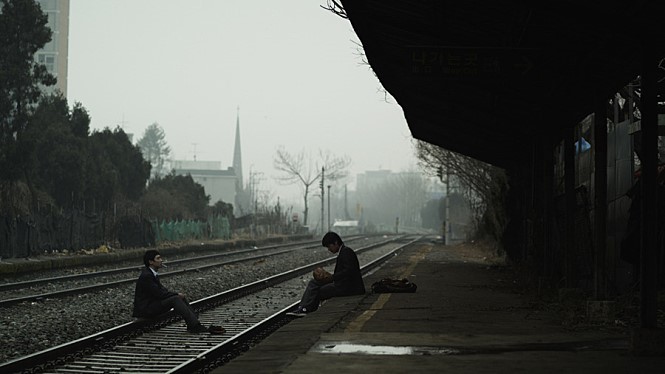 If mainstream audiences seemed broadly satisfied with the film selections of 2011, local film critics reserved stronger words of praise for the low-budget independent sector. Despite the struggles faced by film crews working on shoestring budgets, the number of independent films continues to increase year after year. In 2011, there were numerous films that attracted considerable attention without the benefit of a wide release. These included such works as The King of Pigs, a hard-hitting animated feature about school violence that was popular with younger viewers; The Journals of Musan, an impressive debut work about a North Korean defector that won more than 15 awards at international film festivals; and most of all Bleak Night (pictured), a student film that launched the career of young actor Lee Jae-hoon. While the bar for independent features is set much lower (10,000 admissions is considered the threshold for a strong commercial success), independent cinema nonetheless has been the recipient of an impressive amount of press coverage and mainstream interest in recent years.
If mainstream audiences seemed broadly satisfied with the film selections of 2011, local film critics reserved stronger words of praise for the low-budget independent sector. Despite the struggles faced by film crews working on shoestring budgets, the number of independent films continues to increase year after year. In 2011, there were numerous films that attracted considerable attention without the benefit of a wide release. These included such works as The King of Pigs, a hard-hitting animated feature about school violence that was popular with younger viewers; The Journals of Musan, an impressive debut work about a North Korean defector that won more than 15 awards at international film festivals; and most of all Bleak Night (pictured), a student film that launched the career of young actor Lee Jae-hoon. While the bar for independent features is set much lower (10,000 admissions is considered the threshold for a strong commercial success), independent cinema nonetheless has been the recipient of an impressive amount of press coverage and mainstream interest in recent years.
As for the first few months of 2012, local cinema has turned in an exceptionally strong performance. Two films released in advance of the Lunar New Year racked up highly impressive returns. Dancing Queen, a comic drama by director Lee Seok-hoon (See You after School) charmed audiences with an unusual story about a struggling human rights lawyer who is picked by a major political party to run for Seoul mayor. Meanwhile his wife, who has dreamed all her life of becoming a singer, is suddenly given the opportunity -- but given conservative attitudes about the role of politicians' wives, her husband's political career puts her dream in jeopardy. The film marked yet another success for leading distributor CJ E&M, selling upwards of 4 million tickets.
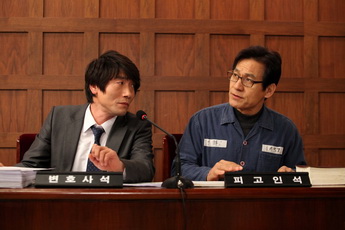 Meanwhile the success of Unbowed, based on a real-life court case, played off of a similar dynamic as the release of Silenced a few months earlier. It concerns a professor who confronted a judge with a crossbow after receiving what he felt to be a biased judgment. The film focuses on the efforts of a lawyer to defend his professor client, who appears to be the victim of further biased judgments by the court. Directed by Chung Ji-young, a major figure of 1990s Korean cinema who hadn't directed a film in over a decade, Unbowed was well received during its premiere at the 2011 Busan International Film Festival. However the low-budget work was not expected to make much of an impact at the box office. Nonetheless, the dramatic story and the timeliness of its themes turned the film's release into a social phenomenon, and it ultimately sold 3.4 million tickets.
Meanwhile the success of Unbowed, based on a real-life court case, played off of a similar dynamic as the release of Silenced a few months earlier. It concerns a professor who confronted a judge with a crossbow after receiving what he felt to be a biased judgment. The film focuses on the efforts of a lawyer to defend his professor client, who appears to be the victim of further biased judgments by the court. Directed by Chung Ji-young, a major figure of 1990s Korean cinema who hadn't directed a film in over a decade, Unbowed was well received during its premiere at the 2011 Busan International Film Festival. However the low-budget work was not expected to make much of an impact at the box office. Nonetheless, the dramatic story and the timeliness of its themes turned the film's release into a social phenomenon, and it ultimately sold 3.4 million tickets.
The biggest film of all however, was Nameless Gangster, a 1980s-set drama about a corrupt customs officer (Choi Min-sik) who discovers that he is related by blood to a powerful local gangster (Ha Jung-woo). The film then follows his rise to power as he utilizes a wide web of personal connections to further his own cause. With enthusiastic acting from the leads and an impressively authentic recreation of 1980s Busan, the film appeared likely to pass the 5 million admissions mark within a month and a half of its release. Nameless Gangster is the first commercial hit for director Yoon Jong-bin, who won awards in 2005 for his independent debut The Unforgiven (a film which helped launch the career of actor Ha Jung-woo).
The year ahead looks certain to be interesting, with a wide spectrum of high-profile films scheduled for release. Most industry commentators expect Korean cinema to continue doing well at the box office, although a couple more big-budget genre films on the horizon (Soar into the Sun, a sort of Korean Top Gun; and Tower, a sort of Korean Towering Inferno) will further test the mettle of the Korean blockbuster. Meanwhile debate continues about mainstream Korean cinema, and whether it displays enough creativity to remain successful in the long term. Regardless of how high Korean cinema's market share may rise in 2012, we can be reasonably sure that the industry's soul-searching will continue.
The New Status Quo: South Korean Cinema in 2010
After the boom (2004-2006) and the bust (2007-2008), where does Korean cinema stand? After an extended period of more or less constant change and upheaval in the film industry, the past two years have been pretty stable by comparison. And amidst this relative calm, a new status quo is emerging in the Korean film industry. The present environment may not be radically different from the situation that preceded it, but there are some important new developments that are affecting the character of the films being made. Taken as a whole, the annual output of Korean films in 2010 is noticeably different from that of 2006 or 2007.
This essay is an overview of the state of Korean cinema over the past 12 months -- but before turning to the specifics of what has taken place, it might be useful to provide a summary of how today's film industry differs from that of a few years ago. Here are, in this writer's opinion, some of the most influential developments.
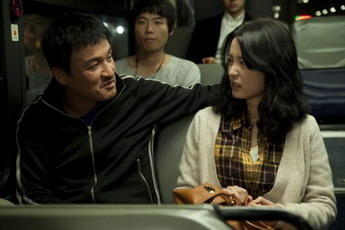 * The rise of low-budget filmmaking as a genuine second industry. In the year 2004, only three Korean films with a budget of less than 1 billion won ($900,000 at today's exchange rates) were released in theaters. Mainstream producers never really considered making films in this budget range, believing them to have no commercial potential. However in 2010, no less than 73 films of this type were released -- just over half of the 140 Korean films in total. These included a wide range of independent features, student films, political documentaries and other such specialist works. But among them were also many films aimed at mainstream audiences, such as the comedy My Dear Desperado (pictured) which rode positive word-of-mouth to sell 700,000 tickets. The expansion of the low-budget film sector has come about thanks to lower-priced, high-quality film technology, and reform to the distribution sector that has allowed for more films to receive a release. At a lower budget, directors can (at least in theory, if not always in practice) experience more creative freedom than those making expensive mainstream projects. They rely on positive word-of-mouth, rather than a wide release and an expensive marketing campaign. Therefore, even the more mainstream of the low-budget films feel noticeably different from higher-budgeted works. Given the huge number of low-budget films being produced, and their distinctive character, it now makes sense to think of them as a kind of second film industry.
* The rise of low-budget filmmaking as a genuine second industry. In the year 2004, only three Korean films with a budget of less than 1 billion won ($900,000 at today's exchange rates) were released in theaters. Mainstream producers never really considered making films in this budget range, believing them to have no commercial potential. However in 2010, no less than 73 films of this type were released -- just over half of the 140 Korean films in total. These included a wide range of independent features, student films, political documentaries and other such specialist works. But among them were also many films aimed at mainstream audiences, such as the comedy My Dear Desperado (pictured) which rode positive word-of-mouth to sell 700,000 tickets. The expansion of the low-budget film sector has come about thanks to lower-priced, high-quality film technology, and reform to the distribution sector that has allowed for more films to receive a release. At a lower budget, directors can (at least in theory, if not always in practice) experience more creative freedom than those making expensive mainstream projects. They rely on positive word-of-mouth, rather than a wide release and an expensive marketing campaign. Therefore, even the more mainstream of the low-budget films feel noticeably different from higher-budgeted works. Given the huge number of low-budget films being produced, and their distinctive character, it now makes sense to think of them as a kind of second film industry.
* Big directors going international. At the other end of the spectrum, the most famous of Korea's commercial auteurs are setting their sights on global audiences. Although at the time of this writing many details about these projects have yet to be confirmed, it appears that the next films by Park Chan-wook, Bong Joon-ho and Kim Jee-woon will all be shot mostly or exclusively in English, with high-profile international stars taking the lead roles. This may be the year when this trio emerges as a sort of Korean counterpart to Mexico's "Three Amigos" (Alfonso Cuaron, Guillermo Del Toro, and Alejandro Gonzalez Inarritu). Although it seems likely that Park, Bong, and Kim will all continue to keep one foot planted in the Korean film industry, it's still unclear how this will affect the local film sector, their future careers and general perceptions of Korean cinema.
* From star power to high-tech. These are confusing times for the Korean Wave. Although the popularity of Korean singers in other countries seems to have grown in recent years, things have arguably not gone so well for actors. These days it is no longer possible for a film with a major star to earn millions of dollars in sales to other Asian countries. Even in Korea, although stars are constantly in the news, their drawing power at the box office is in question. Many Korean stars such as Jun Ji-hyun and Lee Byung-hun have upped their profile by acting in Chinese or Hollywood films, but there have been no truly breakout performances yet. Whereas five years ago many investors and industry people were focused on star power, these days there seems to be more interest in Korea's capabilities in film technology. Notably, in 2010 South Korea earned $13.6 million in film exports (mostly to Asia and Europe), but $28.6 million in film services such as CGI rendering, post-production work or 3-D conversion (mostly for Hollywood studios). At the same time, several high-profile Korean 3-D films are in the pipeline, most notably CJ Entertainment's Sector 7, scheduled for release this summer. The Korean Film Council has also been highly proactive in supporting the development of 3-D and other film technologies. Although star-centered projects continue to be made, films based on advanced special effects (following, you might say, in the footsteps of 2009 hit Haeundae) are becoming more common.
* Legal downloads make headway. For many years, the big problem with Korean cinema's economic model was that (like Hollywood in the 1970s), a film's theatrical release accounted for almost all of its revenues. DVD, sadly, never found much of an audience in Korea, and television broadcasters have never played more than a minor role in the film industry. Therefore the success or failure of many films were dependent on major distributors and theater chains, which did not provide a particularly level playing field. Now, however, opportunities are opening up in the realm of legal downloads. A host of competing services are now operational, and while precise figures aren't available, major internet portals report surging revenues (for Daum.net, the 2010 sum was 600% that of 2009). About 95% of all new films are now being made available online in legal formats, compared to only 5% in 2008. And significantly, major web portals have adjusted their search results so that queries for film titles now turn up links to legal, rather than illegal, download sites. The typical price for a download is 3500 won ($3), less than half the price of a movie ticket, but for low-budget films especially it can provide a meaningful source of income. With revenue from pay-per-view services on IPTV (Internet protocol TV) also doubling for each of the past few years, the situation for ancillary markets looks brighter than it has in some time, and that is good news for films that rely on word-of-mouth instead of big marketing campaigns.
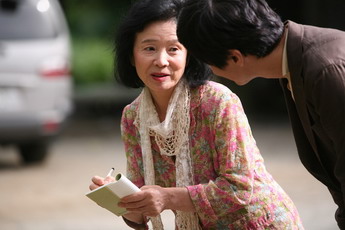 2010 will probably be remembered as neither a particularly good nor a particularly bad year. On the festival circuit, Lee Chang-dong's Poetry won the greatest accolades, taking home the best screenplay award from Cannes and receiving rave reviews from critics all around the world. Well known director Hong Sang-soo also turned out two films, with HaHaHa winning the Un Certain Regard section at Cannes and Oki's Movie screening as the closing film in the Orizzonti section at Venice. Meanwhile, maverick director Im Sang-soo directed a self-described remake (in truth, more of a re-imagining) of the 1960 classic The Housemaid, which received mixed reviews upon its premiere at Cannes, but went on to sell widely around the world.
2010 will probably be remembered as neither a particularly good nor a particularly bad year. On the festival circuit, Lee Chang-dong's Poetry won the greatest accolades, taking home the best screenplay award from Cannes and receiving rave reviews from critics all around the world. Well known director Hong Sang-soo also turned out two films, with HaHaHa winning the Un Certain Regard section at Cannes and Oki's Movie screening as the closing film in the Orizzonti section at Venice. Meanwhile, maverick director Im Sang-soo directed a self-described remake (in truth, more of a re-imagining) of the 1960 classic The Housemaid, which received mixed reviews upon its premiere at Cannes, but went on to sell widely around the world.
For more commercially-oriented films, the picture was not quite so rosy. In contrast to 2009, in which tsunami film Haeundae (11.3 million admissions) and sports drama Take Off (8.1 million) propelled the local box office, the highest grossing picture The Man from Nowhere topped out at 6.2 million tickets. The story of a former secret agent who emerges from his self-imposed isolation in order to rescue a neighbor's daughter, The Man from Nowhere was a mid-sized film that succeeded beyond expectations through positive word-of-mouth and excitement over the film's lead actor Won Bin. Star power may be on the wane in general, but this film proved to be a shining exception as Won emerged as one of the most charismatic action heroes in recent memory. Female audiences audibly swooned and gasped at Won's godlike image, while numerous action scenes and some unexpectedly graphic violence attracted male viewers.
Released in August, The Man from Nowhere easily outperformed the two blockbuster-scale projects of the summer. Korean War film 71-Into the Fire was based on the true story of a group of high school students in 1950 who were armed and left to fend for themselves against the approaching North Korean army. Although the film impressed with its pyrotechnics, critics savaged the thinly-developed characters and stereotyped plot elements, and mainstream viewers were only slightly more supportive. The film ended with 3.3 million admissions, seen as disappointing considering its $10 million+ budget. A virtually identical performance was turned in by Moss, a $7 million-budgeted adaptation of a cult Korean comic book. Directed by industry heavyweight Kang Woo-suk, the 163-minute thriller set in a remote country village was praised for its acting (Jeong Jae-young, Park Hae-il, Yu Hae-jin), but ran into narrative difficulties in its second half. The work's final box office tally was 3.4 million admissions, enough for a small profit to investors.
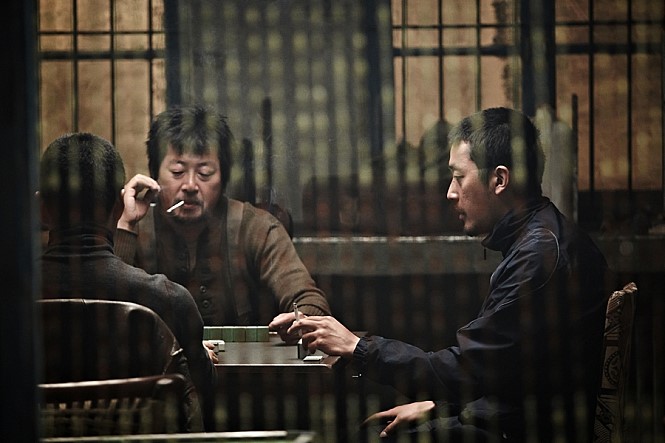 The winter season also saw two high-profile projects fail to reach expectations. The most ambitious film of 2010 was The Yellow Sea, Na Hong-jin's follow-up to his critically and commercially successful debut The Chaser (2008). Reuniting the main cast of that film, The Yellow Sea centers around an ethnic Korean man living in China (Ha Jung-woo, who won Best Actor at the Asian Film Awards for this performance) forced by circumstance to travel to Seoul to carry out a contract killing. With shooting running far beyond its original schedule and the budget (co-financed by 20th Century Fox) running to $9 million, the film ultimately grossed only 2.3 million admissions. Some viewers felt overwhelmed by the brutal nature of the film, which ran to 156 minutes. However on an artistic level The Yellow Sea is still an impressive achievement, and the director's decision to go back to the editing room and create a shorter international cut -- expected to premiere at a major festival later this year -- is cause for anticipation.
The winter season also saw two high-profile projects fail to reach expectations. The most ambitious film of 2010 was The Yellow Sea, Na Hong-jin's follow-up to his critically and commercially successful debut The Chaser (2008). Reuniting the main cast of that film, The Yellow Sea centers around an ethnic Korean man living in China (Ha Jung-woo, who won Best Actor at the Asian Film Awards for this performance) forced by circumstance to travel to Seoul to carry out a contract killing. With shooting running far beyond its original schedule and the budget (co-financed by 20th Century Fox) running to $9 million, the film ultimately grossed only 2.3 million admissions. Some viewers felt overwhelmed by the brutal nature of the film, which ran to 156 minutes. However on an artistic level The Yellow Sea is still an impressive achievement, and the director's decision to go back to the editing room and create a shorter international cut -- expected to premiere at a major festival later this year -- is cause for anticipation.
Meanwhile the other much-hyped release of the winter was a very different kind of film. Shim Hyung-rae's The Last Godfather is a English-language slapstick comedy starring the director himself that was shot in Hollywood, with Harvey Keitel taking a major role. A follow-up of sorts to his 2007 monster movie D-War (released internationally as Dragon Wars), this film featured no special effects but traded on the director's longtime screen persona (a bumbling but lovable character named Young-goo) and the cachet of having shot the film in Los Angeles (for an estimated $13 million before p&a costs). Although the release generated plenty of press coverage, the final tally of 2.6 million admissions fell well short of the film's break-even point.
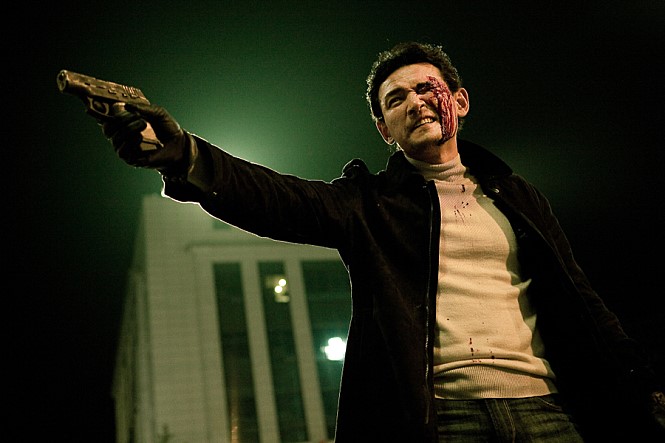 If the blockbusters of the past year went 0 for 4, other sorts of films were able to generate similar returns with smart concepts, good execution and smaller budgets. One of the undisputed critical and popular hits of 2010 was Ryoo Seung-wan's The Unjust, about a bitter showdown between a corrupt police captain and a ruthlessly ambitious prosecutor. From a director who has sometimes been pigeonholed as a genre specialist, this film presented a gripping look at the power, corruption and influence-peddling endemic to Korea's justice system. With impressive performances by Hwang Jeong-min and the director's brother Ryoo Seung-beom, The Unjust rode positive word-of-mouth to a total of 2.8 million admissions -- the director's most commercially successful film to date. Meanwhile Ryoo was also active as a producer, releasing the thriller Trouble Shooter in September. Directed by newcomer Kwon Hyeok-jae, the film about a "fixer" who takes on a job too big to handle is consistently engaging despite the familiar subject matter. It sold a total of 1.8 million tickets.
If the blockbusters of the past year went 0 for 4, other sorts of films were able to generate similar returns with smart concepts, good execution and smaller budgets. One of the undisputed critical and popular hits of 2010 was Ryoo Seung-wan's The Unjust, about a bitter showdown between a corrupt police captain and a ruthlessly ambitious prosecutor. From a director who has sometimes been pigeonholed as a genre specialist, this film presented a gripping look at the power, corruption and influence-peddling endemic to Korea's justice system. With impressive performances by Hwang Jeong-min and the director's brother Ryoo Seung-beom, The Unjust rode positive word-of-mouth to a total of 2.8 million admissions -- the director's most commercially successful film to date. Meanwhile Ryoo was also active as a producer, releasing the thriller Trouble Shooter in September. Directed by newcomer Kwon Hyeok-jae, the film about a "fixer" who takes on a job too big to handle is consistently engaging despite the familiar subject matter. It sold a total of 1.8 million tickets.
Another impressive release from the fall was romantic comedy Cyrano Agency, which grossed 2.7 million admissions. Close followers of the industry are unlikely to have been surprised by the film's success, given director Kim Hyun-seok's previous track record (When Romance Meets Destiny, YMCA Baseball Team) and the participation of respected production company Myung Film. Superbly written, the film details the activities of an informal company that promises to coach clients in winning the hearts of their ideal partner. The film also received a boost from the casting of rising star actress Lee Min-jeong.
Korea has no shortage of debut directors each year, given the vitality of the low-budget film sector, but it is less common for first-time filmmakers to make an impression at the box office. One example of this was Haunters, a creatively-imagined story about a man who can control other people merely by establishing eye contact. Director Kim Min-seok brought a strong visual component to his film, and succeeded in casting hot actor Gang Dong-won fresh off of his success in the hit film Secret Reunion from early 2010 (presented at the 12th FEFF). The film attracted an impressive 2.1 million admissions.
Another standout debut from 2010 was My Dear Desperado by Kim Kwang-sik. The film tells the story of a young woman from the country who loses her job in Seoul and moves into a cheap basement room while she struggles to find new work. Her neighbor, it turns out, is a gangster, which causes her no small degree of anxiety and trouble. The film, which had a very small budget and a modest marketing campaign, emerged as one of those rare but encouraging examples of an unknown film that slowly over time amasses a significant audience. 700,000 admissions may not seem like much compared to the other films discussed above, but for a film of this scale it qualifies as a major hit.
 The low-budget debut film Bedevilled made a smaller impression at the box office, but in some ways this was the discovery of the year. Premiering in the Critics Week section of the Cannes Film Festival, the film went on to win the top prize at the Puchon International Fantastic Film Festival, and also several major awards for lead Seo Young-hee, including best actress at the Fantasporto festival in Portugal. Set on a remote island, the film depicts the travails of a young wife who suffers unending abuse at the hands of the village men, until one day she decides to get her revenge. Supremely well executed, the film marks out Jang Chul-soo as a director to watch.
The low-budget debut film Bedevilled made a smaller impression at the box office, but in some ways this was the discovery of the year. Premiering in the Critics Week section of the Cannes Film Festival, the film went on to win the top prize at the Puchon International Fantastic Film Festival, and also several major awards for lead Seo Young-hee, including best actress at the Fantasporto festival in Portugal. Set on a remote island, the film depicts the travails of a young wife who suffers unending abuse at the hands of the village men, until one day she decides to get her revenge. Supremely well executed, the film marks out Jang Chul-soo as a director to watch.
The year 2011 opened with a mix of hopeful and troubling news. At the box office, period comedy Detective K defied all expectations by amassing 4.8 million admissions, despite a broad critical consensus that the film offered up little that was innovative or new. Casting may have been a key factor in the film's success, with lead actor Kim Myung-min (who has many fans from his work on TV) and character actor Oh Dal-soo making for a charismatic on-screen pair.
Another film that drew attention was Late Blossom, from director Chu Chang-min who scored a hit several years back with the comedy Mapado. This time around, he had seemingly handicapped himself by choosing the hard-to-market theme of two elderly couples in love as they near the end of life. Sure enough, the film opened in February and made little commercial impact at first, but the highly moving story and the accomplished performances by several well-known veteran actors pushed it onto the radar of mainstream viewers. At the time of this writing, the low-budget film had hung on to gross over 1 million tickets.
However amidst such promising developments, a somber news story broke in February that refocused attention on one of the industry's key weaknesses. A young, unknown screenwriter named Choi Go-eun was found dead in her apartment after the Lunar New Year holiday, having left a note on her landlord's door reading, "I am embarrassed to ask this, but I haven't eaten in several days, so if you have any spare rice or kimchi could you please knock at my door." Although she was known to have suffered from some medical conditions, initially it seemed that malnutrition may have triggered her death (later autopsies suggested her medical condition was primarily to blame). The news shocked many people both inside and outside the film industry, and it shed light on the fact that, although directors, cinematographers and actors have seen their salaries rise several fold during the past decade, screenwriters have been largely left behind. Choi Go-eun had in fact found some work in the film industry, but given the nature of the contracts (which often defers payment until or if a project goes into production) she still found herself in a desperate struggle to get by. In a word, it is extremely difficult to support oneself as a professional screenwriter in Korea, which may partially explain the fact that most Korean films are written by directors.
Reform to working practices in order to better support screenwriters would be greatly beneficial, not only because it is the fair thing to do, but also because Korean cinema needs good stories, capably told. However, the fact that everyone agrees on the need for reform is no guarantee that such reform will actually happen. This may be one of the key issues to watch in the coming years. If the situation facing Korean screenwriters improves, then that would be just cause for optimism. If the current system remains in place, then it seems more and more unlikely that Korean cinema will be able to maintain the degree of vitality it currently possesses.
Disaster Averted: South Korean Cinema in 2009
It's been several years now since the Korean film industry kissed the boom years goodbye and acclimated itself to a somewhat harsher environment. Long gone are the days of a 60% local market share, multimillion dollar pre-sales to Japan, and stock market investors clamoring for a stake in the entertainment sector. Nonetheless, 2009 can be considered something of a recovery for Korean cinema. Not only did several blockbuster hits emerge, throwing their weight around at the box office, but it was also a strikingly good year for low-budget independent films. There were very few times throughout the year when there weren't at least a couple interesting local features on release (though perhaps only on a handful of screens). To be sure, the industry is still coping with some serious weaknesses and challenges. But for the time being, the collapse which once seemed imminent seems to have been averted.
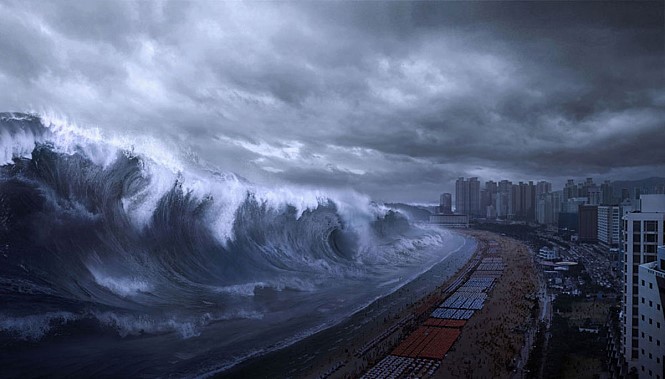 According to the Korean Film Council, local cinema took a 48.8% share of the market in 2009, compared to 42.1% the previous year. This recovery was largely thanks to a small number of films which drew huge numbers of viewers. And as it turned out, it was not the new releases by Park Chan-wook or Bong Joon-ho which captured the largest crowds, but the works of Korea's "second tier" commercial directors. The biggest hit of all was the disaster film Haeundae, in which a gigantic tidal wave crashes into the city of Busan. Released on July 22, the film became a phenomenon throughout Korea, selling upwards of 11.3 million tickets. This marked the first time since Bong Joon-ho's The Host (2006) that the 10 million ticket level had been breached, and ranked as the biggest ever hit for Korea's largest distributor CJ Entertainment. The work was the brainchild of Youn Je-kyun (a guest at Udine in 2003 with Sex Is Zero), who had already established a consistent track record of commercial success, but had never enjoyed a hit on this scale. Critics were generally not amused with his inclusion of slapstick humor and family melodrama within the traditional elements of the disaster pic. But mainstream audiences were, and Youn laughed all the way to the bank.
According to the Korean Film Council, local cinema took a 48.8% share of the market in 2009, compared to 42.1% the previous year. This recovery was largely thanks to a small number of films which drew huge numbers of viewers. And as it turned out, it was not the new releases by Park Chan-wook or Bong Joon-ho which captured the largest crowds, but the works of Korea's "second tier" commercial directors. The biggest hit of all was the disaster film Haeundae, in which a gigantic tidal wave crashes into the city of Busan. Released on July 22, the film became a phenomenon throughout Korea, selling upwards of 11.3 million tickets. This marked the first time since Bong Joon-ho's The Host (2006) that the 10 million ticket level had been breached, and ranked as the biggest ever hit for Korea's largest distributor CJ Entertainment. The work was the brainchild of Youn Je-kyun (a guest at Udine in 2003 with Sex Is Zero), who had already established a consistent track record of commercial success, but had never enjoyed a hit on this scale. Critics were generally not amused with his inclusion of slapstick humor and family melodrama within the traditional elements of the disaster pic. But mainstream audiences were, and Youn laughed all the way to the bank.
The second-highest grossing film of 2009 was released only a week later, on July 29. Take Off is a comic drama based loosely on Korea's national ski jumping team, which since its formation in the mid-1990s has consisted of only five members. Starring Ha Jung-woo (The Chaser, My Dear Enemy), now considered one of Korea's biggest stars, the film sparked interest with its well drawn characters and highly dramatic conclusion set during the Nagano Olympics. The 137 minute film was also poorly constructed and needlessly melodramatic, but that didn't seem to hurt it commercially -- it finished with just under 8.4 million admissions. This was the third straight hit for director Kim Yong-hwa, whose career to date consists of Oh! Brothers (3.1 million admissions, 2003) and 200 Pound Beauty (6.6 million admissions, 2006). Like Youn Je-kyun, he finds himself wielding increasing clout within the industry.
The third big hit of 2009 was also by an up-and-coming director with a consistent track record of success. WOOCHI is a little hard to describe: a martial arts superhero fantasy film that starts its story during the Joseon Dynasty and then jumps ahead 500 years to modern-day Seoul. Perhaps it's easier to describe it as another distinctive ensemble piece from director Choi Dong-hoon, whose previous hits include Tazza: The High Rollers (6.8 million admissions, 2006) and his debut The Big Swindle (2.1 million admissions, 2004). Known for picking good actors and supplying them with sharp, memorable dialogue, Choi settled on a somewhat looser, more comic style for his latest work, which pits a mischievous Taoist wizard against a host of scheming goblins. Audiences responded well to the film and its all-star cast (including Gang Dong-won, Kim Yoon-suk and Lim Soo-jung), even if it was not as universally praised as Tazza. The film ended its run with roughly 6.1 million admissions, despite being released only a week after Avatar.
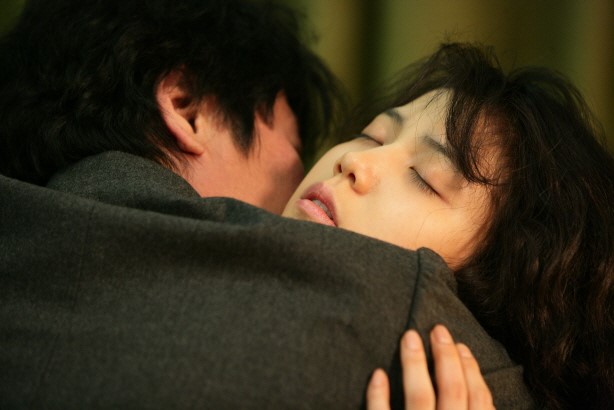 By contrast, the two films that most observers would have picked as "most likely to succeed" at the beginning of the year had to settle for midsized success. Park Chan-wook's Thirst opened in Korea just a couple weeks ahead of its international premiere in competition at the Cannes Film Festival. The film's producers were hoping that its trendy subject matter (vampires) and stylish visuals might catch on big at the box office, but the film proved anything but audience friendly. Ordinary viewers gave it scathing reviews on the internet, while critics and cinephiles were sharply divided: some panned it, others gave it sky high ratings. Commercially, it ended up with a disappointing 2.2 million admissions. The film was nothing if not unique. The central character played by Song Kang-ho is a tortured priest who becomes a vampire through a blood transfusion, while the taking off point for the narrative is the novel Terese Raquin by Emile Zola. International critics proved somewhat more receptive to the film, and it opened to mostly positive reviews in America and the UK.
By contrast, the two films that most observers would have picked as "most likely to succeed" at the beginning of the year had to settle for midsized success. Park Chan-wook's Thirst opened in Korea just a couple weeks ahead of its international premiere in competition at the Cannes Film Festival. The film's producers were hoping that its trendy subject matter (vampires) and stylish visuals might catch on big at the box office, but the film proved anything but audience friendly. Ordinary viewers gave it scathing reviews on the internet, while critics and cinephiles were sharply divided: some panned it, others gave it sky high ratings. Commercially, it ended up with a disappointing 2.2 million admissions. The film was nothing if not unique. The central character played by Song Kang-ho is a tortured priest who becomes a vampire through a blood transfusion, while the taking off point for the narrative is the novel Terese Raquin by Emile Zola. International critics proved somewhat more receptive to the film, and it opened to mostly positive reviews in America and the UK.
Bong Joon-ho's Mother also premiered at Cannes, in the Un Certain Regard section instead of competition. Having reached the very top ranks of Korean directors after only three features (Barking Dogs Never Bite from 2000, Memories of Murder from 2003, and monster movie The Host from 2006), Bong was greeted with soaring expectations from local critics and audiences. But this film too would prove to be more personal, dark and complex than the pundits were anticipating. It tells the story of a woman who sets out to prove the innocence of her brain-damaged son when he is arrested and accused of murder. Like the director's previous work, Mother is artfully executed and filled with painstakingly crafted detail. The narrative at first seems to more or less follow that of an average police procedural, but by the conclusion it reveals itself to be a film with starkly different aims. In Korea, although the performance of veteran actress Kim Hye-ja attracted widespread praise, many viewers found the work's unusual tone and dark themes unsettling. It ended up with just over 3 million admissions.
The story of Korean cinema in 2009 becomes more interesting when you look past the big films into the freewheeling world of low-budget filmmaking. The last five years have seen this sector grow exponentially: whereas in 2004 only three films with a budget of less than 1 billion won (roughly $1 million) received a theatrical release, in 2009 there were 64. This amounts to more than half of the 118 films that opened last year. Some of these were by film students or recent graduates who took advantage of low priced HD technology and their school's resources to produce feature-length work. Some were entirely self-financed out of personal savings, such as the bitingly funny Daytime Drinking which was shot for under $10,000 and went on to win festival awards and popular acclaim (with 24,000 admissions, the film earned 17 times its budget and was even sold to the US).
Others were more obviously mainstream in tone, the results of a commercial model scaled down to conform to economic realities. These include films such as erotic thriller Searching for the Elephant, lonely hearts drama Maybe, or the violent coming of age film Wish. One might hope that with a lower budget, young directors would be given more freedom to take risks and create something new and innovative. However for low-budget commercial films of this type, it didn't seem to happen this year. Each of the three films mentioned above, and many more like them, suffer from inconsistencies of tone and weakly developed narratives. Perhaps 2010 will see a breakout film in this category.
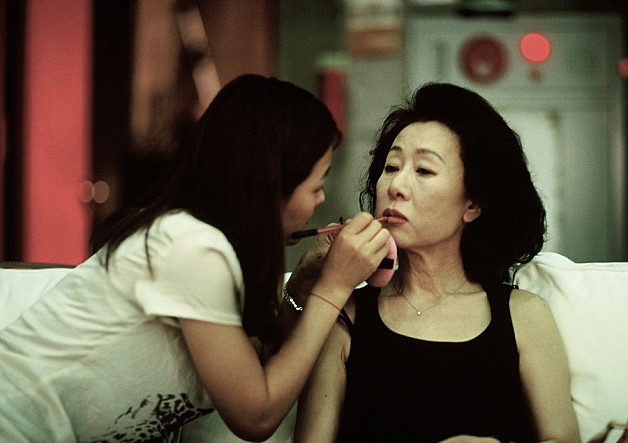 Most of the interesting low-budget features of the past year have been auteur projects or films aimed at specialty audiences. One particular standout is The Actresses by E J-yong, in which six well known actresses play themselves. Set during a photo shoot for an upcoming issue of Vogue, the film has no real plot to speak of, but the pointed and very funny interactions between the women provide plenty of entertainment. The film is particularly playful in juxtaposing the personalities shown in this fictional setup with the real-life personas of the stars. Released in the week between New Moon and Avatar, the film sold just over half a million tickets but still broke even thanks to its modest budget.
Most of the interesting low-budget features of the past year have been auteur projects or films aimed at specialty audiences. One particular standout is The Actresses by E J-yong, in which six well known actresses play themselves. Set during a photo shoot for an upcoming issue of Vogue, the film has no real plot to speak of, but the pointed and very funny interactions between the women provide plenty of entertainment. The film is particularly playful in juxtaposing the personalities shown in this fictional setup with the real-life personas of the stars. Released in the week between New Moon and Avatar, the film sold just over half a million tickets but still broke even thanks to its modest budget.
Meanwhile a significant number of low-budget works were produced with assistance from the Korean Film Council (KOFIC). One example is Bandhobi from the very talented director Shin Dong-il (Host & Guest, My Friend & His Wife). The film depicts a friendship between a rebellious high school girl and a Bangladeshi migrant worker who asks her to help him receive his unpaid wages. Although the film's political message is just a little too obvious, the depiction of the girl and her relationship with her new friend is extremely memorable, thanks in no small part to the outstanding performance by young actress Baek Jin-hui. Given that the film is not an obvious box office draw, the funding provided by KOFIC prior to the film's production was instrumental in allowing it to be made.
However it appears that Korean independent films will not be able to rely on such support in the immediate future. Following the election of conservative Lee Myung Bak as president in December 2007, state support for the film industry has been redirected and restructured in ways that have drawn sharp criticism from filmmakers. At times, new policy has appeared to shift resources towards film exports and more obviously commercial product. At other times, measures have seemed to be targeted specifically against alternative film culture. In the past six months, funding has been withdrawn from IndieSpace, a theater devoted to independent films; MediaAct, which provides resources and training to nonprofessional filmmakers; Seoul Art Cinema, a local cinematheque; and the state run Korean Academy of Film Arts. Although the government claims to be putting alternative measures in place, local filmmakers are furious. Korea's alternative film sector appears to be facing a rocky adjustment from an era of generous state support to one of indifference or outright hostility.
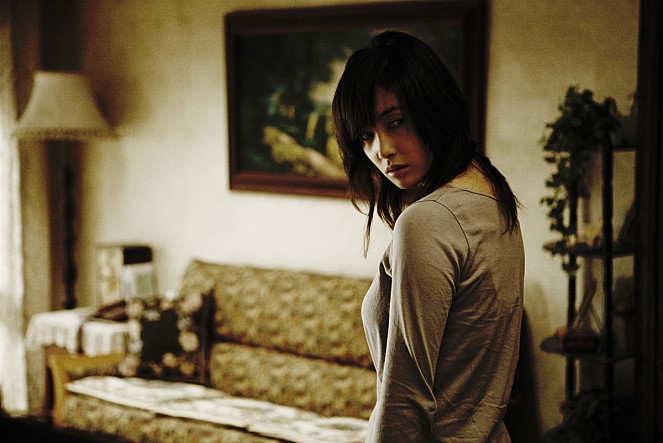 If big films are showing signs of life, and small films are growing in number, midsized genre films have been hardest hit by the film industry's recent economic troubles. Once the heart of the industry, such films are now much fewer in number and provide only the occasional hit. Nonetheless there were still a number of interesting works from 2009 that will be worth revisiting in the future for repeat viewings. One of the most noteworthy debuts of the past year was the summer horror film Possessed by Lee Yong-ju. An emotionally intense work about a missing sister and a mother obsessed with religion, the film was not a box office hit but was singled out by critics as a standout achievement. Director Lee began his film career as an assistant director on Bong Joon-ho's Memories of Murder (2003), and his expert handling of tone in this work suggests he is someone to watch.
If big films are showing signs of life, and small films are growing in number, midsized genre films have been hardest hit by the film industry's recent economic troubles. Once the heart of the industry, such films are now much fewer in number and provide only the occasional hit. Nonetheless there were still a number of interesting works from 2009 that will be worth revisiting in the future for repeat viewings. One of the most noteworthy debuts of the past year was the summer horror film Possessed by Lee Yong-ju. An emotionally intense work about a missing sister and a mother obsessed with religion, the film was not a box office hit but was singled out by critics as a standout achievement. Director Lee began his film career as an assistant director on Bong Joon-ho's Memories of Murder (2003), and his expert handling of tone in this work suggests he is someone to watch.
Other genres may have been down, but a large number of thrillers were produced in 2009, and a look at production charts suggests that this trend will continue into the near future. One of the most successful at the box office was Running Turtle by sophomore director Lee Yeon-woo, about a desperately poor detective trying to catch a criminal with a large ransom on his head. Although a bit too long at 117 minutes, the film stands out from other recent thrillers due to its realistic tone and the bravura performance by actor Kim Yun-suk, now ranked as a star after his lead role in The Chaser (2008). Defying low expectations, Running Turtle even managed to out-perform Mother with 3.1 million admissions. But other thrillers were less successful commercially and less satisfying on an aesthetic level. Works like Secret (from the screenwriter of the excellent 2007 film Seven Days) and Parallel Life (about a judge who suspects he is fated to repeat the events of another man's life) proved particularly disappointing.
As for 2010, Korean cinema can be said to have started off on the right foot, with spy thriller Secret Reunion putting up big numbers at the box office. A sophomore work by the talented director Jang Hun, who turned heads with his impressive debut work Rough Cut (2008), Secret Reunion features top actor Song Kang-ho as a disgraced former intelligence agent. Struggling to get by as a private detective, he comes across a North Korean spy (played by WOOCHI lead Gang Dong-won) and circumstance throws the two of them together. With audiences responding well to the film's mix of suspense, humor and emotion, the film had amassed 5 million admissions at the time of this writing.
Looking forward, the year 2010 has several high profile projects coming up, including a grisly new thriller from Kim Jee-woon starring Oldboy star Choi Min-shik and Lee Byung-heon; a remake of Korean classic The Housemaid directed by Im Sang-soo and starring top actress Jeon Do-yeon; the second film by Na Hong-jin, which reunites the cast from his acclaimed debut The Chaser; and more. More broadly, a large number of big budget war films and military dramas have moved into production, including a World War II film by Shiri director Kang Je-gyu. This, plus the large number of thrillers in the pipeline, has meant that production companies have had to struggle to cast top and mid-level male actors, while a lack of roles has left Korean actresses clicking their heels.
This sort of lopsided production, with large numbers of producers all chasing after the same trend, is a cause for concern. It may be that the crisis of the past few years has discouraged risk-taking and skewed production in unfavorable ways. But at least it can be said that the worst-case scenario feared by the film industry in the dark days of 2007 and 2008 has not come to pass. Korean films have suffered some blows, but they should still be worth keeping an eye on for the foreseeable future.
Down But Not Out: South Korean Cinema in 2008
Many people in the Korean film industry were predicting disaster for the year 2008. A broad-based slump that began in 2007 had shaken confidence and made it much more difficult to produce and finance ambitious or seemingly risky projects. The only truly giant-scale, high profile film was Kim Jee-woon's Manchuria-set Western, The Good , The Bad, The Weird. At the same time it was clear that Korean audiences were becoming more skeptical of local films. It wasn't that they had lost interest entirely, but they were becoming more selective in their viewing habits, and showing comparatively warmer attitudes towards Hollywood and other foreign films. Many observers predicted a warning of creative vitality and a bloodbath at the box office for local films.
In fact, the market share for local films did drop from 50.8% in 2007 (and over 60% in 2006) to only 42.1% in 2008. This marked the lowest level since 2002 and there were a couple months during which theaters seemed completely barren of Korean films capable of leaving any commercial or critical impression. Nonetheless, a look back at the year as a whole shows that a combination of strong debut films, small-scale works that exceeded expectations and an expanding slate of low budget independent films meant that 2008 was far from a lost cause. Whether 2009 can count on such continued surprises, however, is an open question.
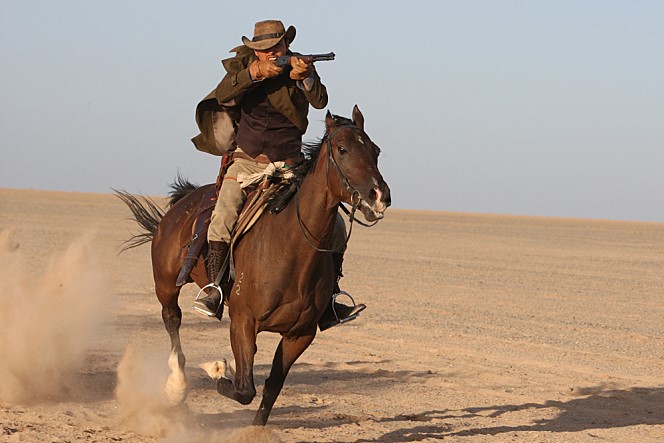 To begin with, the hits. Kim Jee-woon's The Good, the Bad, the Weird, released in July, was a must-succeed picture. Featuring three major male stars (Song Kang-ho, Lee Byung-heon, Jung Woo-sung) and a epic-sized story of stolen loot in 1930s-era Manchuria, this homage to the works of Sergio Leone was also one of Korea's most expensive films ever. Given a massive theatrical release by CJ Entertainment (the one Korean studio to maintain a consistent level of production during the slowdown), the film opened huge and hung on to sell about 7 million tickets - enough, more or less, to break even. Local reception of the movie was mixed, however, as has been the case with many of Kim Jee-woon's previous works. Critics complained that the work lacked emotional depth, and word of mouth among general audiences was positive but not fever-pitched.
To begin with, the hits. Kim Jee-woon's The Good, the Bad, the Weird, released in July, was a must-succeed picture. Featuring three major male stars (Song Kang-ho, Lee Byung-heon, Jung Woo-sung) and a epic-sized story of stolen loot in 1930s-era Manchuria, this homage to the works of Sergio Leone was also one of Korea's most expensive films ever. Given a massive theatrical release by CJ Entertainment (the one Korean studio to maintain a consistent level of production during the slowdown), the film opened huge and hung on to sell about 7 million tickets - enough, more or less, to break even. Local reception of the movie was mixed, however, as has been the case with many of Kim Jee-woon's previous works. Critics complained that the work lacked emotional depth, and word of mouth among general audiences was positive but not fever-pitched.
For much of the year, The Good, The Bad, The Weird ranked as 2008's highest grossing film. However a surprise emerged in December with the release of a small-scale, modestly-budgeted comedy called Scandal Makers. Cheaply marketed, and saddled with a Korean title that is perhaps even less appealing than its English one, this debut film by Kang Hyung-chul looked at first glance to be like any other unremarkable Korean comedy that tends to leave little impact at the box office. However advance screenings of the film were a success, and in the ensuing weeks word of mouth began to propel it to a resounding commercial success that lasted through the holiday season and into February. Scandal Makers does not aspire to be anything other than a well-made comedy, recounting the story of a successful radio DJ in his 30s who discovers to his astonishment that he has a teenage daughter (the result of his first sexual encounter before he left his hometown), and that she herself has proven fertile at an unusually young age. The film doesn't really take the viewer anywhere unexpected, but the director's attention to detail and keen sense of comic timing gave audiences a reason to smile amidst the accelerating economic crisis. The film ended up with over 8 million admissions, breaking the previous record for a Korean comedy held by 200 Pound Beauty (2006).
Two more of the year's top ranking films also qualify as word of mouth hits. Forever the Moment, a drama about Korea's national women's handball team, and The Chaser, Na Hong-jin's widely praised debut about a serial killer -- both discussed at greater length in last year's catalogue essay -- had similarly received little attention before their release. The fact that three of the four top grossing Korean films of 2008 were comparatively modest budgeted, word of mouth hits may suggest that although Korean audiences are growing more skeptical of local cinema, they still turn out in force when a film is able to generate a certain degree of media and popular attention.
 The biggest hit film of early 2009 was an even more striking example of this phenomenon. Old Partner is an independent documentary about an 80-year-old farmer and the aging cow that has toiled by his side for the past 40 years. Shot on DV by Lee Chung-ryoul, who had originally worked in the broadcasting sector, the $75,000 film first premiered at the Pusan International Film Festival in October before screening in Sundance's international documentary competition in January. Before its release, the film's producer was feeling ambitious: his goal was for 220,000 admissions, roughly double the all-time record for Korean documentaries set by the Japan/North Korea-themed Our School from 2007. As it turned out, the film opened to strong audience interest and soon it was being discussed on evening news shows, particularly when president Lee Myung-bak attended a screening in early February. Amazingly, the film eventually rose to number one in the weekly box office chart and at the time of this writing in mid-March, it had grossed approximately 3,000,000 admissions. Much of the film's audience were viewers in their 50s, 60s or 70s -- a sector of the viewing public that has not really turned out in significant numbers since the release of Tae Guk Gi in 2004.
The biggest hit film of early 2009 was an even more striking example of this phenomenon. Old Partner is an independent documentary about an 80-year-old farmer and the aging cow that has toiled by his side for the past 40 years. Shot on DV by Lee Chung-ryoul, who had originally worked in the broadcasting sector, the $75,000 film first premiered at the Pusan International Film Festival in October before screening in Sundance's international documentary competition in January. Before its release, the film's producer was feeling ambitious: his goal was for 220,000 admissions, roughly double the all-time record for Korean documentaries set by the Japan/North Korea-themed Our School from 2007. As it turned out, the film opened to strong audience interest and soon it was being discussed on evening news shows, particularly when president Lee Myung-bak attended a screening in early February. Amazingly, the film eventually rose to number one in the weekly box office chart and at the time of this writing in mid-March, it had grossed approximately 3,000,000 admissions. Much of the film's audience were viewers in their 50s, 60s or 70s -- a sector of the viewing public that has not really turned out in significant numbers since the release of Tae Guk Gi in 2004.
Another notable aspect of 2008 was the large number of debut films that earned critical or popular attention. In addition to the chaser and Scandal Makers, mentioned above, several outstanding works such as Rough Cut or Crush and Blush succeeded in capturing audiences attention. Rough Cut is the feature debut of director Jang Hoon, who worked previously as an assistant director on Kim Ki-duk's films The Bow (2005) and Time (2006). Based on a synopsis by Kim, the film centers around a rivalry between a hot tempered actor known for playing gangster-like roles and the real gangster who agrees to become his costar on the condition that all of their onscreen fighting be real. In this way the film is centered on an abstract dichotomy between the real and the simulated, such as is often explored in Kim's films, but stylistically and dramatically Jang Hoon is a very different kind of director. Spiked through with humor and great performances from its lead actors, the low budget Rough Cut was a significant hit with both critics and mainstream viewers.
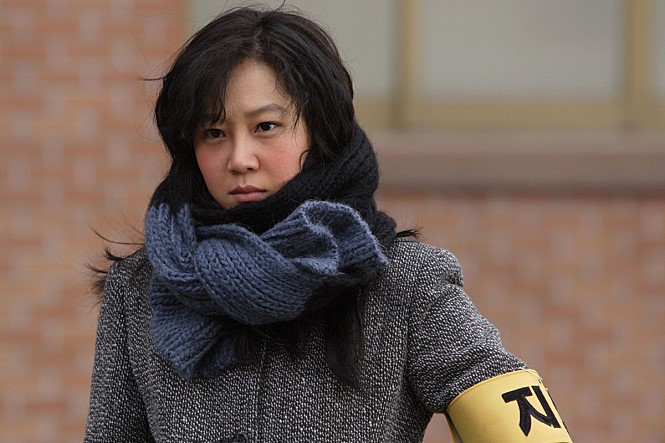 If Kim helped to orchestrate the debut of Jang Hoon, then Park Chan-wook did the same for another talented newcomer Lee Kyoung-mi, who had previously attracted notice in Korea for her short film Feel Good Story. Crush and Blush, which Park produced, is hard to describe. The plot centers around a high school Russian teacher who is demoted to teach middle school English, which she barely knows. In love with another married teacher, she is distraught to find out that he is having an affair, so she enlists the help of the man's daughter to sabotage the illicit relationship. More to the point, however, the film is a turbulent trip into the erratic mind of its lead character. Lurching back and forth between cutting humor and frenzied hysterics, the film is an emotional carnival ride and a unique vision by a very talented director.
If Kim helped to orchestrate the debut of Jang Hoon, then Park Chan-wook did the same for another talented newcomer Lee Kyoung-mi, who had previously attracted notice in Korea for her short film Feel Good Story. Crush and Blush, which Park produced, is hard to describe. The plot centers around a high school Russian teacher who is demoted to teach middle school English, which she barely knows. In love with another married teacher, she is distraught to find out that he is having an affair, so she enlists the help of the man's daughter to sabotage the illicit relationship. More to the point, however, the film is a turbulent trip into the erratic mind of its lead character. Lurching back and forth between cutting humor and frenzied hysterics, the film is an emotional carnival ride and a unique vision by a very talented director.
Among the more established directors, two of the more interesting works were by Yu Ha, whose previous film A Dirty Carnival had opened many eyes in and outside of Korea; and Lee Yoon-ki, who has steadily built his reputation with a string of small-scale, intimate art-house films such as his debut This Charming Girl and the more recent Ad Lib Night. Yu's latest work Frozen Flower was his first period piece, a ravishing drama set in the Imperial Palace of the Koryo Dynasty which lasted from 918 to 1392. When the king, who is gay, is unable to produce an heir, he asks his most faithful general and lover to sleep with the queen. The result is an ever thickening brew of suspicion and crossed loyalties that make for a dramatic and entertaining story. Yu's expert handling of narrative and dramatic tension imbues life into every scene in the film, further marking him out as one of Korea's strongest directors. Released at the very end of 2008, the big budget film ranked as a solid hit with 3.7 million tickets sold.
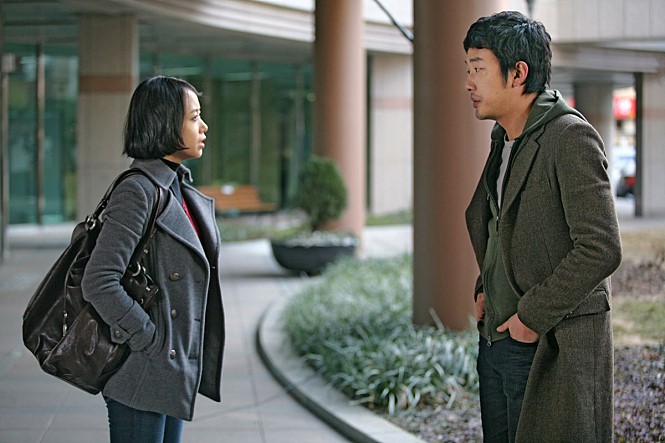 Lee's new film My Dear Enemy also represented a step into higher profile filmmaking, not necessarily in its plot or style but in the casting of two highly acclaimed stars: Ha Jung-woo, whose career has surged in recent years especially with his role as a serial killer in The Chaser, and Korea's leading actress Jeon Do-yeon, who was appearing in her first feature since winning the best actress award at the 2007 Cannes Film Festival for her role in Secret Sunshine. Like Ad Lib Night, My Dear Enemy is based on a story by Japanese writer TAIRA Azuko . It follows the path of a woman who tracks down her ex-boyfriend in order to collect an old loan worth about $1000. He doesn't have the money, but he promises to raise it in the course of the day. The film is driven not so much by turns in the plot, but by subtle emotional changes, and in this sense the acting performances are allowed to dominate. Although not a mainstream hit, it clearly found its way into the hearts of many cinephiles, and later received its international premiere in the Forum section of the Berlin Film Festival.
Lee's new film My Dear Enemy also represented a step into higher profile filmmaking, not necessarily in its plot or style but in the casting of two highly acclaimed stars: Ha Jung-woo, whose career has surged in recent years especially with his role as a serial killer in The Chaser, and Korea's leading actress Jeon Do-yeon, who was appearing in her first feature since winning the best actress award at the 2007 Cannes Film Festival for her role in Secret Sunshine. Like Ad Lib Night, My Dear Enemy is based on a story by Japanese writer TAIRA Azuko . It follows the path of a woman who tracks down her ex-boyfriend in order to collect an old loan worth about $1000. He doesn't have the money, but he promises to raise it in the course of the day. The film is driven not so much by turns in the plot, but by subtle emotional changes, and in this sense the acting performances are allowed to dominate. Although not a mainstream hit, it clearly found its way into the hearts of many cinephiles, and later received its international premiere in the Forum section of the Berlin Film Festival.
If there was one notable absence in the industry in 2008, it was the lack of summer horror films. Korea has developed a tradition over the years of releasing the bulk of its horror films during the hot summer months. Although audiences have come to expect this, the comparatively weak performance of most horror films in recent years meant that virtually all the major distributors passed through the season without a single horror title. At the last minute, new distributor SK Telecom financed and released Death Bell, a high school-set story of an anonymous adversary who locks a class of students inside their school and begins to kill them off in the order of their grade point average (the smart kids first). Although not particularly well made or conceived, the film did enjoy a strong run at the box office, suggesting that other film companies were perhaps too quick to give up on the genre. Sure enough, a fifth installment of the famous Whispering Corridors series of horror films set in girls' high schools is due out in summer 2009.
Given that there were a reasonable number of hit films in 2008, and a total of 108 features released in theaters (even if many of these were low-budget independent films, or works produced in previous years), outside observers might reasonably question whether the industry is in fact on the brink of collapse, as many industry insiders claim. Certainly, from the perspective of a producer working in the Korean film industry, the situation is dire. This is not only because film financing has grown scarce, costs have risen and viewers are more cautious, but also because the number of people trying to make feature films in Korea has expanded manyfold even from just a few years ago. Any individual producer now faces long odds in trying to get all but the highest profile projects off the ground, and this is unlikely to change soon.
Nonetheless, it seems unlikely that South Korea will experience a drop in production levels comparative to that seen in Hong Kong in the past decade. Governments on both the left and right sides of the political spectrum have found it politically expedient to pledge support for the film industry (even if the current right-leaning government has approached the task in somewhat chaotic). Investors still notice the success of hits like Scandal Makers, and some people in the industry talk cautiously of a revival in the second half of 2009. In the meantime, two giant projects are nearing release this spring: Park Chan-wook's emotionally intense vampire movie Thirst, and Bong Joon-ho's fourth feature Mother, about a woman trying to clear her son of a murder charge. Surely the biggest name directors will continue to attract financing and will enjoy enviable levels of creative control for their future projects, should they choose to stay in Korea instead of taking up one of the many scripts being sent to them from Hollywood. The real question is the fate of lesser-known and first time directors in the tough environment that lies ahead. If 2009 can replicate the level of success seen in 2008, then they will have a good fighting chance.
Some Ups, But Mostly Downs: South Korean Cinema in 2007
The past twelve months have seen numerous ups and downs for Korean cinema -- but mostly downs. The industry has struggled through downturns in the past, notably in 2002, when investors became spooked by the failure of several big-budget films including Resurrection of the Little Match Girl. But most commentators would agree that 2007 ranks as the most serious challenge for Korean cinema since the start of its boom in the late 1990s. At the same time, the industry is much larger than it was in 2002, so the reverberations are spreading further.
There are two sides to the crisis. The first is that Korean audiences seem to be cooling a bit on local films. After a record-setting 2006, with smash hits like The Host (13 million admissions), King and the Clown (12.3 million admissions), Tazza: The High Rollers (6.8 million admissions) and 200 Pound Beauty (6.6 million admissions), some retreat to more normal levels might have been expected. But a string of box office disappointments and a strong performance by Hollywood films caused the market store of Korean cinema to fall to 50% -- its lowest level since 2002.
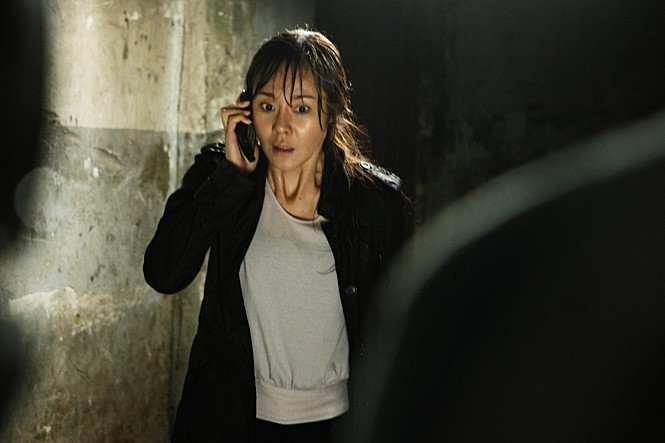 This was partly due to the films themselves. 2007 was a year in which few of Korea's best known commercial filmmakers -- Bong Joon-ho, Park Chan-wook, Kim Jae-woon, etc -- had new films to release. There were a few word-of-mouth hits, such as Seven Days (pictured) or Going By the Book, but in general there were not enough high profile releases to catch audiences' attention. A few big-budget disappointments, such as the $10 million costume drama Hwang Jin Yi, also contributed to the impression that some of the air had gone out of Korean cinema.
This was partly due to the films themselves. 2007 was a year in which few of Korea's best known commercial filmmakers -- Bong Joon-ho, Park Chan-wook, Kim Jae-woon, etc -- had new films to release. There were a few word-of-mouth hits, such as Seven Days (pictured) or Going By the Book, but in general there were not enough high profile releases to catch audiences' attention. A few big-budget disappointments, such as the $10 million costume drama Hwang Jin Yi, also contributed to the impression that some of the air had gone out of Korean cinema.
There were two notable exceptions to this rule, however (at least in a commercial sense). Blockbusters May 18 and D-War were released a week apart in mid summer, and rode a wave of publicity to become the best-selling Korean films of the year (with 7.3 and 8.4 million admissions respectively). May 18 is based on the real life Gwangju Uprising of 1980, when military paratroopers sent in by the government clashed with pro-democracy activists and ordinary citizens, leaving hundreds (or, more likely thousands) dead. The horrific incident had been portrayed by Korean filmmakers before, such as in Jang Sun-woo's A Petal (1996) or Lee Chang-dong's Peppermint Candy (2000), but May 18 was the most mainstream treatment of the subject yet. A bit too mainstream, argued some of its detractors -- the film seemed at times to be deliberately pushing the same emotional buttons that made Tae Guk Gi (2004) and Silmido (2003) so popular. Nonetheless its strong box office performance most be credited to more then just the market power of its distributor CJ Entertainment, as it continued to attract large numbers of viewers even late in its release.
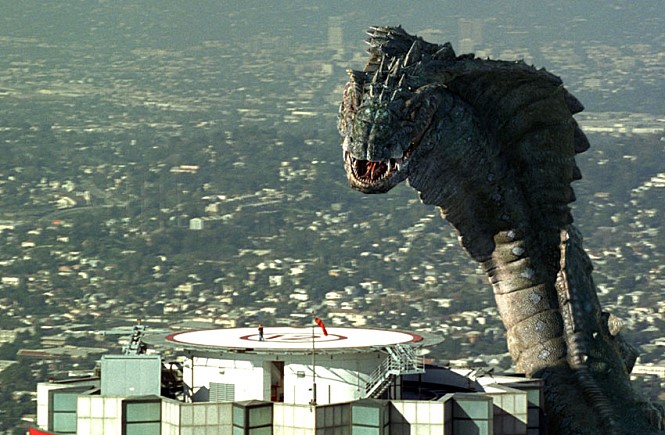 D-War, meanwhile, was another kind of animal entirely. Shim Hyung-rae, the creator of Yonggary (1999), shot this massively expensive, English language monster movie in LA with an American cast and crew. The film is based on a mythical Korean creature that resembles a giant snake. Although to most Western viewers it will appear indistinguishable from any other really bad Hollywood B-movie, to many Koreans it became a source of national pride, since the at-times impressive CGI effects were done entirely in Korea, and since it was slated to receive a large 2,000 screen release in the U.S. Korean distributor Showbox, as well as Shim himself, successfully turned the film's release into a major media event, and when local critics attacked the film for its inept direction or preposterous screenplay, it only made viewers more curious to see it. A strange kind of culture war also emerged, with ardent supporters of the film arguing on its behalf online, and attacking anyone who criticized it. In the event, the monstrously budgeted film ($30 million or $70 million, depending on how you do the accounting) was a huge commercial success in Korea, though its U.S. theatrical release a month later proved to be somewhat of a dud.
D-War, meanwhile, was another kind of animal entirely. Shim Hyung-rae, the creator of Yonggary (1999), shot this massively expensive, English language monster movie in LA with an American cast and crew. The film is based on a mythical Korean creature that resembles a giant snake. Although to most Western viewers it will appear indistinguishable from any other really bad Hollywood B-movie, to many Koreans it became a source of national pride, since the at-times impressive CGI effects were done entirely in Korea, and since it was slated to receive a large 2,000 screen release in the U.S. Korean distributor Showbox, as well as Shim himself, successfully turned the film's release into a major media event, and when local critics attacked the film for its inept direction or preposterous screenplay, it only made viewers more curious to see it. A strange kind of culture war also emerged, with ardent supporters of the film arguing on its behalf online, and attacking anyone who criticized it. In the event, the monstrously budgeted film ($30 million or $70 million, depending on how you do the accounting) was a huge commercial success in Korea, though its U.S. theatrical release a month later proved to be somewhat of a dud.
Ultimately these two films would be the only ones to sell more than 3.5 million tickets in 2007, compared to five titles in 2006 and eight in 2005. Two other films -- kidnapping drama Voice of a Murderer (pictured below) and comic adaptation Le Grand Chef, would sneak past the 3 million admissions mark, though it seems both films failed to reach the full potential of their eye-catching source material.
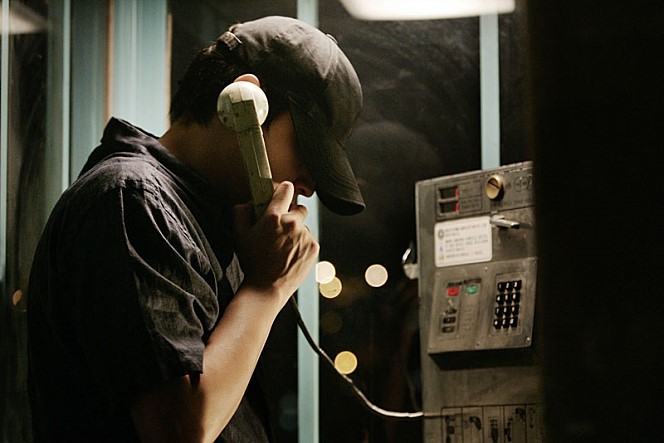 The other side to Korean cinema's crisis was related to the overall profitability of the industry. The boom years of 2005-2006 had encouraged, among other things, a large number of new investors to enter the industry and an increasing number of film companies to list on the local stock market (mostly through back door means). Overseas sales of Korean films, thanks to a surge of interest in Japan, peaked at $76 million in 2005. With all this money sloshing around in the industry, the results were predictable: budgets rose, salaries of major stars (and star directors) shot up, and Korea began making many more films than it had in the past.
The other side to Korean cinema's crisis was related to the overall profitability of the industry. The boom years of 2005-2006 had encouraged, among other things, a large number of new investors to enter the industry and an increasing number of film companies to list on the local stock market (mostly through back door means). Overseas sales of Korean films, thanks to a surge of interest in Japan, peaked at $76 million in 2005. With all this money sloshing around in the industry, the results were predictable: budgets rose, salaries of major stars (and star directors) shot up, and Korea began making many more films than it had in the past.
The good times couldn't last forever, though. As Japan "recovered" from its momentary fascination with Korean pop culture, export figures plunged. More seriously, the large numbers of films being made meant steeply increased competition at the box office, so that even in 2006 -- a record year at the box office -- almost everyone in the industry was losing money. In 2007, when the number of tickets sold to Korean films dropped sharply, the situation was even more serious.
The crisis was a source of almost constant discussion in 2007, and few investors or producers expect the situation to improve in the next year or two. There are signs now that fewer films are being made. It seems likely that the rate of production will fall to 60-80 commercial films per year, which most people view as a sustainable level (excluding the sort of low-budget independent films that are often supported by the Korean Film Council). Some worry that it could drop further than that. On the other hand, though, new companies continue to enter the film industry, such as telecoms conglomerates SK Telecom and KT, so at this point it remains extremely difficult to product the crisis's long term effects. In the meantime, producers have been trying to lower budgets, though most find it is not an easy process.
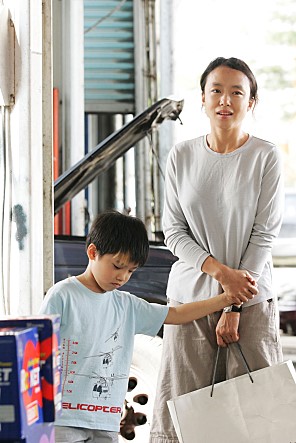 But all was not bad news in 2007. The most exciting development came in May, when Jeon Do-yeon won the Best Actress award at Cannes for her fearless performance in Lee Chang-dong's Secret Sunshine. Jeon has been well known to fans of Korean cinema as a supremely talented performer with the chameleon-like ability to fully inhabit any role. From her debut in The Contact in 1997, she has won breathless praise and cartfuls of local awards. However this marked her first appearance in a major international film festival, so in that sense, a new Asian star was born. As months passed the awards would continue to roll in, with Jeon winning at the first Asia Pacific Screen Awards in New Zealand as well as the second Asian Film Awards in Hong Kong this March.
But all was not bad news in 2007. The most exciting development came in May, when Jeon Do-yeon won the Best Actress award at Cannes for her fearless performance in Lee Chang-dong's Secret Sunshine. Jeon has been well known to fans of Korean cinema as a supremely talented performer with the chameleon-like ability to fully inhabit any role. From her debut in The Contact in 1997, she has won breathless praise and cartfuls of local awards. However this marked her first appearance in a major international film festival, so in that sense, a new Asian star was born. As months passed the awards would continue to roll in, with Jeon winning at the first Asia Pacific Screen Awards in New Zealand as well as the second Asian Film Awards in Hong Kong this March.
Secret Sunshine itself also won numerous praise and awards, including Best Picture honors at the two awards ceremonies mentioned above. A harrowing story about a young widow who moves to her husband's hometown and experiences further tragedy, the film was a consensus pick by many critics as the best film of the year. In its local release, audiences initially found it hard to relate to, but news of Jeon's award gave a considerable boost to its box office performance.
A few other trends emerged among the films on release in 2007. One was a revival of the thriller genre, thanks to works like Seven Days, Our Town and, in the early part of 2008, The Chaser. Rather than a wholesale deconstruction of the genre, as in Bong Joon-ho's Memories of Murder (2003), recent thrillers have combined stylish direction, great acting and creative variations on genre conventions. Seven Days in particular was highly rated by viewers for its brisk pacing, well-structured plot and outstanding lead performance by Lost star Kim Yun-jin (it was to Kim's misfortune that the film opened in the same year as Secret Sunshine, otherwise she'd have been sure to win numerous acting awards). The film is based on a clever premise: the young daughter of a star defense attorney is kidnapped, and rather than demanding ransom, the kidnappers tell the lawyer she must prove the innocence of a man on death row. Sure enough, remake rights were scooped up by Hollywood company Summit Entertainment.
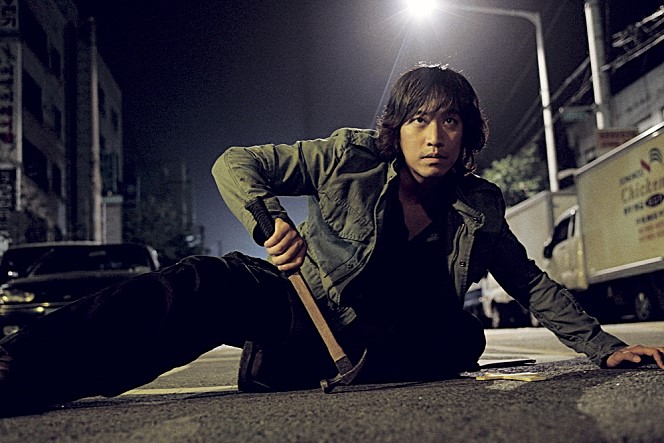 The ironically titled Our Town (pictured), by debut director Jeong Gil-young, is another addition to a long line of Korean serial murder thrillers. However the film focuses on not just one, but two killers on the loose in an ordinary urban neighborhood (even if one of the two is clearly the more ruthless and efficient killing machine). As the body count grows, a complicated web of flashbacks fills in the viewer on the formative experiences of the two men.
The ironically titled Our Town (pictured), by debut director Jeong Gil-young, is another addition to a long line of Korean serial murder thrillers. However the film focuses on not just one, but two killers on the loose in an ordinary urban neighborhood (even if one of the two is clearly the more ruthless and efficient killing machine). As the body count grows, a complicated web of flashbacks fills in the viewer on the formative experiences of the two men.
The autumn season turned up a few other genre surprises. Director Lee Joon-ik has emerged in the past few years as one of Korea's most distinctive and talented commercial directors, even if he is not yet attracting much attention abroad. After his breakout smash hit King and the Clown and the word of mouth driven success Radio Star in 2006, he returned in 2007 with The Happy Life, the story of three middle aged men who decide to start a rock band. It doesn't sound like a particularly commercial concept, but once again the storytelling skills of Lee and his regular screenwriter Choi Seok-hwan have turned this into a hugely entertaining and enjoyable film.
Shadows in the Palace is the debut work of Kim Mee-jeung, who worked on the crew of King and the Clown and Lee's earlier Once Upon a Time in a Battlefield (2003). Set during Korea's Joseon Dynasty, the film is unusual in focusing on the women's quarters of the royal palace, where an unexplained murder sets dangerous events into motion. Mixing elements of the historical costume drama, the crime thriller and Asian horror, the film ranks as a distinctive, well-crafted (and cruel) film debut.
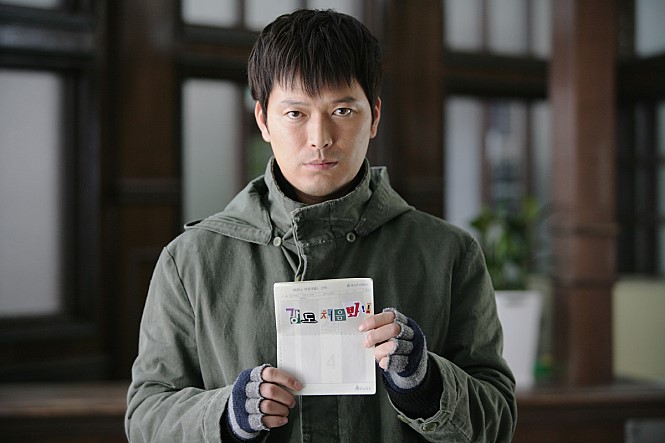 Another mid-sized hit was the comedy Going By the Book (pictured), based on a script by the well-known director Jang Jin and directed by newcomer Ra Hee-chan. The setup is simple: a soft-spoken but extremely conscientious policeman is asked to play the part of a bank robber in a highly realistic simulation of a robbery. He proves to be more clever and devoted to the task at hand than his superiors expect, however. Ultimately the film proved more popular than Jang Jin's own 2007 release My Son, which seems to be one of the weaker items in his filmography.
Another mid-sized hit was the comedy Going By the Book (pictured), based on a script by the well-known director Jang Jin and directed by newcomer Ra Hee-chan. The setup is simple: a soft-spoken but extremely conscientious policeman is asked to play the part of a bank robber in a highly realistic simulation of a robbery. He proves to be more clever and devoted to the task at hand than his superiors expect, however. Ultimately the film proved more popular than Jang Jin's own 2007 release My Son, which seems to be one of the weaker items in his filmography.
Another trend, related perhaps to the current challenge facing the industry, was the increasing number of low-budget commercial films shot in HD format. Often with partial funding from TV broadcasters, the films are interesting because, despite being commercial in orientation, their low budget allows lesser known directors a bit more creative freedom. One of the most interesting of 2007's HD films was The Wonder Years, a nuanced look at the worries and fantasies of a reclusive 13-year old girl. The film is especially notable for the great performance coaxed out of teenage actress Lee Se-young by the film's debut director Kim Hee-jung.
The year 2008 opened on a slightly more positive note, with the runaway success of two films that, before their release, were considered to be fairly low-profile. Forever the Moment focuses on the real-life experiences of Korea's women's handball team that competed at the 2004 Athens Olympics. Directed by Lim Soon-rye, who was previously pegged as an arthouse director with virtually no commercial potential, the film proved to be broadly popular among all age groups, especially women in their 30s (an increasingly influential segment of the viewing public). The film ultimately sold just over 4 million tickets.
Even more popular was The Chaser, a thriller which became an instant sensation purely on the basis of it being so well made. The film by debut director Na Hong-jin drew numerous comparisons to Memories of Murder (2003), despite being smaller in scale and featuring a much lower-profile cast. It's particularly effective in creating suspense, not related to whether the killer will be identified or caught (that is dealt with fairly early), but in the fate of a woman left at the edge of death at the killer's home. Like Memories of Murder, the film takes a hard look at the ineptitude of the police force, and uses this to further heighten the suspense. Sure enough, remake rights to this film were sold as well, to Warner Bros. and the production team behind Academy Award-winner The Departed.
The rest of the spring looks to be fairly quiet for Korean cinema, however, with most high profile releases being pushed back to the fall. The biggest genre film on the near horizon is The Guard Post, a military horror film set on the border between North and South Korea. From Kong Su-chang, director of commercial and critical hit R-Point, the film is being given a major release by distributor Showbox.
But in general, the year 2008 will be crucial in terms of assessing the depth of the film industry's downturn, and the extent to which audiences turn out for high profile upcoming projects like Kim Jee-woon's western The Good, The Bad, The Weird (slated for a July release) and Park Chan-wook's vampire film Thirst (next winter). The film industry continues to receive a lot of attention in Korea, and new business friendly president Lee Myung-bak claims he will make cultural industries a priority in the coming years. But with many well-known film companies threatened with downsizing or bankruptcy, the industry is still in need of a little good news.
Crisis? What Crisis?: South Korean Cinema in 2006
However the year 2006 is ultimately remembered -- as the commercial peak of the modern day Korean film renaissance, or as a year in which the environment for making films sharply deteriorated -- it was a year of extremes for Korean cinema. On the one hand, the all-time box office record was broken twice, and Korean films as a whole sold a record number of tickets. Yet at the same time, the overseas market for Korean films collapsed (due mostly to slackening interest from Japan), and because of rising budgets, the vast majority of films failed to turn a profit. Many smaller film companies found themselves on the verge of bankruptcy. Last year's bitterly fought reduction of the local screen quota system to 73 days per year only added to a creeping sense of pessimism for the future.
The mood among Korean filmmakers in early 2007 is one of deep concern. The word "crisis" is now thrown about with abandon in the local press, however if there is indeed a crisis, it is of a different sort than the problems faced by most film industries around the world. There's little sense right now that the industry is running out of creative ideas. A look back on the films produced last year confirms this, and although it's hard to see any sure-fire commercial hits lined up for the second part of 2007, for fans of Korean cinema there is more than enough to look forward to. In addition, the problem with the Korean film industry is clearly not the audience, which is as supportive of local films as ever. The problem is something in the system itself, and the worry is that if it is not fixed, it will deal a blow to the long term potential of Korean cinema.
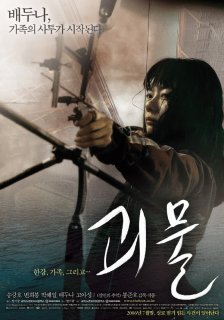 First, however, it is worth taking a look at the films produced in the last year. Several directors took big steps forward in 2006. Most obvious, perhaps, is the case of Bong Joon-ho, whose ambitious creature movie The Host triumphed over initial skepticism and established its director as a consensus choice for the most respected filmmaker in Korea. After opening to a warm reception in the Directors Fortnight section at Cannes, the film went on to sell 13 million tickets (worth $97 million) in Korea, setting a new local record. Although some viewers took issue with certain elements of the film (such as a much-criticized CGI shot of the monster on fire), and critics did not afford it the same level of praise as Bong's previous film Memories of Murder, The Host nonetheless confirmed Bong's prodigious cinematic talent and gave him new visibility abroad.
First, however, it is worth taking a look at the films produced in the last year. Several directors took big steps forward in 2006. Most obvious, perhaps, is the case of Bong Joon-ho, whose ambitious creature movie The Host triumphed over initial skepticism and established its director as a consensus choice for the most respected filmmaker in Korea. After opening to a warm reception in the Directors Fortnight section at Cannes, the film went on to sell 13 million tickets (worth $97 million) in Korea, setting a new local record. Although some viewers took issue with certain elements of the film (such as a much-criticized CGI shot of the monster on fire), and critics did not afford it the same level of praise as Bong's previous film Memories of Murder, The Host nonetheless confirmed Bong's prodigious cinematic talent and gave him new visibility abroad.
Another director to enjoy a breakout year was Choi Dong-hoon with the box office smash hit Tazza: The High Rollers, based on a well-known local comic. A spirited showcase of gambling, fast talk, betrayal and innuendo that earned $47 million at the local box office, Tazza confirmed its director's expert feel for witty dialogue and ensemble acting, first displayed in his 2004 debut work The Big Swindle. Choi also has a knack for great casting, and indeed Tazza won particular praise -- and several high-profile acting awards -- for actress Kim Hye-soo's standout performance as a sultry, manipulative femme fatale. With two breakout hits to his credit and a clearly recognizable visual and narrative style, Choi can now count himself among the upper ranks of Korean directors. Whether his films will eventually cross the translation gap to gain a reputation among international audiences remains to be seen, however.
Although the box office success of The Host and Tazza could in some ways have been foretold, one smashing success that surprised everyone was Kim Yong-hwa's 200 Pound Beauty. Based on a Japanese comic book about an overweight singer who undergoes extreme plastic surgery to become thin and beautiful, the mid-budget film benefited from strong word-of-mouth and a showstopping performance by young actress Kim Ah-joong. After grossing $16 million with his 2003 debut film Oh! Brothers and a further $45 million with this latest work, director Kim Yong-hwa can rightfully consider himself one of contemporary Korean cinema's most successful directors of comedy.
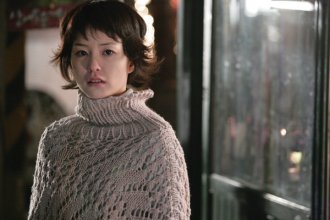 On a smaller scale, one of the best-loved films of the year among critics and fellow filmmakers was Kim Tae-yong's Family Ties. Told in three separate but related segments about people struggling with familial and romantic relationships, the film was named Best Picture at the Busan Film Critics Awards and went on to find festival success at Toronto and Thessaloniki, where it took Best Feature Film, Best Screenplay, Best Actress (shared among four members of the cast) and the Audience Award. Kim had previously been best known as the co-director of the 1999 cult horror film Memento Mori, but with Family Ties he established himself as a highly skilled director in his own right.
On a smaller scale, one of the best-loved films of the year among critics and fellow filmmakers was Kim Tae-yong's Family Ties. Told in three separate but related segments about people struggling with familial and romantic relationships, the film was named Best Picture at the Busan Film Critics Awards and went on to find festival success at Toronto and Thessaloniki, where it took Best Feature Film, Best Screenplay, Best Actress (shared among four members of the cast) and the Audience Award. Kim had previously been best known as the co-director of the 1999 cult horror film Memento Mori, but with Family Ties he established himself as a highly skilled director in his own right.
2006 was certainly a breakout year for director Lee Joon-ik as well. After grossing $84 million with record-breaking hit King and the Clown earlier in the year, Lee quickly shot a much more modest follow-up that, while only ranking as a mid-level hit, enjoyed the strongest word-of-mouth of the year. Radio Star is the story of an aging rock star (Park Joong-hoon) and his loyal manager (Ahn Sung-ki) who move out to the country to work as a radio DJ. The synopsis does not inspire confidence, but Lee's storytelling skills ultimately make the film surprisingly engaging. In an online poll held at the end of the year, the film topped even The Host to be named by ordinary citizens as the best film of 2006.
Other directors who saw their careers advance in 2006 include Yu Ha with his well-reviewed epic gangster drama A Dirty Carnival; arthouse director Hong Sang-soo with his acclaimed seventh feature Woman on the Beach; Ryoo Seung-wan with the low-budget action extravaganza The City of Violence (which premiered internationally in a midnight screening at Venice); Lee Yoon-ki, whose low-budget art film Ad Lib Night won attention from festivals including Berlin; Song Hae-sung, who followed up the disappointment of Rikidozan with a major hit in melodrama Maundy Thursday; Choi Ho, who won over both critics and audiences with his Busan-set drug ring drama Bloody Tie; and independent directors Shin Dong-il and Min Boung-hun whose low-budget films My Friend & His Wife and Pruning the Grapevine won critical praise at the Pusan International Film Festival.
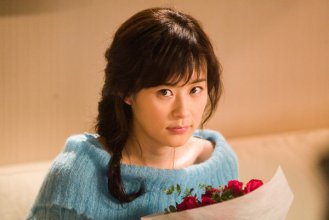 For an industry in which over 50% of new releases are by debut directors, it won't be a surprise to hear that there were several accomplished debut films in 2006 -- though admittedly, first-time directors in Korea generally hold less artistic control over their work than established filmmakers. Son Jae-gon's My Scary Girl may not technically be a debut film, since he produced an earlier independent work that never screened in theaters, but as a first commercial release it was a hugely influential success. Shot for $700,000 on HD video, the film was originally conceived more as TV content than as a mainstream release, but given a strong reaction from viewers it ended up securing a wide release, beating out Ice Age 2 and grossing $16 million. Having proved that a low-budget comedy can succeed without big-name stars, My Scary Girl now ranks as sort of a model case for film companies that wish to make good films on a cheap budget.
For an industry in which over 50% of new releases are by debut directors, it won't be a surprise to hear that there were several accomplished debut films in 2006 -- though admittedly, first-time directors in Korea generally hold less artistic control over their work than established filmmakers. Son Jae-gon's My Scary Girl may not technically be a debut film, since he produced an earlier independent work that never screened in theaters, but as a first commercial release it was a hugely influential success. Shot for $700,000 on HD video, the film was originally conceived more as TV content than as a mainstream release, but given a strong reaction from viewers it ended up securing a wide release, beating out Ice Age 2 and grossing $16 million. Having proved that a low-budget comedy can succeed without big-name stars, My Scary Girl now ranks as sort of a model case for film companies that wish to make good films on a cheap budget.
Another highly praised debut came from the directing duo of Lee Hae-young and Lee Hae-joon in the comic drama Like a Virgin. Best known previously for their screenwriting credit on the 2002 hit film Conduct Zero, the Lees portrayed the story of a gay high school boy from a rough neighborhood who ends up joining the local ssireum (traditional Korean wrestling) team. Filled with a deadpan, wistful humour, the film is in high demand from festivals following its international premiere at Berlin earlier this year.
Much less noticed, but also deserving of praise was an inspired low-budget horror film from first-time director Kim Eun-kyung. Roommates is set in a sort of study academy from hell, which is all the more disturbing and vivid because such places actually exist in real life. In Europe and North America, Asian education systems are often held up as a model for other countries to follow. Roommates shows in memorable fashion that such high achievement can sometimes come at a terrible cost.
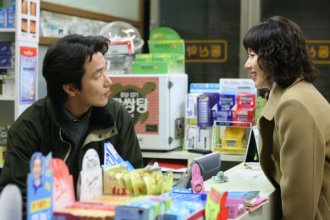 Meanwhile, director Lee Jeong-beom debuted with an unusually-structured story about a gangster who ends up befriending the mother of a man he has been ordered to kill. Cruel Winter Blues debuted at the Pusan International Film Festival in October and took many viewers by surprise with its earthy realism and accomplished acting. Two other noted debuts from 2006 include No Regret, an acclaimed gay-themed drama by Leesong Hee-il that enjoyed a surprising commercial success considering its low-budget origins; and Byun Seung-wook's Solace (pictured), a simply-told but highly engaging story about a pharmacist and a clothes designer who find much to get in the way of their growing attraction to each other. Although not a box office success, the latter work boasts two great performances by Han Suk-kyu (Shiri) and Kim Ji-soo (This Charming Girl).
Meanwhile, director Lee Jeong-beom debuted with an unusually-structured story about a gangster who ends up befriending the mother of a man he has been ordered to kill. Cruel Winter Blues debuted at the Pusan International Film Festival in October and took many viewers by surprise with its earthy realism and accomplished acting. Two other noted debuts from 2006 include No Regret, an acclaimed gay-themed drama by Leesong Hee-il that enjoyed a surprising commercial success considering its low-budget origins; and Byun Seung-wook's Solace (pictured), a simply-told but highly engaging story about a pharmacist and a clothes designer who find much to get in the way of their growing attraction to each other. Although not a box office success, the latter work boasts two great performances by Han Suk-kyu (Shiri) and Kim Ji-soo (This Charming Girl).
Of course, the year had its share of disappointments as well. Kang Woo-suk's big-budget political drama Hanbando hoped to turn a hypothetical tale of Japanese aggression into a box office smash along the lines of the director's earlier Silmido (2003). However a scathing critical reception and a lukewarm response by audiences meant that even with one of the biggest marketing campaigns of the year it fell well short of 4 million admissions. At the end of the year, a similar fate would befall the big-budget martial arts fantasy The Restless, although the film's technical accomplishments in CGI imagery, costumes and mise-en-scene were widely acknowledged. Finally, the 1969-set romance Once in a Summer became the apparent victim of a viewer backlash against films featuring hallyu (Korean Wave) stars. Ironically, Once in a Summer was unusually successful in showcasing the charm of its leads Lee Byung-heon (A Bittersweet Life) and Soo Ae (A Family). It was not that the film suffered poor word of mouth -- instead, it was simply skipped over by viewers who were more interested in watching something else.
It was partly due to such commercial flops, and partly due to an unusually large number of films released (108, the most since the early 1990s) that overall profitability in the industry took a steep dive. At first glance, it seems odd that an industry with a 60% market share that recorded 100 million ticket sales to local films alone in 2006 should be losing money. However the cost of making, marketing and releasing films has steadily risen over the years, so that an average commercial film now needs to sell upwards of two million tickets, or about $14 million, simply to break even.
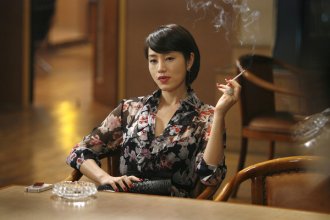 The biggest cloud over the economics of filmmaking in Korea is the weakness of DVD and other ancillary markets such as cable TV. (Indeed, illegal downloading of films on the internet has become a way of life) Whereas a country like Japan can release 200-300 films annually, with many smaller titles getting most of their revenues from DVD sales, Korea's over-reliance on theatrical admissions places a practical limit on the number of films that can be made each year. Competition at the box office was particularly fierce last year, due to a production glut brought on by a host of stock market listings and new companies moving into the industry. So while the investors in The Host, Tazza (pictured) and several other titles enjoyed a very good year, most of the other 100+ films that were released in theaters lost money.
The biggest cloud over the economics of filmmaking in Korea is the weakness of DVD and other ancillary markets such as cable TV. (Indeed, illegal downloading of films on the internet has become a way of life) Whereas a country like Japan can release 200-300 films annually, with many smaller titles getting most of their revenues from DVD sales, Korea's over-reliance on theatrical admissions places a practical limit on the number of films that can be made each year. Competition at the box office was particularly fierce last year, due to a production glut brought on by a host of stock market listings and new companies moving into the industry. So while the investors in The Host, Tazza (pictured) and several other titles enjoyed a very good year, most of the other 100+ films that were released in theaters lost money.
The mood among investors in early 2007 is a 180-degree turn from last year, when the industry was swimming in cash. Producers hoping to make new films are struggling to attract investment, and most observers predict that from the second half of this year there will be a sharp drop in the number of films made.
In a classic case of bad timing, several other developments have emerged just as the industry is trying to deal with the after-effects of the production glut. One is a sharp drop in the level of international sales, from $76 million in 2005 to $24.5 million in 2006. The prime reason behind this was a return to earth by Japanese buyers. In 2004-5, fierce competition between buyers led to a string of high profile Korean films selling for astronomical prices ranging from $4 million to $7 million per picture. However, despite a few notable exceptions such as April Snow and A Moment to Remember, most of these films later flopped at the Japanese box office. As Japanese films gain increased popularity in their own market, it now appears that the "Korean Wave" has lost much of its sheen. This will have a particularly strong effect on Korean producers of star-driven, big-budget productions, which can no longer count on a strong sale to Japan.
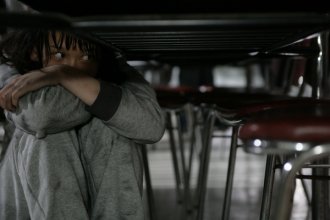 Another internal development is the Korean film industry's first ever labor deal, which is currently in the last stages of negotiation and scheduled to go into effect in July. There is widespread agreement among the Korean film community that lower-ranking crew members and other production staff have been treated in horrendous fashion throughout the modern-day boom. In general, such crew members receive very little pay and are compensated on a project basis, so that if a production fails to finish on schedule (as often happens), crew members work overtime for no extra pay. In worst-case scenarios, crew members have finished shooting a film and then never been paid for their work. The new labor deal will establish industry-wide standards for overtime pay and give workers increased leverage in settling disputes, so in one sense it is a highly welcome development. On the other hand, it is sure to result in a further rise in budgets, so Korea's "profitability problem" may get worse before it gets better.
Another internal development is the Korean film industry's first ever labor deal, which is currently in the last stages of negotiation and scheduled to go into effect in July. There is widespread agreement among the Korean film community that lower-ranking crew members and other production staff have been treated in horrendous fashion throughout the modern-day boom. In general, such crew members receive very little pay and are compensated on a project basis, so that if a production fails to finish on schedule (as often happens), crew members work overtime for no extra pay. In worst-case scenarios, crew members have finished shooting a film and then never been paid for their work. The new labor deal will establish industry-wide standards for overtime pay and give workers increased leverage in settling disputes, so in one sense it is a highly welcome development. On the other hand, it is sure to result in a further rise in budgets, so Korea's "profitability problem" may get worse before it gets better.
Producers are currently working hard to find solutions for the industry's problems, ranging from incentive-based pay to limiting the amount of money distributors spend on prints and marketing costs. More and more productions are being shot on HD video (such as My Scary Girl or Roommates, pictured above) or super 16mm (such as Family Ties) to help reduce costs. Still open to question is whether the salary demands of the industry's biggest stars will fall in response to the worsening environment. Indeed, many of the biggest star-centered productions of 2006 failed to excite viewers, suggesting that a strong story is what audiences really care about.
Korea has faced crises before, notably in 2002 after the spectacular crash of the big-budget films Yesterday, R U Ready? and Resurrection of the Little Match Girl. But many insist that this time is different. If there's any optimism to be gleaned from the current situation, it's that there is widespread agreement in the industry that its current problems need to be addressed. That, and the fact that Korean directors are as inspired as ever, and audiences still like to line up for the latest hot film.
Clear Skies, Troubled Waters: South Korean Cinema in 2005
In a memorable line from Song Neung-han's comedy classic No. 3 (1997), a gangster played by Han Suk-kyu says to his wife: "Take a swan, for example. It looks graceful and elegant above the water. But do you know what's happening underneath? Its feet are paddling away like hell! That's what life is."
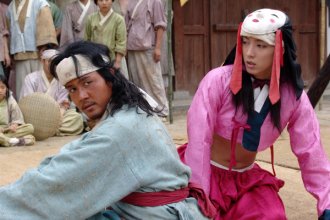 Such is also the usual state of the Korean film industry. On the surface, Korean cinema glided from hit to hit in 2005, on its way to another brilliant year in which it accounted for 60% of local ticket sales. Star-driven films such as April Snow and A Moment to Remember became strong hits in Japan, while on the festival circuit, a record seven Korean films screened at Cannes and Park Chan-wook's Sympathy For Lady Vengeance drew widespread notice at Venice. In October the Pusan International Film Festival celebrated its tenth edition in grand style, then in the final days of 2005 a modest film called King and the Clown was released which unexpectedly sold upwards of 11 million tickets, and which at the time of this writing looked likely to set a new all-time box office record.
Such is also the usual state of the Korean film industry. On the surface, Korean cinema glided from hit to hit in 2005, on its way to another brilliant year in which it accounted for 60% of local ticket sales. Star-driven films such as April Snow and A Moment to Remember became strong hits in Japan, while on the festival circuit, a record seven Korean films screened at Cannes and Park Chan-wook's Sympathy For Lady Vengeance drew widespread notice at Venice. In October the Pusan International Film Festival celebrated its tenth edition in grand style, then in the final days of 2005 a modest film called King and the Clown was released which unexpectedly sold upwards of 11 million tickets, and which at the time of this writing looked likely to set a new all-time box office record.
It was indeed a good year for Korean cinema in 2005, but a peek beneath the surface reveals a turbulent, unruly side to the industry as well. A public spat between producers and star management companies in the summer underlined some shifting power relationships in the industry. Labor issues have been simmering for some time, resulting in the establishment of the industry's first labor unions in December. Major conglomerates CJ Entertainment, Showbox and Lotte continued to consolidate their power, causing friction with smaller and mid-sized companies. One of the highest rates of internet piracy in the world has resulted in a DVD market that is described by some as "about to collapse." And most explosive of all has been the issue of Korea's Screen Quota system, which the South Korean government has decided to reduce by half from July 1 of this year.
But first, a discussion of the films. The production of large and small films alike has been booming over the past year. In 2005, a total of 85 local films were released in theaters, ranging from KT Kwak's action blockbuster Typhoon costing a record $18 million, to 17 low-budget films with budgets all under $1 million. The former is yet another example of the much-discussed "Korean blockbuster" -- high-concept, big-budget genre productions that over the past five or six years have failed more often than they have succeeded. The phenomenal success of Tae Guk Gi and Silmido in 2004 seemed to give the Korean blockbuster a second lease on life, yet 2005 must go down as yet another year in which most of the big, expensive pictures were outclassed and outgrossed by mid-sized fare.
 Typhoon, a multi-lingual, globetrotting action film about a man planning a terrorist attack on North and South Korea, was released on December 14 on the same day as King Kong. Nonetheless, despite an enthusiastic performance by top-ranked actor Jang Dong-gun (Tae Guk Gi, The Promise), the film's impressive special effects and overseas location shooting in Thailand and Vladivostok failed to generate any excitement among viewers. The film ended up selling 4.2 million tickets -- certainly not small change, but not enough to ensure a profit, and much less than its distributor CJ Entertainment was hoping for when it opened the film on a record 540 screens. Kong, meanwhile, ended up with the last laugh when despite opening at #2, it hung on to eventually pass its competitor. (South Korea is one of the few countries in the world where King Kong was the highest-grossing Hollywood movie released in 2005)
Typhoon, a multi-lingual, globetrotting action film about a man planning a terrorist attack on North and South Korea, was released on December 14 on the same day as King Kong. Nonetheless, despite an enthusiastic performance by top-ranked actor Jang Dong-gun (Tae Guk Gi, The Promise), the film's impressive special effects and overseas location shooting in Thailand and Vladivostok failed to generate any excitement among viewers. The film ended up selling 4.2 million tickets -- certainly not small change, but not enough to ensure a profit, and much less than its distributor CJ Entertainment was hoping for when it opened the film on a record 540 screens. Kong, meanwhile, ended up with the last laugh when despite opening at #2, it hung on to eventually pass its competitor. (South Korea is one of the few countries in the world where King Kong was the highest-grossing Hollywood movie released in 2005)
Other would-be blockbusters did even worse. Antarctic Journal, a fantasy/adventure/horror film centering around an expedition to the Point of Inaccessibility in Antarctica, cost $8.5 million to make but sold only about a million tickets. Shot in New Zealand, the film featured major stars Song Kang-ho (Memories of Murder) and Yu Ji-tae (Oldboy), but fans ridiculed the filmmakers for making a movie set in the Antarctic snow where nothing really happens.
The biggest loss-maker of the year is likely to be the $10 million Blue Swallow, a film that is much more accomplished from a cinematic point of view than the two works mentioned above, but which only managed to sell about 600,000 tickets. A biopic of Korea's first civilian female aviator, who lived in Japan in the 1920s, Blue Swallow tried to entice viewers with its relevance to real-life history, but ended up being blindsided by real-life history. Shortly before the film's release, accusations surfaced on the internet that the film's protagonist had in actuality engaged in pro-Japanese publicity stunts. Whatever the subtleties of the real-life situation may have been, it ended up giving viewers one more reason to go see King and the Clown (released on the same day) instead.
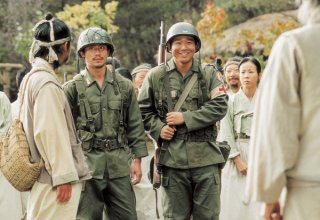 Yet there was one notable example of a blockbuster that soared above expectations, and indeed it became one of the top five grossing Korean films of all time. Welcome to Dongmakgol didn't have quite as high of a budget as the works mentioned above, but it was a film painted on a vast canvass with numerous special effects and extensive CGI. Based on a stage play by Jang Jin -- the director of Guns & Talks (2001) and Someone Special (2004), both of which were popular favorites in Udine -- Welcome to Dongmakgol was blockbuster in style but relied most heavily on the characterization and humor in its script. Almost a textbook example of how to do an effective Korean blockbuster, Dongmakgol was an instant hit with viewers of all ages and eventually topped 8 million admissions.
Yet there was one notable example of a blockbuster that soared above expectations, and indeed it became one of the top five grossing Korean films of all time. Welcome to Dongmakgol didn't have quite as high of a budget as the works mentioned above, but it was a film painted on a vast canvass with numerous special effects and extensive CGI. Based on a stage play by Jang Jin -- the director of Guns & Talks (2001) and Someone Special (2004), both of which were popular favorites in Udine -- Welcome to Dongmakgol was blockbuster in style but relied most heavily on the characterization and humor in its script. Almost a textbook example of how to do an effective Korean blockbuster, Dongmakgol was an instant hit with viewers of all ages and eventually topped 8 million admissions.
Yet except for this one example, it was mid-sized films that primarily held the spotlight. From the start of the summer until the end of the year, one or two films emerged in every month as a hot topic of conversation among young Koreans. In June it was Rules of Dating, a controversial and frank look at the line between lust and sexual harassment by debut director Han Jae-rim. With standout performances by Gang Hye-jung (Oldboy) and Park Hae-il (Memories of Murder), the film's off-color dialogue and unflinching attitude made it one of the year's standouts.
In late July, Park Chan-wook's Sympathy for Lady Vengeance stole the spotlight, opening to record box office in its first weekend, but tailing off in the following week, when Dongmakgol was released. August featured both Dongmakgol and yet another film based on a stage play by Jang Jin, this time directed by Jang himself. Murder, Take One is a look at the various personalities involved in a murder investigation, which a local broadcaster has decided to record on air in real time. Jang's unique verbal humour and comic timing, which separates him from any other Korean director, was on full display in this film, and it became a robust hit.
 September featured two major hits: comedy sequel Marrying the Mafia 2, which with over 6 million admissions did even better than the highly successful original film, and the critically acclaimed melodrama You Are My Sunshine, about a rural farmer who falls in love with and marries a local prostitute. The two films are an exercise in contrasts: the broad humor and lightheartedness of Mafia played well with audiences who seem to have missed the high-concept gangster comedies of 2001. Meanwhile, You Are My Sunshine is an over-the-top melodrama directed by Park Jin-pyo, better known for gritty, uncompromising low-budget independent films like Too Young To Die. If that last sentence seems to contradict itself, the film was nonetheless a refreshing blend of traditional melodramatic forms with a more modern, realist-based point of view. The film also featured the two most critically-praised performances of 2005, with Hwang Jeong-min (A Bittersweet Life) picking up a host of Best Actor honors for his portrayal of the farmer, and Jeon Do-yeon (Untold Scandal) also walking off with a fair number of trophies of her own.
September featured two major hits: comedy sequel Marrying the Mafia 2, which with over 6 million admissions did even better than the highly successful original film, and the critically acclaimed melodrama You Are My Sunshine, about a rural farmer who falls in love with and marries a local prostitute. The two films are an exercise in contrasts: the broad humor and lightheartedness of Mafia played well with audiences who seem to have missed the high-concept gangster comedies of 2001. Meanwhile, You Are My Sunshine is an over-the-top melodrama directed by Park Jin-pyo, better known for gritty, uncompromising low-budget independent films like Too Young To Die. If that last sentence seems to contradict itself, the film was nonetheless a refreshing blend of traditional melodramatic forms with a more modern, realist-based point of view. The film also featured the two most critically-praised performances of 2005, with Hwang Jeong-min (A Bittersweet Life) picking up a host of Best Actor honors for his portrayal of the farmer, and Jeon Do-yeon (Untold Scandal) also walking off with a fair number of trophies of her own.
October's standout proved to be All For Love, a film with a large ensemble cast that was marketed as sort of a Korean Love Actually, but which proved to be a bit more serious in tone. From second time director Min Kyu-dong, who co-directed the horror classic Memento Mori in 1999, the film juggled its many personalities and performances with skill. Much compared to Sad Movie, another ensemble piece with an all-star cast released in the same month, All For Love was judged by both critics and audiences to have come out on top.
 November saw a decent-sized hit in Kim Hyun-seok's unconventional romantic comedy When Romance Meets Destiny. The film is a perfect example of the art of good casting: often Korean audiences are far more drawn by mid-level stars in unexpected combinations, rather than big-name stars in conventional roles. The film centers around Kim Ju-hyuk (Singles) and Bong Tae-gyu (A Good Lawyer's Wife) as two brothers, opposite in character, who both experience romantic troubles. The film's convincing performances and clever screenplay, particularly in the first half, won over a large number of fans.
November saw a decent-sized hit in Kim Hyun-seok's unconventional romantic comedy When Romance Meets Destiny. The film is a perfect example of the art of good casting: often Korean audiences are far more drawn by mid-level stars in unexpected combinations, rather than big-name stars in conventional roles. The film centers around Kim Ju-hyuk (Singles) and Bong Tae-gyu (A Good Lawyer's Wife) as two brothers, opposite in character, who both experience romantic troubles. The film's convincing performances and clever screenplay, particularly in the first half, won over a large number of fans.
In late December and into January, it was the turn of King and the Clown. This mid-budget period drama about a pair of clowns who end up at the court of a mad king was seen as a commercially risky venture, particularly given an obvious gay subtext that pervades the film. Nonetheless its popularity was explosive from day one, and it ultimately passed the elusive 10 million admissions mark that had previously only been reached by big-budget military dramas. Part of the credit for the film's success has to go to young star Lee Joon-ki (Flying Boys), whose feminine demeanor and pretty face turned him into an object of worship among Korean schoolgirls. On the other hand, the film itself proved to be highly effective drama, particularly in its convincing re-enactments of traditional comic theater.
There was another story to the films of 2005, though, and this was the increasingly large number of low-budget films which managed to reach theaters. Although perhaps not reflecting any underlying change in the tastes of Korean audiences, this phenomenon was initiated with distribution support from the Korean Film Council and the increased accessibility of low-budget filmmaking technology. With the help of a theater network devoted to arthouse releases, 17 low-budget Korean films were released in 2005, compared to only 3 in 2004. The films themselves displayed a wide diversity, from the low-budget martial arts film Geochilmaru: The Showdown to the lightly comic Five Is Too Many -- about a woman who unwittingly acquires four eccentric roommates -- to The Unforgiven, which picked up multiple awards at Pusan for its critical take on life in the Korean military. With distribution support continuing in 2006, this year is expected to see another full crop of independent films.
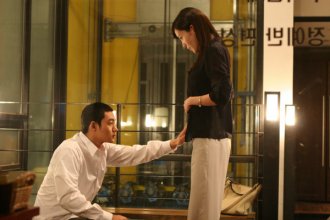 As in every year, there were also a significant number of films that, for whatever reason, were unfairly overlooked. Blossom Again, by director Jung Ji-woo (Happy End) probably stands at the head of this class. A touching and surprising drama about relationships and memory, the film's subtle brand of experimentation was neither arthouse enough to appeal to major festivals, nor commercial enough to appeal to audiences. Those who search the film out will be surprised and rewarded, however. Park Heung-shik's Bravo My Life, meanwhile, centers around one boy's early adolescence during the early 1980s, an era of political oppression and change. While the political elements of the film remain largely in the background, the film's light but sad tone indirectly sketches the problems faced by ordinary people living in a poor and authoritarian state. Finally, Oh Seok-geun's Love is a Crazy Thing provides an unusually clear-headed and engaging portrait of a Busan housewife who takes up work in the sex industry, anchored by a terrific, understated performance by Jeon Mi-seon.
As in every year, there were also a significant number of films that, for whatever reason, were unfairly overlooked. Blossom Again, by director Jung Ji-woo (Happy End) probably stands at the head of this class. A touching and surprising drama about relationships and memory, the film's subtle brand of experimentation was neither arthouse enough to appeal to major festivals, nor commercial enough to appeal to audiences. Those who search the film out will be surprised and rewarded, however. Park Heung-shik's Bravo My Life, meanwhile, centers around one boy's early adolescence during the early 1980s, an era of political oppression and change. While the political elements of the film remain largely in the background, the film's light but sad tone indirectly sketches the problems faced by ordinary people living in a poor and authoritarian state. Finally, Oh Seok-geun's Love is a Crazy Thing provides an unusually clear-headed and engaging portrait of a Busan housewife who takes up work in the sex industry, anchored by a terrific, understated performance by Jeon Mi-seon.
At the same time, however, 2005 saw a fair number of overly conventional works that relied on old formulas and star power in a bid for commercial success. Seeing this, some local critics are becoming more insistent in asking if Korean cinema is being spoiled by its commercial success. Certainly, the vast amounts of money being poured into the film industry, from large conglomerates like CJ Entertainment and Showbox to giant telecoms companies such as SK Telecom and KTF, have raised questions about the links between big business and creativity. Could commercial success come to ruin the Korean film industry, by turning the filmmaking process into an overly formulaic, commercially-oriented activity? Such concerns are particularly pressing for debut filmmakers -- whereas established directors such as Park Chan-wook or Bong Joon-ho are given a great deal of artistic freedom, young directors making their first film must often adhere to a more mainstream, commercial line.
It's worth noting, however, that the biggest buzz films of 2005 -- which in many cases expressed a more individualistic character -- were virtually all the work of experienced, respected producers. The role of the producer is often overlooked in the filmmaking process, but on average it is probably the best predictor of a film's creative and box-office success, at least within the realm of Korean commercial cinema (smaller-scale, independent film is another matter). In that sense, it's interesting that many of Korea's most accomplished producers are in the process of gaining a bit more independence from the big conglomerates. Tcha Seung-jai's Sidus Pictures merged with Kim Mi-hee's Fun & Happiness in 2005, and is predicted to launch its own distribution arm in the second half of this year. MK Pictures, formed from the merger of Myung Films and KangJeGyu Films in 2004, also launched its own distribution arm last year after creating several film investment funds.
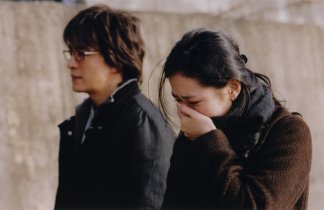 As for other industry trends in 2005, perhaps the biggest one was the rising importance of stars. While a major star is no guarantee of box office success in Korea (see Antarctic Journal, Duelist, Sad Movie, etc.), it can without question guarantee a much higher selling price to Japan. Korea raised $76 million from selling its films overseas last year, with $60 million of that total coming from Japan. The sudden craze for Korean pop culture in Japan is having a huge effect on the Korean industry -- a film like April Snow serves as a perfect example. Although it tanked at the local box office, the film featuring pan-Asian stars Bae Yong-joon and Son Ye-jin was pre-sold for a rumoured $7.5 million to Japan, ensuring that it would make a profit anyway. The film went on to earn $23.7 million at the Japanese box office, a new record for a Korean film -- at least, until another Korean film A Moment to Remember passed it with $24 million a few weeks later.
As for other industry trends in 2005, perhaps the biggest one was the rising importance of stars. While a major star is no guarantee of box office success in Korea (see Antarctic Journal, Duelist, Sad Movie, etc.), it can without question guarantee a much higher selling price to Japan. Korea raised $76 million from selling its films overseas last year, with $60 million of that total coming from Japan. The sudden craze for Korean pop culture in Japan is having a huge effect on the Korean industry -- a film like April Snow serves as a perfect example. Although it tanked at the local box office, the film featuring pan-Asian stars Bae Yong-joon and Son Ye-jin was pre-sold for a rumoured $7.5 million to Japan, ensuring that it would make a profit anyway. The film went on to earn $23.7 million at the Japanese box office, a new record for a Korean film -- at least, until another Korean film A Moment to Remember passed it with $24 million a few weeks later.
Such forces have transformed the mathematics involved in making a film in Korea. With the casting of a hallyu ("Korean Wave") star starting to resemble a license to print money, a struggle is emerging between producers and the talent management companies who represent stars. In particular, management companies' insistence on co-production status for films featuring their actors -- which guarantees a percentage of a film's profits -- caused producers to lash out in a widely-publicized press conference. Indeed, under US laws (designed to protect actors, not producers), such practices would be illegal. Eventually, the two sides met for discussions and resolved their differences to a certain extent. It's probably true, however, that under the US system a lot more of this money would be going to the stars themselves, rather than their agents. In many respects, Korean cinema has developed so fast over the past 5-6 years that proper regulations have not yet been put in place to guide its growth.
Concerns about regulations and film policy have now taken center stage, after the decision by the Korean government in late January to reduce the nation's Screen Quota system to 73 days. The Screen Quota obligates Korean theaters to screen local films for a certain number of days per year -- until now the official level has been set at 146 days, although due to various reductions the actual level ranges from 106-126 days. The regulation is Korea's best-known form of protection against domination by foreign (i.e. Hollywood) cinema, and as such the U.S. has been pressuring Korea for years to reduce or scrap it. U.S. trade negotiators finally found the stick they needed this year when it linked a reduction of the Screen Quota to the opening of talks on a Korea-U.S. free trade agreement.
The announcement that the quota would be halved was met with fury by many members of the film industry, and Seoul has been witness to demonstrations, candlelight vigils and one-man protests by actors and directors ever since. Rhetoric surrounding the quota has taken on a strongly political character, as the quota's fate has implications not only for Korea but for other countries around the world who wish to keep protective measures for local cinema.
The future effect on the Korean film industry of a quota reduction is hard for anyone to predict, given the current success of local films and the indirect way in which the quota works. Although even supporters of the quota admit that there is unlikely to be much of an influence in the next few years, the real test will come in ten or twenty years. Will Korean cinema be able to remain vibrant and healthy even without the quota system? Only time will tell.
Uneasiness at Home: South Korean Cinema in 2004
South Korean cinema has lived through mixed fortunes in the past twelve months, with bad news often seeming to crowd out the good. Although the industry made some key strides overseas in 2004, at home a sense of uneasiness seemed to prevail. Talk has focused on turmoil at the box office, in the courts, in the festival community and on the distribution circuit. Nevertheless, ordinary Koreans' love affair with cinema continues unabated, and the amount of attention that the film industry receives from the press, business community and government circles has remained at extraordinary levels.
After the phenomenal selection of films that debuted in 2003, including Old Boy, Memories of Murder, Save the Green Planet, A Good Lawyer's Wife, A Tale of Two Sisters, A Good Lawyer's Wife, and Spring Summer Fall Winter... and Spring, it's perhaps not surprising to hear that most critics considered 2004 to be a disappointment. Despite the highlights, such as Kim Ki-duk's Best Director award at Venice for 3-Iron, or Kim Dong-won's prize-winning documentary Repatriation about long-term prisoners of conscience, the films of 2004 seemed to be more commercially oriented and less director-driven.
Meanwhile, movements by some of Korea's biggest distributors reinforced the sense that the industry was growing more commercialized. Most prominently, leading distributor CJ Entertainment solidified its power at the top by acquiring large shares in rival distributor Cinema Service and rival exhibition chain Primus Cinema. Critics charged CJ with pursuing a "dictatorial" strategy, and were little assuaged when the company announced new measures to support independent and arthouse films. At the same time, distributor Showbox -- which like CJ is part of an enormous food conglomerate -- emerged as a powerful new player in the industry, reinforcing the view that Korea's chaebol (major conglomerates) are the dominant power brokers in the film industry.
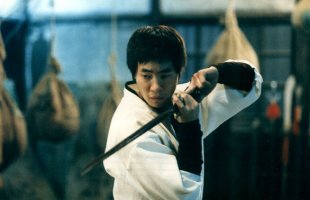 Yet despite such concerns over the direction of the industry, a close look at the films of 2004 -- including some that failed at the box office -- reveals many features that embrace the conventions of genre cinema while also pushing forward in new creative directions. Ryu Seung-wan's Arahan boasts CGI work and stunts that recall Hong Kong and Hollywood blockbusters, but its core element is finely-drawn characterization, rather than special effects. Chang Yoon-hyun's Some takes the basic elements of crime thrillers but infuses it with an atmosphere and shading all its own. With Flying Boys, a coming of age drama about high school seniors, the experiences of the main characters gain depth through the director's candid, understanding perspective.
Yet despite such concerns over the direction of the industry, a close look at the films of 2004 -- including some that failed at the box office -- reveals many features that embrace the conventions of genre cinema while also pushing forward in new creative directions. Ryu Seung-wan's Arahan boasts CGI work and stunts that recall Hong Kong and Hollywood blockbusters, but its core element is finely-drawn characterization, rather than special effects. Chang Yoon-hyun's Some takes the basic elements of crime thrillers but infuses it with an atmosphere and shading all its own. With Flying Boys, a coming of age drama about high school seniors, the experiences of the main characters gain depth through the director's candid, understanding perspective.
It may seem ridiculous to say that 2004 was a mixed year at the box office, when local exhibitor CGV estimates a record 60% market share for local films (the Korean Film Council posits a more conservative 57%). Certainly it was not a weak year, but it was somewhat lopsided: the numbers are skewed by the tremendous dominance enjoyed by local cinema from January to April, when Silmido and Tae Guk Gi racked up an unprecedented 11 million admissions each. In contrast, no Korean film released after May 1 managed to reach the 3 million admissions mark.
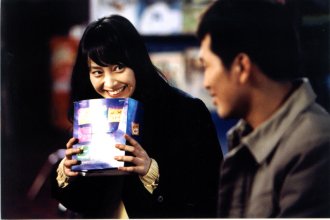 The peak summer season in particular opened with high expectations among Korean film companies, but an uncommonly large number of local releases (12 between June 25 and July 30 alone, not to mention the major Hollywood titles) meant fierce competition for viewers and mostly dashed hopes. Two worthy titles among this crowd that struggled to sell tickets were Jang Jin's Someone Special
-- a relationship comedy that delighted critics with its offbeat humor and memorable characters -- and the sleek, sexy comedy Everybody Has Secrets, featuring one of Korea's best known stars in Lee Byung-heon. Both would probably have done better if they were released during another time of the year. Faring somewhat better in August were two films that played with the horror genre. Military horror film R-Point, set during the Vietnam War and shot in Cambodia, marked the successful debut of screenwriter Kong Su-chang, with a chilling story that managed to be both scary and politically relevant at the same time. Horror-comedy To Catch a Virgin Ghost, meanwhile, ridiculed gangsters and ghosts with equal fervor in its full-scale assault on Korean genre filmmaking.
The peak summer season in particular opened with high expectations among Korean film companies, but an uncommonly large number of local releases (12 between June 25 and July 30 alone, not to mention the major Hollywood titles) meant fierce competition for viewers and mostly dashed hopes. Two worthy titles among this crowd that struggled to sell tickets were Jang Jin's Someone Special
-- a relationship comedy that delighted critics with its offbeat humor and memorable characters -- and the sleek, sexy comedy Everybody Has Secrets, featuring one of Korea's best known stars in Lee Byung-heon. Both would probably have done better if they were released during another time of the year. Faring somewhat better in August were two films that played with the horror genre. Military horror film R-Point, set during the Vietnam War and shot in Cambodia, marked the successful debut of screenwriter Kong Su-chang, with a chilling story that managed to be both scary and politically relevant at the same time. Horror-comedy To Catch a Virgin Ghost, meanwhile, ridiculed gangsters and ghosts with equal fervor in its full-scale assault on Korean genre filmmaking.
The fall season also failed to match expectations. The Chuseok holiday in September, Korea's biggest holiday and a key release date for local films, underperformed compared to the previous year, with only Kim Sang-jin's Ghost House doing well (and even it was not up to the level of his previous films). Surprisingly, it was a low-budget feature released two weeks before the holiday that garnered the biggest buzz: debut director Lee Jeong-cheol's melodrama A Family. While most Korean films in 2004 opened well and quickly faded, A Family -- about the troubled relationship between a single father and his daughter just released from prison -- ranks as perhaps the only genuine word-of-mouth hit of the year.
In October, November and December as well, total box office failed to match the levels of 2003. This is significant, as theatrical admissions have shown strong, constant growth since 1999 due to the revival in local filmmaking and aggressive construction of new multiplexes. Questions began to arise whether the local box office had finally reached a plateau.
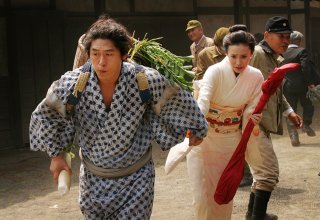 The low point, perhaps, came on December 15 with the commercial failure of Korean-Japanese co-production Rikidozan -- which at $10m ranks as one of the most expensive Korean films ever made. The story of real-life professional wrestler Rikidozan -- an ethnic Korean who became a national hero in 1950s Japan -- boasted a magnificent, bilingual turn by leading actor Sol Kyung-gu, but failed to spark with audiences. The month of December ended up having the lowest local market share in four years, as Korea's demanding viewers turned to works from other countries.
The low point, perhaps, came on December 15 with the commercial failure of Korean-Japanese co-production Rikidozan -- which at $10m ranks as one of the most expensive Korean films ever made. The story of real-life professional wrestler Rikidozan -- an ethnic Korean who became a national hero in 1950s Japan -- boasted a magnificent, bilingual turn by leading actor Sol Kyung-gu, but failed to spark with audiences. The month of December ended up having the lowest local market share in four years, as Korea's demanding viewers turned to works from other countries.
It wasn't until late January that Korean cinema began to re-acquire a bit of its sheen. Jeong Yun-cheol's Marathon, about an autistic boy who dreams of running a marathon, struck the perfect balance of sentiment and social relevance for local audiences, and was rewarded with a box office run that easily powered past 4 million admissions. Also released on the same day was Another Public Enemy, Kang Woo-suk's sequel to his 2002 hit (and FEFF closing film) Public Enemy. Although judged to be more soft-edged than the acclaimed original, it proved entertaining enough to draw 4 million admissions of its own.
But important to remember in any discussion of the Korean box office is that despite the sometimes gaudy numbers put up by the theatrical sector -- the average Korean film from 2004 earned a surprising $5.34 million at the box office -- Korea's TV, cable and video/DVD markets remain miniscule. Online piracy and high prices have stunted the DVD sector, which is dominated by rentals rather than sell-through. Surveys indicate that only 29% of the two million households that own a DVD player have ever bought a DVD. Whereas US or European releases can double their revenues on DVD sales alone, Korea more resembles the US in the 1970s, when films had to earn two and a half times their budget in theaters just in order to break even.
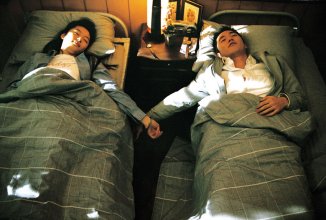 Korea's weak ancillary markets mean that international sales are becoming ever more important, and here was one area that showed grounds for optimism. The big news was in Japan, where a sudden surge of popularity for Korean pop culture set off big reverberations back home. Much of the attention was focused on actor Bae Yong-joon, star of the TV drama Winter Sonata which garnered a cult following in Japan, particularly among middle-aged female viewers. Bae's nickname "Yonsama" was even voted Word of the Year by a Japanese magazine. But the enthusiasm spread to other actors and films as well. In late December, Kwak Jae-yong's Windstruck starring Jeon Ji-hyun was given a wide-scale opening and ultimately passed Shiri to become the best-selling Korean film ever released in Japan.
Korea's weak ancillary markets mean that international sales are becoming ever more important, and here was one area that showed grounds for optimism. The big news was in Japan, where a sudden surge of popularity for Korean pop culture set off big reverberations back home. Much of the attention was focused on actor Bae Yong-joon, star of the TV drama Winter Sonata which garnered a cult following in Japan, particularly among middle-aged female viewers. Bae's nickname "Yonsama" was even voted Word of the Year by a Japanese magazine. But the enthusiasm spread to other actors and films as well. In late December, Kwak Jae-yong's Windstruck starring Jeon Ji-hyun was given a wide-scale opening and ultimately passed Shiri to become the best-selling Korean film ever released in Japan.
These days, many Korean films -- particularly those with a star cast -- raise much or most of their budgets through a sale to Japan. In 2004, total revenues from international sales totaled $58m (an 88% rise from the previous year), and the Japanese market accounted for $40m of that total. In 2005, the totals are expected to rise even higher. As a result, no big-budget Korean film is made in the present day without seriously considering how it will be received in Japan.
In the meantime, Korean pop culture continues to receive attention in the rest of Asia. A recent report claimed that Korean content accounts for over a quarter of the imported films and TV dramas screened on Chinese television, more than any other country besides the US. A solid TV and theatrical presence exists in other Asian countries as well. Yet it is worth asking amidst all the attention over the so-called Korean Wave or "hallyu" phenomenon, whether it marks a genuine exchange between Korea and other countries, or if "hallyu" is just a one-way street. Asian pop culture still draws very little interest in Korea itself, particularly in regard to music and television. Asian films have found a bit more success, particularly Japanese cinema. The past year saw the major success of Howl's Moving Castle -- which sold over 3 million tickets ($18m) -- and the encouraging minor success of Inudo Isshin's Josee, the Tiger and the Fish, which opened on just a few screens but enjoyed an unprecedented three month run. On the whole however, Asian films outside of big-budget fare like Kung Fu Hustle face an uphill climb in Korea.
Apart from box-office and industry trends, the past year has seen more than its fair share of "incidents". One of the most damaging was the abrupt turmoil that befell the country's second most famous film festival, the Puchon International Fantastic Film Festival (PiFan). In December, citing reasons that in retrospect seem questionable, the mayor of the city abruptly dismissed popular festival director Kim Hong-joon, and in the face of strong protest from members of the film industry, fired the programming team, announcing that the upcoming edition would be held without a festival director. As talk of a boycott spreads throughout the film industry, the end result has been that the significant progress made by PiFan over the past eight editions has disintegrated, and Korea now in effect has one less major festival. Kim and his programmers, meanwhile, are in negotiations to set up a rival event in a different city.
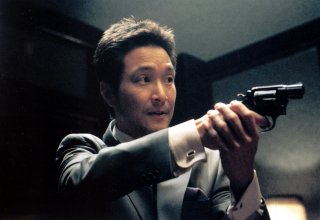 In January, an even bigger news story arrived with the first screening of a film titled The President's Last Bang. Directed by Im Sang-soo, whose A Good Lawyer's Wife competed at Venice in 2003, the film is centered around the death of Korea's most famous military ruler Park Chung-hee in 1979, when his chief of intelligence unexpectedly shot him. Im's film, a black comedy which mixes fact and fiction, outraged conservative critics, including Park's daughter who now serves as the head of Korea's center-right opposition party. A lawsuit filed by Park's son to block the film's release was thrown out by a Seoul Central Court judge, however the judge set off a storm when he ordered that the director remove four minutes of documentary footage from the film, as it could potentially "confuse" viewers about fact and fiction. The ruling has re-opened debate about the need to protect freedom of expression in Korean society, and lost amidst all the noise and protest is the fact that Im has made a masterful film that looks back on history in a completely new way.
In January, an even bigger news story arrived with the first screening of a film titled The President's Last Bang. Directed by Im Sang-soo, whose A Good Lawyer's Wife competed at Venice in 2003, the film is centered around the death of Korea's most famous military ruler Park Chung-hee in 1979, when his chief of intelligence unexpectedly shot him. Im's film, a black comedy which mixes fact and fiction, outraged conservative critics, including Park's daughter who now serves as the head of Korea's center-right opposition party. A lawsuit filed by Park's son to block the film's release was thrown out by a Seoul Central Court judge, however the judge set off a storm when he ordered that the director remove four minutes of documentary footage from the film, as it could potentially "confuse" viewers about fact and fiction. The ruling has re-opened debate about the need to protect freedom of expression in Korean society, and lost amidst all the noise and protest is the fact that Im has made a masterful film that looks back on history in a completely new way.
Finally, the saddest incident of all took place on February 22, when popular actress Lee Eun-ju, who had starred in nine films including Virgin Stripped Bare by her Bachelors (2000), Bungee Jumping of Their Own (2001), and Korea's box-office record holder Tae Guk Gi (2004), was found dead in her apartment after committing suicide. The 24-year old Lee had been suffering from depression for close to a year, and her death came as a shock for the entire country. Lee will be remembered for the intelligence, talent, and passion she brought to all of her roles.
If the past twelve months have not been the brightest, the upcoming year seems to offer much more in the way of hope. A look through the list of upcoming releases by established and upcoming directors reveals a broad range of ambitious and exciting projects. New technologies may offer opportunities to lesser-known filmmakers, in particular a joint effort by broadcaster KBS and the Korean Film Council to support low-budget features shot on HD. And finally, the best reason to retain hope for the future creativity of Korean cinema is the current attitude of Korean viewers. As audiences grow more demanding -- supporting the likes of Old Boy and turning their backs on formulaic comedies -- then directors and producers will be pushed to keep on experimenting.
Well-Made: South Korean Cinema in 2003
Korean cinema continued to boom in 2003. Despite worries at the start of the year about out-of-control budgets and nervous investors, local movies dominated screens and raked in a record amount of money at the box-office. An estimated 53% of all tickets sold were to Korean films -- compared to less than 43% for Hollywood titles -- and eight of the top ten selling films of the year were made locally. Worldwide, only the U.S. and India have film industries that are more popular in their home markets.
Nonetheless there was something different in the air last year, compared to the similarly successful years of 2002 and 2001. Signs began to emerge that audience tastes were changing, as the inexpensive comedies that used to dominate the box-office started to lose strength relative to more serious or stylish works by Korea's commercial auteurs.
In 2003, "well-made" (spoken in English) became the new buzzword among producers and executives in the Korean film industry. Producer Kim Seung-beom of Tube Entertainment noted in July that "Korean audiences are demanding more quality from local films these days." Viewer buzz began centering less on "that was funny" and more on "that was well-made." According to Kim So-hee, editor of local film magazine Cine21, "well-made" in this context usually means a commercial feature that makes use of defined genres and the star system, but which contains both a distinctive directorial style and commentary on social issues. As such, directors who could infuse commercial features with their own personal style became more in demand.
 It all began with late April with Bong Joon-ho's Memories of Murder (which has since won the Best Director prize at the San Sebastian International Film Festival, and the Best Screenplay and Audience awards at Torino). Based on a real-life string of murders in rural Korea during the 1980s, Bong's nuanced, frightening and thought-provoking work became an unexpected smash hit, selling over 5 million tickets. Many viewers commented that they hadn't seen a commercial film of such impact and quality since Joint Security Area in 2000.
It all began with late April with Bong Joon-ho's Memories of Murder (which has since won the Best Director prize at the San Sebastian International Film Festival, and the Best Screenplay and Audience awards at Torino). Based on a real-life string of murders in rural Korea during the 1980s, Bong's nuanced, frightening and thought-provoking work became an unexpected smash hit, selling over 5 million tickets. Many viewers commented that they hadn't seen a commercial film of such impact and quality since Joint Security Area in 2000.
From then on, audiences turned a string of other challenging "well-made" films into box-office smashes, from Kim Jee-woon's stylish and frighteningly complex horror film A Tale of Two Sisters; to Im Sang-soo's risque and at times shocking Venice competition film A Good Lawyer's Wife; to E J-yong's elegant Untold Scandal (an adaptation of Dangerous Liaisons transposed to 18th-century Korea); to the brilliantly inventive Old Boy from director Park Chan-wook (Sympathy for Mr. Vengeance), which is expected to get its international premiere at the 2004 Cannes film festival.
The strength of such films has caused filmmakers and investors to rethink some commonly-accepted beliefs about making films in Korea. With high-concept comedies no longer dominating other genres at the box-office, producers and directors are searching out new topics and styles that may appeal to audiences. "In Korea there used to be a jinx that costume dramas, sports movies, and movies about animals would never succeed," notes E J-yong, who proved that jinx wrong with costume drama Untold Scandal. Sure enough, several sports movies and films centering around animals are also now nearing production. Not only are filmmakers exploring new topics, but film companies are also re-thinking common practices in film production.
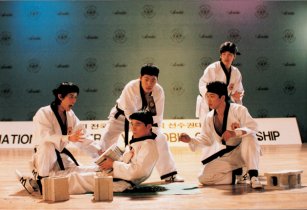 In recent years, industry watchers have distinguished between three different approaches to making films in Korea. One is the producer-oriented project, which is usually built around a catchy central concept. Generally quite inexpensive to make (about $2m on average, with 3-4 months of shooting time), these films dominated the box-office in 2001 and 2002. One advantage of these types of projects is that they usually manage to draw viewers even with only mid-level stars, so productions don't have to search out top-name talent. Films such as Hi, Dharma (2001) and Sex is Zero (2002) are good examples of such works.
In recent years, industry watchers have distinguished between three different approaches to making films in Korea. One is the producer-oriented project, which is usually built around a catchy central concept. Generally quite inexpensive to make (about $2m on average, with 3-4 months of shooting time), these films dominated the box-office in 2001 and 2002. One advantage of these types of projects is that they usually manage to draw viewers even with only mid-level stars, so productions don't have to search out top-name talent. Films such as Hi, Dharma (2001) and Sex is Zero (2002) are good examples of such works.
In contrast, director-oriented projects focus on a well-developed screenplay and a director's individual style. They are more expensive to make ($3 million on average), and employ highly experienced crew members and big-name stars, who often prefer working on projects that test their acting abilities. "If you have a good director and good screenplay, then you can find a strong cast, and with enough financing you can do well commercially," says Tcha Seung-jai of Sidus Corporation, one of Korea's top production companies. Director-oriented projects like Happy End (1999) and Friend (2001) have been successful in the past, but they had fallen out of favor by 2002. Last year gave investors new confidence in this sort of film, however. Most of the "well-made" films of 2003 fall into this category.
 The final type of project is the Korean blockbuster, which reached the nadir of respectability in 2003. Costing about $6m on average, the blockbuster focuses its attention on mise-en-scene and special effects. Big-name stars have not been actively sought out in the past, but instead filmmakers tried to attract audiences with high production values and a new kind of imagery. Nonetheless this has been the least successful sort of project in recent years, with films like Yesterday and R U Ready? losing tremendous amounts of money for their investors. The trend continued into late 2003 with action movie Tube, animated blockbuster Wonderful Days and the science fiction title Natural City.
The final type of project is the Korean blockbuster, which reached the nadir of respectability in 2003. Costing about $6m on average, the blockbuster focuses its attention on mise-en-scene and special effects. Big-name stars have not been actively sought out in the past, but instead filmmakers tried to attract audiences with high production values and a new kind of imagery. Nonetheless this has been the least successful sort of project in recent years, with films like Yesterday and R U Ready? losing tremendous amounts of money for their investors. The trend continued into late 2003 with action movie Tube, animated blockbuster Wonderful Days and the science fiction title Natural City.
In the beginning of 2003, all of the "smart money" in the industry was pouring into producer-centered works, yet for the most part these films ended up making less money than director-centered projects. In an industry where the director retains a fair amount of influence compared to other countries, 2003 tilted the balance of power even more in the director's favor.
Then came early 2004, when two giants crashed into the industry, changing everything in their path. Silmido by director Kang Woo-suk (the founder of one of Korea's most powerful film companies Cinema Service) tells the story of 31 death row convicts who were taken by the South Korean government to a remote island and trained to assassinate North Korean leader Kim Il-sung. Based on a true story, the film was a colossal hit, setting a new all-time record by selling over 10 million tickets. The attention drawn by the movie also forced the government's intelligence agency to answer new questions about the past cover-up of the incident.
 Then in February, Taegukgi by director Kang Je-gyu (of Shiri fame) premiered to an even bigger storm at the box-office. A fictional story of two brothers set during the Korean War, the film featured elaborately-staged battle scenes and detailed reconstructions of 1950s-era cities. The most expensive Korean film ever with a budget of $12m, Taegukgi easily vaulted over the box-office records set by Silmido a month before, and some estimates predicted it would earn $95m in Korea alone by the end of its box-office run. Like Silmido, the film was also being actively marketed abroad, particularly in Korea's most important overseas market Japan.
Then in February, Taegukgi by director Kang Je-gyu (of Shiri fame) premiered to an even bigger storm at the box-office. A fictional story of two brothers set during the Korean War, the film featured elaborately-staged battle scenes and detailed reconstructions of 1950s-era cities. The most expensive Korean film ever with a budget of $12m, Taegukgi easily vaulted over the box-office records set by Silmido a month before, and some estimates predicted it would earn $95m in Korea alone by the end of its box-office run. Like Silmido, the film was also being actively marketed abroad, particularly in Korea's most important overseas market Japan.
In some ways, these two films can be considered a new approach to filmmaking that combines the director-centered project with the blockbuster. Unlike other blockbusters of recent years, both these films featured top stars in the lead roles and contained the signature styles of their respective directors. Both also touched on serious issues from Korea's history which still resonate with contemporary viewers.
The local media has quickly proclaimed a new "era of 10 million admissions" for the local film industry. Most significant about the box-office performance of the two films was the number of older viewers drawn to the theater, in a country where most people stop going to the movies after getting married. Reporters walking through the crowds in front of local multiplexes found significant numbers of older people who were going to the movies for the first time in twenty or thirty years. Many executives in the film industry hoped it would not be their last. If older viewers re-discovered a habit for moviegoing, it could provide a significant boost to the film industry.
There were, of course, negative aspects to these two films' success. Smaller films are finding it increasingly difficult to secure a release in Korea, and even those that do fairly well are often dropped by theaters after just a couple weeks. For bigger productions, the need for wider and wider releases is also weakening overall profitability. A report by the Korean Film Commission suggested that despite the strength of local cinema, the average Korean film still ends up losing about $300,000.
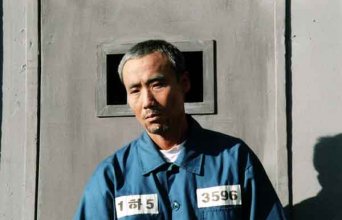 In looking back over the past year, we see a fair number of distinctive, interesting productions that have been overlooked by audiences or critics. The Road Taken is a low-budget film about long-term prisoners of conscience in South Korean jails, who spent up to 45 years in prison while refusing to renounce their Communist beliefs. Moving and illuminating, the film nonetheless bombed at the box-office and has been overlooked by international festivals. Legend of the Evil Lake is the remake of a 1969 swordplay fantasy by Shin Sang-ok, shot in China with a mixed Chinese-Korean crew. Although it failed commercially, the film is visually arresting and is shot on a scale rarely seen in Korean cinema. The curiously-titled ...ing, meanwhile, features one of the most memorable mother-daughter relationships in recent years in a very moving story of a teenage girl with medical troubles.
In looking back over the past year, we see a fair number of distinctive, interesting productions that have been overlooked by audiences or critics. The Road Taken is a low-budget film about long-term prisoners of conscience in South Korean jails, who spent up to 45 years in prison while refusing to renounce their Communist beliefs. Moving and illuminating, the film nonetheless bombed at the box-office and has been overlooked by international festivals. Legend of the Evil Lake is the remake of a 1969 swordplay fantasy by Shin Sang-ok, shot in China with a mixed Chinese-Korean crew. Although it failed commercially, the film is visually arresting and is shot on a scale rarely seen in Korean cinema. The curiously-titled ...ing, meanwhile, features one of the most memorable mother-daughter relationships in recent years in a very moving story of a teenage girl with medical troubles.
In terms of genre, 2003 was seen as somewhat of a down year for Korean comedies, with several notable exceptions including relationships comedy Singles, which was adapted from a Japanese TV drama and which became a mid-summer hit; and the period-set Once Upon a Time in a Battlefield which spoofed historical battles between rival kingdoms in 7th century Korea. Horror films saw a strong rebound, however. Summer is considered a traditional time of year to watch horror films in Korea, and the industry responded with four mid-summer scare fests that included A Tale of Two Sisters, Wishing Stairs, The Uninvited, and Into the Mirror. Although the latter two may not be horror films in the traditional sense, they were strongly marketed as such in order to appeal to the summer crowds.
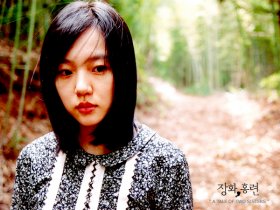 Some interesting new talent also emerged in 2003. Actress Im Su-jeong of A Tale of Two Sisters and ...ing is now widely recognized as an emerging star and the most talented of the actresses to debut in 2003. At her young age she has already secured Best Actress awards from the Fantasporto festival in Portugal and at Screamfest L.A.
Some interesting new talent also emerged in 2003. Actress Im Su-jeong of A Tale of Two Sisters and ...ing is now widely recognized as an emerging star and the most talented of the actresses to debut in 2003. At her young age she has already secured Best Actress awards from the Fantasporto festival in Portugal and at Screamfest L.A.
As for directors, Jang Jun-hwan has won multiple awards locally and a Best Director prize at Moscow for his brilliant Save the Green Planet, about a man who kidnaps a company president believing him to be an alien plotting to destroy the earth. Other notable directorial debuts in 2003 include Lee Su-yeon with The Uninvited, Kim Sung-ho with Into the Mirror, legendary porn director Bong Man-dae with his first mainstream commercial feature Sweet Sex and Love, theatre director Lee Youn-taek with his first film Ogu, and Lee Eon-hee with the drama ...ing.
Local cinema these days attracts an almost unprecedented amount of attention in Korea, and this is reflected in the large number of new film students, crew members, and outside companies who have decided to enter the film industry. High levels of competition and a quickly changing industrial landscape mean that 2004 will likely contain a similar level of turbulence and unpredictability for the people who make Korean films. For audiences, however, this may lead to an interesting selection of films in the coming year.
Leap of Faith: South Korean Cinema in 2002
The year 2001 was such a great leap forward for Korean movies that many people greeted 2002 with a sense of apprehension. Industry watchers were skeptical that local cinema could continue to capture 49% of the market, as it did in 2001, or to produce hits on the level of Friend (8 million admissions) or My Wife is a Gangster (5.2 million admissions). Yet film companies were betting on success, as budgets continued to rise, meaning that many films would have to sell millions of tickets just to break even. If 2001 turned out to be a one-year fluke, then the industry would be in trouble.
With the results in, we can safely say that Korean audiences continued to support local cinema in 2002. Market share for Korean films amounted to 47%, just a shade below 2001, and an impressive 25 films earned at least $3m at the box-office. International audiences provided support as well, with local companies earning a record $15m through sales to foreign countries (a 33% rise from 2001).
 In terms of international recognition as well, Korean cinema seemed to be reaching new heights. The year 2002 will be remembered for three major prizes won at international film festivals: veteran director Im Kwon-taek's Best Director award at Cannes for Chihwaseon; animated film My Beautiful Girl Mari's Grand Prix at the top-ranked Annecy International Animated Film Festival; and two awards presented to Oasis at Venice: Best Director for Lee Chang-dong, and the Marcello Mastroianni Award for Best New Actor or Actress to Moon So-ri.
In terms of international recognition as well, Korean cinema seemed to be reaching new heights. The year 2002 will be remembered for three major prizes won at international film festivals: veteran director Im Kwon-taek's Best Director award at Cannes for Chihwaseon; animated film My Beautiful Girl Mari's Grand Prix at the top-ranked Annecy International Animated Film Festival; and two awards presented to Oasis at Venice: Best Director for Lee Chang-dong, and the Marcello Mastroianni Award for Best New Actor or Actress to Moon So-ri.
Nonetheless, there was a lot of blood spilled in the industry last year. Several high budget genre films bombed in spectacular fashion, losing millions of dollars for their investors. Three movies in particular gained infamy for their steep losses: the futuristic sci-fi film Yesterday, family adventure R U Ready? and cyber-action film Resurrection of the Little Match Girl. Together these three films cost $21 million to make, and sold only $3.5 million worth of tickets.
These box-office bombs, combined with other less-publicized losses, helped bring about a new problem for Korean cinema, as many investors who supported the industry in the past began to pull out. The profitability of local cinema has taken a hit in recent years, as labor costs, star salaries, and advertising budgets have all shot up. As a result, even films that did moderately well at the box-office often ended up losing money for their investors. With venture capitalists having turned highly skeptical towards investments in cinema, only a few large film companies have enough cash on hand to continue making movies as they wish.
In the coming year, this is likely to shape the character of the films that get made. Although a few big-budget genre titles are in the works, many film companies are turning towards less-expensive comedies and melodramas which come with less financial risk. One example of this is director Kim Sung-soo, who brought his lavish production Musa to last year's FEFF. For his next project, after considering a big-budget historical war film to be shot in China, he decided to shoot his first ever comedy, titled Please Teach Me English and featuring two up-and-coming young stars. Shooting starts this April.
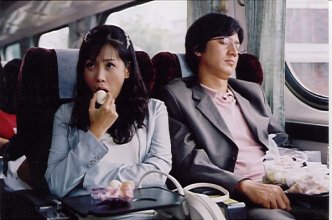 Looking back to 2002, comedies dominated the box-office, as in previous years. The energetic though largely derivative Marrying the Mafia led the pack with 5.1m admissions, continuing the trend of gangster films which performed so well in 2001. Other comedies broke into new territory: sex comedies made their first-ever appearance in Korea, first with Wet Dreams and then with the hugely successful Sex is Zero by up-and-coming director/screenwriter Yoon Je-gyun. Meanwhile director Kim Sang-jin, well-known for his previous movies Kick the Moon and Attack the Gas Station, returned with Jail Breakers, a manic tale of two convicts who tunnel their way out of prison, only to discover a nasty surprise waiting for them.
Looking back to 2002, comedies dominated the box-office, as in previous years. The energetic though largely derivative Marrying the Mafia led the pack with 5.1m admissions, continuing the trend of gangster films which performed so well in 2001. Other comedies broke into new territory: sex comedies made their first-ever appearance in Korea, first with Wet Dreams and then with the hugely successful Sex is Zero by up-and-coming director/screenwriter Yoon Je-gyun. Meanwhile director Kim Sang-jin, well-known for his previous movies Kick the Moon and Attack the Gas Station, returned with Jail Breakers, a manic tale of two convicts who tunnel their way out of prison, only to discover a nasty surprise waiting for them.
One of the year's top grossing films stands out from the others, however. Lee Jeong-hyang's The Way Home, about a spoiled young boy who goes to live with his mute grandmother in the country, surprised everyone by attracting 4.1m viewers, more than the combined admissions of Signs, Men In Black II, and Star Wars: Attack of the Clones. The outstanding performance of this modest, low-budget drama gave a measure of hope to producers working outside of the comedy genre.
Several trends can be spotted in the movies produced last year. One is the use of the 1980s as a prominent backdrop. For most of these filmmakers, it is the poverty of that period, compared to the high-tech Korea of today, that captures the imagination. The lead characters in these films tend to be poor, and struggle to get by with the limited means at their disposal -- for most of them, this means their fists. Champion and Are You a True Guy both feature lead characters who take up boxing in the hope that it will lead them out of poverty. "That was an era when Korea was trying desperately to escape the poverty of the 60s and 70s, to cast off our reputation as a third world country," says Champion director Kwak Kyung-taek. Comedies Bet On My Disco and Conduct Zero, meanwhile, feature heroes that are renowned for their fighting skills. (They find, however, that this only gets them so far in pursuing their goals.) In general, the eighties are presented with a mixture of fond nostalgia and sharp irony that highlights how quickly the country has developed into a modern, urbanized society.
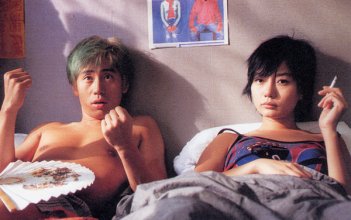 Strong subject matter and controversy also continue to characterize many South Korean films. Director Park Chan-wook, following the mainstream success of Joint Security Area, shocked a lot of viewers with the grim, harrowing violence of his next film Sympathy for Mr. Vengeance. Although one of the most accomplished artistic offerings of recent years, viewers will need a strong stomach to sit through to the end. Ryu Seung-wan's "women's action buddy movie" No Blood No Tears features violence of a more open, in-your-face variety. Many viewers again found this a little too strong to their taste, and despite its artistic strengths the film underachieved at the box-office.
Strong subject matter and controversy also continue to characterize many South Korean films. Director Park Chan-wook, following the mainstream success of Joint Security Area, shocked a lot of viewers with the grim, harrowing violence of his next film Sympathy for Mr. Vengeance. Although one of the most accomplished artistic offerings of recent years, viewers will need a strong stomach to sit through to the end. Ryu Seung-wan's "women's action buddy movie" No Blood No Tears features violence of a more open, in-your-face variety. Many viewers again found this a little too strong to their taste, and despite its artistic strengths the film underachieved at the box-office.
Debut filmmaker Park Jin-pyo, meanwhile, saw his film Too Young To Die banned by Korea's Media Ratings Board for its sexually explicit portrait of an elderly couple who meet and fall in love. Although the film eventually made it past the censors by digitally darkening some problematic scenes, the incident serves as a reminder of the confrontational stance taken by many Korean filmmakers towards mainstream social attitudes.
On the production side, a welcome trend was the large number of women making their directorial debuts. Prior to 2001 there were only a handful of women directing in the Korean industry, but the rapid expansion of film schools and the efforts of some powerful female producers have resulted in a new generation of women behind the camera. For a sense of perspective, in late 2001 Jeong Jae-eun became only the ninth woman in Korean film history to direct a commercial feature. In 2002, however, five women directors made their debut, and a further five new faces will present their first works in 2003. Apart from Lee Jeong-hyang, director of the above-mentioned The Way Home, another female director highlighted in this year's program is Moh Ji-eun with her romantic comedy A Perfect Match. A young graduate of the Korean Academy of Film Arts, Moh represents the newest generation of filmmakers in Korea.
The year 2002 was also notable for the large number of local films produced and released in theaters -- 77 in total. This was the highest level of production seen in a decade, and it meant not only increased choice for viewers, but also more competition at the box-office. One result of this was that revenues were much more evenly spread out than in 2001, when the top films controlled a larger share of the total box-office.
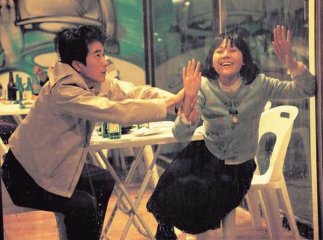 The first few weeks of 2003 dawned with news that many people in the industry found unpleasant. Korea's two biggest film companies, CJ Entertainment and Cinema Service, announced plans to merge their filmmaking operations. With essentially one less major studio in Korean cinema, and with smaller companies struggling to attract financing, many expect some shrinkage in the industry for the coming years, and a return to the past level of 50-60 films produced per year.
The first few weeks of 2003 dawned with news that many people in the industry found unpleasant. Korea's two biggest film companies, CJ Entertainment and Cinema Service, announced plans to merge their filmmaking operations. With essentially one less major studio in Korean cinema, and with smaller companies struggling to attract financing, many expect some shrinkage in the industry for the coming years, and a return to the past level of 50-60 films produced per year.
In terms of releases, the early part of 2003 featured a large number of melodramas, and one runaway hit at the box-office. Like My Sassy Girl in 2001, My Tutor Friend is a romantic comedy based on a story published on the internet. It has grossed more than any Korean film released in 2002, and it has provided the industry with a well-needed boost to start the new year.
The coming year has a large number of interesting projects lined up, and these films will have to perform well at the box-office if Korean cinema is to win back some of its lost investors. Two mega-projects loom on the horizon: an $11m Korean war epic (the most expensive Korean film of all time) shot by Kang Jae-gyu, the director of Shiri, and a $10m action film by Cinema Service founder Kang Woo-suk (Public Enemy) about a real incident in the 1970s in which trained South Korean spies revolted against their superiors and tried to assassinate dictator Park Chung-hee. Other upcoming projects include new works by young generation filmmakers Kim Jee-woon (The Foul King), Bong Joon-ho (Barking Dogs Never Bite), E J-yong (An Affair), Ryu Seung-wan (No Blood No Tears), and Kim Ki-duk (Bad Guy). Despite the increased challenges faced by Korean cinema in 2003, it appears that young filmmakers and a few more risks will make for a diverse and interesting year.